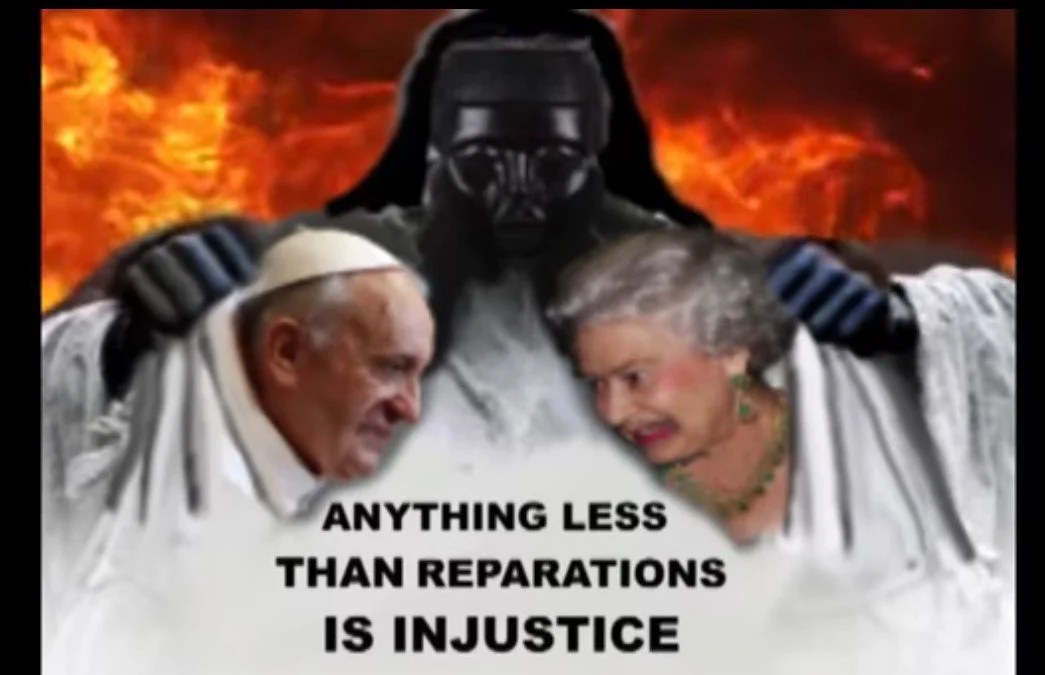“The reparations process is AU led . . . designed and created by the AU. . . .”
- Kyeretwie Osei, Head of Programmes at the AU ECOSOCC Secretariat in Lusaka, Zambia, May 27, 2025 special consultation with the “Diaspora” as part of its Civil Society Consultations on the 2025 AU Year of Reparations.
***********************************************************************************
The African Union has already declared 2021 to 2031 as the Decade of African Roots and the African Diaspora. Now, according to a Facebook post by the African Union’s Economic, Social and Cultural Council (ECOSOCC),
“2026 to 2036 is the African Union Decade of Reparations!
Earlier this year, the African Union declared 2025 as the #YearOfReparations. It was the first time that the continent, at the highest political level, placed reparations at the center of its agenda. Leaders, civil society, and the diaspora came together to affirm that reparations are not a symbolic demand but a matter of justice, dignity, and #development.
[SIPHIWE NOTE: SO CONTRARY TO MR. OSEI’S STATEMENT, REPARATIONS IS NOT AU LEAD, DESIGNED AND CREATED BY THE AU SINCE THE REPARATIONS MOVEMENT PREDATES THE OAU AND AU AND WAS CREATED AND IS ALWAYS LED BY THE PEOPLE, WHICH THE AU CLAIMS IS ITS CENTER OF ORIENTATION].
But one year was never going to be enough. For decades, the call for #reparations has journeyed through critical milestones: the Abuja Proclamation of 1993, the Durban Programme of Action in 2001, and the Accra Declaration and Proclamation of 2022 and 2023. These laid the intellectual and institutional groundwork for today’s continental commitment.
In July 2025, African leaders endorsed a ten-year commitment: 2026 to 2036 will be the African Union #DecadeOfReparations.
The Decade will build on the foundations laid so far and carry them forward in a sustained way. Over the next ten years, the focus will be on:
◦Mobilizing continental and global support for reparations and reparatory #justice
◦Working hand in hand with civil society and #diaspora communities to keep citizens at the heart of the process
◦Promoting education, research, and awareness of Africa’s history and contributions to the world
◦Developing policies and partnerships that respond to the lasting impacts of slavery, colonialism, and exploitation
This is not only an AU agenda, it is a people’s agenda. The African Union Decade of Reparations belongs to Africa’s citizens everywhere, on the continent and across the world! You in?!”
Addressing the 7th Mid-Year Coordination Meeting of the African Union in Malabo, Equatorial Guinea, H.E. John Dramani Mahama, President of Ghana and the African Union Champion for Reparations stated that notable progress has been achieved by the AU Commission and Member States in implementing the theme. He expressed particular satisfaction with the recent decision by the Executive Council to extend the focus on reparations for a decade, covering the period from 2026 to 2036. According to a press release from the Presidency of the Republic of Ghana, President Mahama stated.
“This undoubtedly affords us, as a Union, the opportunity to sustain the momentum for the realisation of this noble cause, as well as map out well-thought-out strategies to mobilise adequate resources to champion implementation of the theme domestically,”
The article further stated that, “Looking ahead, he announced that Ghana and Togo will co-sponsor a high-level event in the margins of the United Nations General Assembly (UNGA) in September 2025 ‘to further bolster efforts at achieving the justice and closure which has eluded us for centuries.’” Already, the 2nd Africa-CARICOM Summit is scheduled for September 6–7, 2025, in Addis Ababa, Ethiopia, focusing on climate justice, reparations, and other shared interests between Africa and the Caribbean. Another Facebook post from July 22nd by the AU ECOSOCC lauds, “African civil society and the diaspora will influence what’s on the agenda (from #reparations, #education, #trade, #culture, and the role of the #diaspora in continental affairs).” However, consistent with the disparity between what the AU says and what the AU does and the disappointment and discontent among Afrodescendants, on August 18, the following letter was distributed for endorsement complaining that “The recently released ACS II agenda raises serious concerns about the marginalisation of African CSOs, with our participation largely limited to side events and pavilion spaces (at a cost)”:

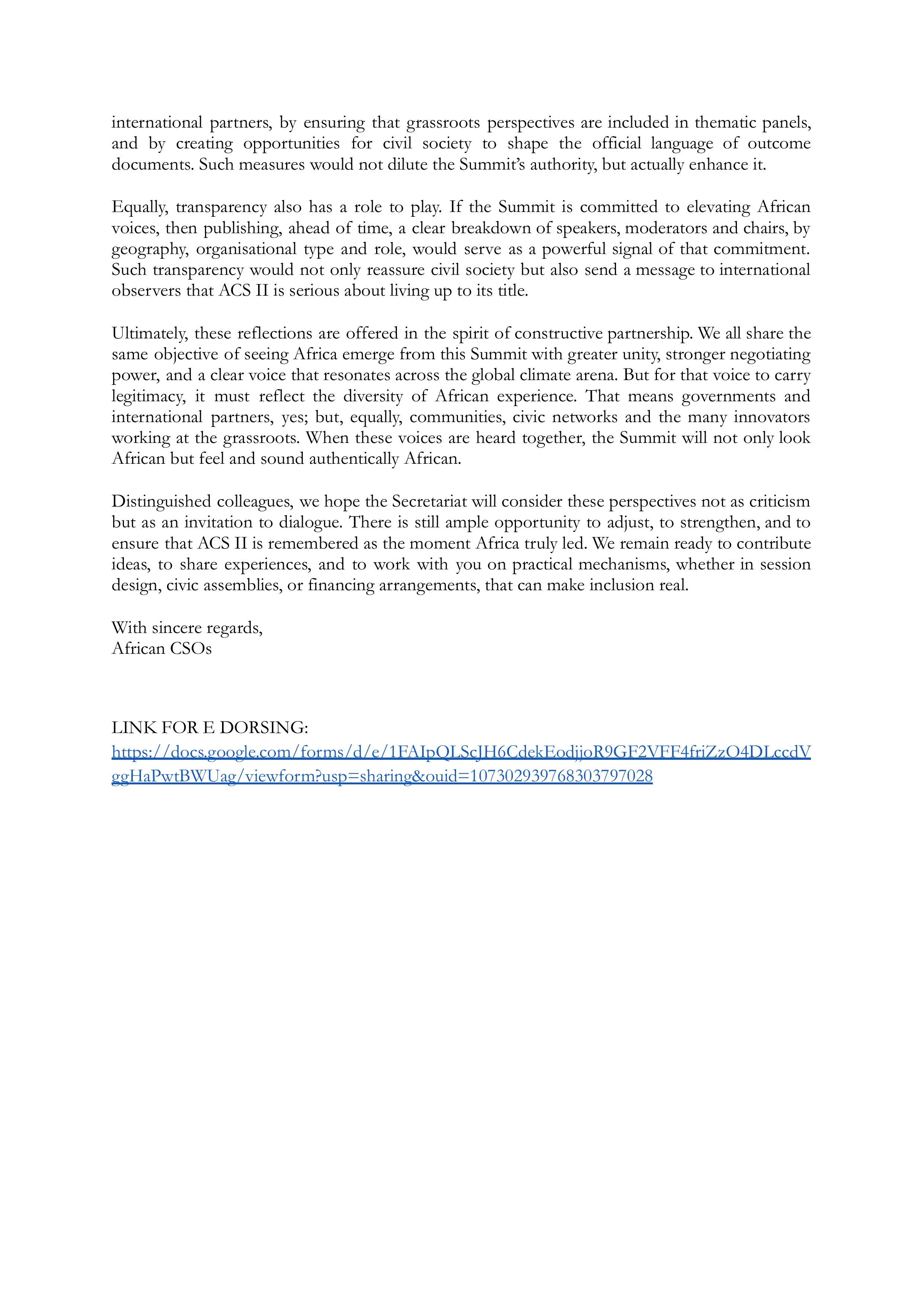
From Courts to COP: Harnessing Legal Momentum for African Climate Reparations
The concept of "climate reparations" for historical emissions and their impacts originated in the late 1980s and early 1990s, with Vanuatu's proposal for an insurance pool in 1991 and Bolivia's formal introduction of "climate debt" in the UN negotiations in 2009, reflecting a broader demand for climate justice rooted in the understanding of disproportionate harm to vulnerable nations from the wealth-building fossil fuel use of richer countries. This idea gained further momentum through the "loss and damage" pillar of UN climate talks, which began to formalize the idea of compensation for countries suffering the worst effects of climate change. This coincided with the HISTORY OF THE MODERN REPARATIONS MOVEMENT THAT STARTED IN THE UNITED STATES AND HAS SPREAD THROUGHOUT THE AFRICAN WORLD. The Provisional Government of the Republic of New Afrika (PGRNA) launched the process when it submitted a reparations program called the Anti Depression Program to the National Black Political Convention in Gary, IN in 1972 which led to the establishment, ten years later (1982) of the New York based National Committee to Build the World Tribunal on Black Reparations which then established the rules of the procedure for a convention whose Steering Committee voted to call the organization being built the African National Reparations Organization (ANRO). By November 15 and 16, 1986, ANRO held the Fifth Session of the World Tribunal on Reparations for Black People in the U.S. Serving on the international panel of judges at the Fifth Session were, inter alia, Chaminuka Mnombatha of the Pan Africanist Congress of Azania-UN Mission; Ousainou Mbenga from Gambia; and Serge Mukendi from the Workers and Peasants Party-Congo. Following that session, the Anti Depression Program adopted at the National Black Political Assembly Convention in 1972 became the basis of the 𝐑𝐞𝐩𝐚𝐫𝐚𝐭𝐢𝐨𝐧𝐬: 𝐀 𝐏𝐫𝐨𝐩𝐨𝐬𝐞𝐝 𝐀𝐜𝐭 𝐒𝐮𝐛𝐦𝐢𝐭𝐭𝐞𝐝 𝐭𝐨 𝐒𝐨𝐦𝐞 𝐌𝐞𝐦𝐛𝐞𝐫𝐬 𝐨𝐟 𝐂𝐨𝐧𝐠𝐫𝐞𝐬𝐬 𝐢𝐧 𝐒𝐞𝐩𝐭𝐞𝐦𝐛𝐞𝐫 𝟏𝟗𝟖𝟕 prepared by President of the PGRNA Imari Obadele. By November of 1991, ANRO hosted the 10th Session of the International Tribunal on Reparations for African People in the U.S. (notice the name change) in Philadelphia. Then, on the suggestion of US Congressman Ron Dellums (who had received the Reparations Act submitted by PRGRNA President Imari Obadele) and Jamaican lawyer and diplomat Dudley S. Thompson, the wealthy Nigerian businessman, Chief Bashorun M. K. O. Abiola, who was later elected President of Nigeria, although never permitted to take office, suggested establishing a Group of Eminent Persons (GEP) to pursue reparations for slavery and (perhaps) other wrongs perpetrated on Africa. On 28 June 1992, the Organization of African Unity (OAU) swore in a twelve-member GEP, with Chief Abiola as its Chairman, whose mandate was to pursue the goal of reparations to Africa. This is what led to the First Pan-African Conference on Reparations that was held in Abuja, Nigeria, April 27-29, 1993, sponsored by the (GEP) and the Commission for Reparations of the Organization of African Unity. This culminated with the World Conference against Racism, Racial Discrimination, Xenophobia and Related Intolerance, and its resolutions 56/266 of 27 March 2002, 57/195 of 18 December 2002, 58/160 of 22 December 2003, 59/177 of 20 December 2004 and 60/144 of 16 December 2005, which guided the comprehensive follow-up to the World Conference and the effective implementation of the Durban Declaration and Programme of Action . Concomitant to this period, the Honorable Silas Muhammad pursued the issue through 52 written and oral submissions at the United Nations.
Yet another Facebook post from AU ECOSOCC on August 25th stated,
Recap: From Courts to COP – Harnessing Legal Momentum for African Climate Reparations
Earlier today, the African Union ECOSOCC, African Futures Lab and Biophilic Conversations convened a webinar on how recent international court rulings can strengthen Africa’s pursuit of climate reparations.
[SIPHIWE NOTE: HOW COME THERE’S NO INTERNATIONAL COURT RULING ON THE AFRODESCENDANTS’ RIGHT TO RETRUN TO THEIR ANCESTRAL HOMELANDS IN AFRICA, THE FIRST REPARATIONS CLAIM THAT PRECEDES CLIMATE JUSTICE CLAIMS BY MORE THAN 100 YEARS!!!???]
Mr. William Carew (Head of Secretariat, ECOSOCC) reminded participants that the advisory opinion of the International Court of Justice is historic in that, for the first time, the world’s highest court has clarified that states are legally obliged to cut emissions, protect people from climate harms, and repair damage already caused. For Africa, the least responsible for global emissions yet the most impacted, this ruling is a vindication. He stated: “Climate justice means climate reparations, and justice delayed can no longer be justice denied.”
[SIPHIWE NOTE: HOW COME THE WORLD’S HIGHEST COURT HASN’T YET CLARIFIED THAT SIGNATORIES TO THE GENEVA CONVENTION ARE LEGALLY OBLIGED TO FINANCE AND FACILITATE THE AFRODESCENDANTS’ VOLUNTARY RETURN TO THEIR ANCESTRAL HOMELANDS IN AFRICA WHICH CAN BE DETERMINED THROUGH DNA TESTING????]
Mr. Kyeretwie Osei (Head of Programmes, ECOSOCC) underlined that reparations must be understood in all dimensions of loss, damage, and harm, and how repair, restitution, and restoration can allow the continent to move forward. He explained that ECOSOCC is working through its Climate Change Working Group to connect civil society voices across Africa and the diaspora ahead of #COP30 in Brazil and the African Climate Summit in Addis Ababa.
[SIPHIWE NOTE: WEHRE IS ECOSOCC’S RIGHT OF RETURN WORKING GROUP GIVEN THE HISTORY OF THE CALL FOR AFRICAN DIASPORA CITIZENSHIP IN THE AU’S DIASPORA INITIATIVE????]
Ms. Samira Ben Ali (World’s Youth for Climate Justice) emphasized that both the International Court of Justice and the Inter-American Court of Human Rights advisory opinions affirm binding obligations: states must prevent harm, reduce emissions, regulate companies, and remedy climate damage. She said these rulings provide African advocates with a shared legal language and legitimacy to demand accountability, stressing that “#ClimateJustice is not charity, it is a legal duty.”
Ms. Junecynthia Okelo (Pan African Lawyers Union) highlighted the stakes of the African Court petition, the first of its kind. It asks the Court to clarify African states’ duties under the African Charter and other instruments, including protecting vulnerable groups, safeguarding the right to a healthy environment, and ensuring intergenerational and ancestral rights. She gave examples of inadequate redress, including the British Army–caused forest fire in #Kenya and devastating floods in #Nigeria and #SouthSudan, showing why Africa needs its own legal precedent on climate obligations, adaptation, and #reparations.
[SIPHIWE NOTE: WHAT ARE THE AFRICAN STATES’ DUTIES UNDER THE AFRICAN CHARTER AND OTHER INSTRUMENTS TO PROVIDE CITIZENSHIP, PASSPORTS AND RESETTLEMENT PROGRAMS FOR AFRODESCENDANTS WHICH WAS RECENTLY RAISED AT THE AFRICAN COMMISSION ON HUMAN AND PEOPLES’ RIGHTS????]
Ms. Mary Morrison (Biophilic Conversations) reflected on her own experience: “One of my previous works was when I was protecting a fig tree in Westlands and they were building the expressway. Yes, I use it, but at that point I was protesting it not being made.” She stressed that petitions should not feel distant from communities, and civil society must translate legal language into everyday realities, connect colonization’s legacies to today’s vulnerabilities, and mobilize coalitions to support the African Court petition.
Mr. Lucien Limacher (Natural Justice) described these rulings as having “legified” the climate justice struggle: “We now do have tangible outcomes where judges have sat down, reviewed all the information and seen exactly what is going to be the impact, what are the legal implications, what are the legal principles we need to be looking at.” He argued they provide African states with stronger leverage in negotiations at COP30, open doors for strategic litigation at national level, and create opportunities to hold both governments and corporations accountable for climate harm.
[SIPHIWE: NOTE TO THE FEDERAL REDRESS ADVANCEMENT NETWORK (FRAN) AHEAD OF ITS SEPTEMBER 11TH INAUGURAL MEETING]
Ms. Henrietta Ekefre (Independent Expert on Transformative Justice, Gender and Reparations) drew the link between climate justice and reparatory justice, calling them “two sides of the same coin.” Advisory opinions strengthen Africa’s hand to demand climate finance not as goodwill but as an obligation. Reparations, she said, provide a framework for guarantees of non-repetition, compensation, and community-centered decision-making. She called for climate #justice to be fully integrated into the African Union’s forthcoming Common Position on Reparations.
[SIPHIWE NOTE: RIGHT OF RETURN AND CITIZEN MUST BE BOTH THE CENTER AND 1ST PRIORITY OF THE AFRICAN UNION’S FORTHCOMING COMMON POSITION ON REPARATIONS]
Ms. Sarra Gharbi (ECOSOCC Cluster Chairperson, Economy and Agriculture) commended the timeliness of this webinar and looks forward to seeing the key outcomes and how they inform Climate Week, the African Climate Summit 2, and COP30.
We also had an engaging and lively Q&A with legal minds, climate justice civil society organizations, and other civil society groups.
THE FOLLY OF THE AU-LED REPARATIONS ELITE CAPTURE AND ITS REDEFINITION OF REPARATIONS
Reparations are in the process of being redefined to suit the purposes of the ruling classes of all nations and their governments. As an example, in 1900, Bishop Henry McNeil Turner said,
“We remained in slavery two hundred and fifty years, and have been free the best end of fifty more years. In other words we have been dominated over by the buckra, or white race, for about three hundred years. We have worked, enriched the country and helped give it a standing among the powers of the earth, and when we are denied our civil and political rights, (many) ridicule the idea of asking for a hundred million of dollars TO GO HOME, for Africa is our home and is the one place that offers us manhood and freedom, though we are the subjects of nations that have claimed a part of Africa by conquest. A hundred million dollars can be obtained if we, as a race, would ask for it. The way we figure it out, this country owes us forty billions of dollars, and we are afraid to ask for a hundred million. Congress, by its legislation, throws away over a hundred million annually.”
A further example is that in 1919 and the 1920s both Marcus Garvey and W.E.B. DuBois petitioned the League of Nations for the former German colonies to be given over for the purpose of creating a new African State and homeland controlled by African people where African people in the Diaspora could resettle. This form of reparations was denied, and instead, the “Protectorates” and “Mandates” system was implemented so that the colonial powers retained control of those territories. Finally, as another example, in the 1980s and 1990s, the focus of reparations shifted to “debt relief” for African countries. Thus, while the 1993 Abuja proclamation “Exhorts all African states to grant entrance as of right to all persons of African descent and right to obtain residence in those African states, if there is no disqualifying element on the African claiming the ‘right to return’ to his ancestral home, Africa,” it “Further urges the OAU to call for full monetary payment of repayments through capital transfer and debt cancellation. Urges those countries which were enriched by slavery and the slave trade to give total relief from Foreign Debt, and allow the debtor countries of the Diaspora to become free for self-development and from immediate and direct economic domination. ” This was a shift from the earlier focus of the right to return and redress for unpaid slave labor which still has not been granted. Debt relief, rather than monetary payments, became the focus of global campaigns, was never granted and has now taken a back seat. Today, certain interests have positioned “racial healing” and “climate justice” as the new focus of reparations as these are “acceptable” issues for the ruling elites. To be sure, consider that,
"After all this time, has the African Union made REPATRIATION and CITIZIZENSHISP the priority during its AU THEME OF THE YEAR? Have formal agreement with African States and the AU pertaining to REPATRIATION and CITIZENSHIP been concluded? Have they even been brought to the table? Are the Afro Descendants in the AU 6th Region equal partners in determining AU principles, policies, and programs? Incredibly, Kyeretwie Osei, Head of Programmes at the AU ECOSOCC Secretariat in Lusaka, Zambia gave an answer that the AU does not intend such things. Mr. Osei clearly stated that the AU is seeking “different interpretations of reparations . . . .” This can be seen, for example, in the numerous emphasis on “climate justice” with little to no mention of Repatriation and Citizenship. In fact, climate justice is fast becoming the leading talking point of the AU along with “debt relief”, and was butressed by the selection of European Climate Pact Ambassador in Belgium Ms. Fadeke Ayoola to lead off the [special consultation with the “Diaspora” as part of its Civil Society Consultations on the 2025 AU Year of Reparations] presentation which focused on the current state of the Pan African financial architecture and and Lydia Chibambo who works with the Zambia Climate Change Network, to close the Consultation. Mr. Osei then made the audacious and patronizing claim that the “reparations process is AU led . . . designed and created by the AU. . . .” SEE: AU ECOSOCC DIASPORA CONSULTATIONS CONTINUE TO DISAPPOINT AFRODESCENDANTS IN THE AU 6TH REGION
Consider further the 27 February 2025 article by Tadesse Simie Metekia, Senior Researcher, Rule of Law, Institute for Security Studies (ISS) in Addis Ababa entitled: AU ‘Year of Reparations’ should look to the future and the past in which he says,
“Others contend that development aid, debt relief and foreign investment function as reparations, negating the need for further redress. . . . One way to address these challenges is by expanding the AU theme’s focus, which currently emphasises justice and healing for Africans and Afro-descendants. During implementation, the AU could approach reparations as a forward-looking global agenda aimed at repairing both victims and perpetrators. . . . Former colonial powers that profited from Africa’s suffering carry unresolved moral wounds. Societies built on slavery and colonial exploitation continue to grapple with racism, economic inequality and historical amnesia. Reparative justice offers these nations an opportunity to heal, confront their pasts, and rebuild relationships with African and Afro-descendants.”
Many within the Reparations Movement have justified this shift by saying that reparations is not just about the past, it is about the Africa we want now and in the future, while others don’t even consider Africa at all and simply want a more comfortable life in the land of their ancestors' captivity. Under this reasoning, many are no longer framing reparations as the just compensation for enslavement but rather through the lens of “developmentalism” - a framework that is in “alignment” with governments’ objectives - Barbados is a good example - and is more palatable to European consciousness. This represents a crafty capture of the reparations narrative and objective. Why does the objective and narrative keep shifting without any reparations being received? Why move on to something else when the first claims have not yet been remedied?
The ruling elites use philanthropy to produce controlled opposition, making calculated decisions and sacrifices pawns in order to save the king and queen. . . . .
My respnse to those within the movement who are attempting to redefine reparations is to make the counterpoint that when Africa’s Reparation claim is properly framed as War Reparations, or compensation payments made after a war by one side to the other that are intended to cover damage or injury inflicted during a war, then we need not subject ourselves to manipulation by the successor regimes of the enslaving nations who wish to capture the reparations movement, redefine it in the form as debt restructuring, development aid and climate justice which suits their interests. Such a capitulation would shift the burden of paying for those damages to the victims of the Dum Diversas War. Our reparations are not to be used to cover other problems that the international community is responsible for. We do not need to acquiesce to such a misstatement of reparations. If reparations is intended as compensation after the war with an aim to repair the dignity of the victims, then reframing reparations in a way that considers, even elevates, the interests and sensitivities of the enslavers continues the very indignity of the victims! The Ashkenazic victims of genocide were not forced to reframe their reparations in order to heal the Nazi perpetrators. Neither were the Japanese victims of America required to take into consideration the development plans and other responsibilities of the United States government. It is an offense to suggest, once again, that the burden of healing others falls on African people at the expense of their own direct interests!
If Ghana President Mahama believes notable progress has been achieved by the AU Commission and Member States in implementing the AU theme of the Year 2025, let us consider that the AU Accra Reparations Summit Declaration from November 2023 established both a Legal Reference Group on Reparations and a Committee of Experts on Reparations. Yet, to date, no one has been named to either. Yet there is an AU ECOSOCC Working Group on Climate Justice and several workshops on the subject. To many, including this author, this is evidence of AU lip service and a kind of betrayal. If the AU Elite Capture of Reparations wishes to avoid being mere folly, it must champion this
LONG -TERM VISION FOR BLACK REPARATIONS
“A STRONG BLACK HOME BASE.
In every land, the welfare of the individual is directly dependent on the welfare of the state and its ability to maintain a prosperous economy. Take for instance the welfare of the average European tourist. He is able to be a tourist because he comes from a country that has a sufficiently prosperous economy that allows him to have enough surplus income to go on tour. He has a HOME BASE that is strong economically. It is not an accident that within the tourist economy, most tourists are white and the servants are black. While the white tourist has a strong economic home base that enables him to have surplus income, the black servant has A BEGGING AND DEPENDENT HOME BASE that barely allows him survival wages. If on the continent of Africa or in the Caribbean the safety of a white tourist is threatened, he has a strong government back at home that will come to his assistance with guns blazing if necessary. On the other hand look at the predicament of Blacks in the USA, the UK, or any part of U-rope where they may be now exiled. They are subject to the worse treatment where they can be lynched and crucified on the cross of racism and there is no strong Black government that can forcefully intervene on their behalf.
A realistic look at the Black diaspora shows that wherever they are presently domiciled, their economic survival is totally dependent on the economic health of the dominant white U-ropean nations. In places like the Caribbean where they depend on tourism, Black survival depends on the white man having enough money to go on tours. If the white man tightens his belt, many black belts will have to be further tightened throughout the islands. In places like the U-ropean strongholds of the USA and the UK, if the white man is losing money and decides to close his factory, out goes Black survival through the window of job cuts.
Throughout the history of the Caribbean, national survival has always been very dependent on exporting labor to the white man's home in the US, the UK, and Canada. Economic survival has long been structured along the lines of the plantation where the Black villagers had to leave their homes and trek to their workplace in the Big House to scrub floors, wash clothes, clean yards and do the dirty jobs. There is total dependency on the white man's economic health, and that is reflective of a situation where a people have no prosperous home base of their own. If Africa was a prosperous home base, Blacks from all over the world would be migrating to Africa in search of work instead of trekking to the U-ropean capitals of the world where they are subject to the scourge of racial discrimination which can escalate at any time.
In the white capitals of power which are so racially charged from centuries of white racism, it is quite unlikely, and even ridiculous to imagine any form of meaningful Reparations to the minority Black populations, for the simple reason that it would create what would appear to the majority white population as the creation of a privileged minority class. If in these countries, Reparations were paid on an individual basis, the majority white population can be expected to lash out angrily at the DEFENSELESS Black minority who would appear to be gaining an unfair economic advantage. . . .If the issue of REPARATIONS is broken down into insular pockets of interest where the Afro-American has one agenda and the Caribbean people have another, and the Africans on the homeland have another, one should expect Willie Lynch to exploit the situation.
A good look at the continent of Africa today demonstrates how eagerly Willie Lynch exploits differences. If Willie Lynch has his way again, REPARATIONS will be granted with a great show of outward magnanimity which will prove to be the biggest PR stunt of the ages. An end would be put once and for all on the complaints that U-rope did this and U-rope did that, but with insularity and mental slavery still rampant, Black people would find themselves in the same old hole as before, TOTALLY DEPENDENT ON THE WHITE WORLD ORDER.
MYOPIC VISIONS will be exploited and INSULARITY will be coopted in the same way that present day MIS-EDUCATION is being enlisted in the age-old business of COLLABORATIVE GENOCIDE.
What is at stake is the future of Black peoples worldwide, and barring a serious intervention of BLACK CONSCIOUSNESS, that future is as dim as it could ever have been. What kind of future will the Black visionaries of this time hold out for the salvation of the race? All the TRUE VISIONARIES have already pointed to BLACK NATIONALISM as the only means towards ending the scourge of being Black and totally dependent in a white man's world, and it should never be forgotten that racial harmony in the white man's strongholds has always depended on Black obeisance and Black subservience. The only hope for the Black race lies in its ability to get its act together on the continent of Africa. Little island satellites and little minorities are already being jettisoned by the onward sweep of history. . . .Demystifying The Issue Of Repatriation
REPARATIONS and REPATRIATION for the descendants of slavery and colonialism are two inseparable twins that hold between them the cornerstones for the formation of a new international morality. If one is stripped from the other, JUSTICE fails, and the evil slave-master triumphs once again. Without Reparations, repatriation is more likely to become the repatriation of the privileged.
One should never forget that once upon a time there was an argument amongst the slave-masters about what should be done with the slaves after Emancipation. Some said "Let us see to it that they will never be able to really OWN anything, because we cannot afford to let them become independent. Keep them so busy working that they will never have much time to think, and saddle them with debt so that they will never progress. They can stay here, but they will always be kept busy in the pursuit of powerless-ness." Some said "But we need to keep this place ALL WHITE, so let us bring in more Caucasians and pack these niggers on a boat and send them back to Africa bare-back and empty-handed the same way how they came." The descendants of slavery therefore find themselves today in a situation where the man that is tossing the coin is doing so on one condition "HEADS, I WIN, TAILS, YOU LOSE." Whichever way the coin falls, it represents the triumph of injustice.
There is no escaping it. Historical consciousness is the faculty that causes one's eyes to truly see. Without it, one is virtually blind. A knowledge that has no proper grounding in the trails and trials of the African experience under slavery and colonialism, is therefore like a branch disconnected from its roots. Such knowledge has to go beyond the mere assimilation of facts learned in college and university. It has to be empowered by THE PASSION FOR JUSTICE that naturally flows from an at-oneness with those that have long borne the white cross. From this level of spiritual attunement, one's eyes will then behold the truth that REPATRIATION IS MERELY A COMPONENT OF REPARATIONS. To teach otherwise would surely grant the ole slave-master much pleasure and satisfaction.
It should also be clearly understood that the same ole slave-master who raped Africa and enslaved her children is very much interested in maintaining his grip on stolen property. For this reason the people in Africa have to be kept smelling Hell, and to see to it that they never escape, certain educated Negroes have been put in charge to keep the profits from the plantation flowing smoothly. This is the neo-colonial situation that presently exists in Africa and the Caribbean where there is a Black majority totally dominated and controlled by white invisible minorities. When one is aware of this situation it becomes clear why, despite the appearance of outwardly Black governments, the movement of people has always been tightly curbed and restricted just as in the old days on Hell plantation. . . . This brings us to the real truth that THE EDUCATED NEGRO IS THE MAIN BARRIER TO BLACK PROGRESS. He has been placed in a comfortable position by invisible puppeteers who are very skilled in the art of pulling strings. Whether he does it consciously or unconsciously, the educated Negro is generally a facilitator in the centuries -old project of Black exploitation. His greatest concern is to keep his personal safe place secure, and by his actions, he displays a greater kinship with the white exploiter.
When REPARATIONS and REPATRIATION are examined under the clear microscope of consciousness, one will see that their full attainment will only come after serious revolutionary changes in the present status quo. Moses has to take the message to the powers that be, and the foundations have to be shaken so severely that little puppet heads will roll. This is not to say that everyone should sit patiently and wait for the earthquake. A concerted effort should still be made meanwhile to attain some level of poor people's empowerment, for as Marcus Garvey once said, a people without real power will always be a people without respect. This is why after so many years in the Caribbean where the Rasta people are the poorest, they are still the least respected and the most oppressed.
This brings us to the most current issue that the conscious people should be addressing ...the issue of self-empowerment or poor-people's empowerment. When a people have been robbed of their land and its natural resources, the only other resource that is available to them is THEIR NATURAL CREATIVE TALENT. If these talents have not been fully developed and mobilized, such people will forever continue to spend their lives laboring to make the slave-master rich. Even those few talents that they have discovered will continue to be exploited by others.
In the absence of REPARATIONS, this development and mobilization of the people's creative talent-base would have to precede Repatriation. Where this has not been done, REPATRIATION will be nothing more than the movement of a people who have been able to serve the slave-master long enough to BUY their freedom of movement. And it ought to be considered that the slave-master has set up his system in such a way, that by the time you bow and serve him long enough to buy your freedom, your mind is no longer much different to his. If such people are repatriated to Africa, they will quite easily keep silent and non-involved in the struggle for justice there. They will betray the down-trodden, and by their non-involvement, make common cause with Africa's neo-colonial stooges. By attaining the presently required financial resources, such repatriates would have achieved something that is almost impossible for the average African to achieve. It is not good to be viewed as an island of prosperity in a sea of poverty. In places like Nigeria, such Black achievers usually live behind large iron gates with guards at the door, and high walls with barbed wire strung on top.
True Repatriation must therefore be accompanied by a total revolutionary change in the African social, political, and economic system that allows prosperity to be more broad-based. Otherwise, repatriation will be just a matter of RELOCATING HELL. Apocalyptic doctrines should never be allowed to put common sense to sleep. Those that step in the right should never be guided by fear. Each one must ask themselves, "What is my particular role in this battle to lift Black humanity from the dust of disadvantage, scorn, and perpetual servitude? What are my unique talents, and how can they best be utilized to accomplish these goals in this generation?" When these questions are properly answered, everyone will know what his or her divinely-appointed station is in this final battle to restore the right. Some may be called sooner than others to make the journey now to help spread the light of consciousness, with the full knowledge that they will be opposed by Black oppressors. Others may have to fight in the lands of the white oppressors to give more power to the truth by galvanizing a movement similar to the days of the civil-rights movement.
Whether Hell is in the east or in the west, it is still Hell, so the battle will remain the same in either place. When this consciousness comes home fully, one will not be motivated in one's efforts to repatriate by the feeling that one is making an escape for a safe place. On the contrary, one will be relocating with the full knowledge that one is moving into place to take over the baton of struggle from the likes of Haile Selassie, Muguabe, Mbeki, Mandela, Steve Biko and all those who fought to bring Africa this far from the clutches of colonialism. The struggle for African liberation must now be taken to its ultimate conclusion, and that is the task that has been prepared for this generation.”
CITIZENSHIP IS THE HEART OF THE PROCESS & THE 1ST PRIORITY IS TO TAKE THE VATICAN TO THE ICJ AND ICC
At the Accra Reparations Summitt II, I said,
“AN INVASION LAUNCHED BY THE MILITARY ORDER OF JESUS CHRIST HEADQUARTERED IN PORTUGUAL THAT LED TO A DECLARED WAR AUTHORIZED BY THE DUM DIVERSAS APOSTOLIC EDICT ISSUED BY POPE NICHOLAS V ON JUNE 18, 1452, TO SECURE MONOPOLY CORPORATE COMMERCIAL ADVANTAGE PERMITTED BY CHRISTIAN SPIRITUAL SUPREMACY USING VIOLENCE AND TERRORISM AS THE PRINCIPAL MANUFACTURING PROCESS TRANSFORMING THE NATURAL RAW RESOURCE OF GENETIC MATERIAL OF HUMAN BEINGS TRAFFICKED TO PLANTATION FACTORIES INTO SUBSERVIENT CHATTLE PRODUCTS TRADEMARKED AS NEGRO, BLACK AND SLAVE. . . . The Dum Diversas Apostolic Edict was followed up with monopoly contracts known as “Asientos'' that were variously granted by the Catholic Church
to private merchants from 1518 to 1595,
to Portugal from 1595 to 1640,
to the Genoese (Italy) from 1662 to 1671,
to the Dutch and Portuguese from 1671 to 1701,
to France 1701-1713,
to the British (which included her colonies in America) from 1713 to 1750, and
to the Spanish 1765 to 1779;
The United States officially entered the Dum Diversas War when New Hampshire became the ninth of thirteen British colonies to ratify the United States Constitution. Which prohibited Congress from outlawing the trafficking of African prisoners of war for twenty years. A “fugitive slave clause” required the return of runaway prisoners to their enslaving owners. The Asiento contracts constituted the principal legal means of enslaving people of African descent.”
The Military Order of Jesus the Christ headquartered in Portugal, on orders from Pope Nicholas the V (Dum Diversas Apostolic Edict in 1452) initiated the invasion, capture and enslavement of the people in the land of “Guine”. From this knowledge comes THE NEW NARRATIVE FOR THE AFRICAN UNION'S THEMED YEAR "REPARATIONS FOR AFRICANS AND PEOPLE OF AFRICAN DESCENT THROUGH REPARATIONS". Without a doubt, the Catholic Church is responsible for over 570 years of warfare against African people and are the principle target of a comprehensive reparations claim that centers on the forced displacement of African prisoners of war and the justice necessity of the return of their progeny which requires citizenship in the current AU member states. This has always been the goal of Pan Africanism and formalized at the 6th Pan African Conference in Tanzania. Consider that Gabriel Asuquo writes in Pan-Africanism and African Citizenship: The Way Forward,
“This paper critically analyses Pan-Africanism as an ideology for the liberation of Africa, with a view to assessing the possibilities of a common African citizenship. This paper argues the claim that the focus of Pan-Africanism should shift from activism, agitations, and struggles to a univocal platform that will define authentic African identities by crystallizing a common nationality for Africans on the continent and those in the diaspora. This claim is known to be rooted in the age- long African values of brotherhood, complementarity, and family hood ( Ujamaa) that make Africans see other Africans as brothers who share the same humanity. This is different from the Africans of today who have assimilated western values of individualism, which are divisive and exclusive in nature, which in reality is a negation of authentic African personhood and society. This has given rise to ethnic agitations, xenophobic attacks, populism, and hatred against "outsiders". Therefore, it is in the forging of common identities for Africans that African citizenship can be made possible. It should be the way forward for Pan-Africanism in the 21 st century.”
I have emphasized countless times, that in Pan-Africanism and Nationality Rights For the Diaspora: A Contemporary Perspective, in Pan-Africanism, African Nationalism: Strengthening the Unity of Africa and its Diaspora edited by B.F. Banke & K. Mchombu, A. Bernard puts it this way:
“The Pan-Africanist Law of Return: Quintessential Reparations
At a very basic level, if reparation is to repair the wrongs committed against African peoples through slavery and its apprentices, colonization and imperialism, the first wrong committed was taking millions of peoples from their homeland. Those taken from Africa lost, among other things, their citizenship and this is the first thing that needs to be given back. It is morally and philosophically the first step in the journey of a thousand miles that needs to be undertaken if Africa and African peoples are to move forward in a forceful, positive and determined manner in the 21st Century.
Concomitant with this position therefore is that the law of return can only be made possible by African governments/states, not the West. It is to be stated clearly nonetheless, that this is a right, not a concession or special privilege. Diasporan repatriates should not have to prove which part of Africa they are from. The loss of this specific identity is a part of the harm done by slavery, and cannot be used by African governments to reject Diasporans. Any African government which challenges the right to return to Africa for proof of specific identity is in breach of their own claim for compensation for slavery.”
Since few AU member states are willing to provide citizenship for Afrodescendants without regard to specific proof of African identity, it then requires that Afrodescendants and their true allies bring the issue to the International Court of Justice (ICJ) just like the climate justice advocates in order to establih once and for all the legal foundation for Afrodescendants’ Right of Return, especially under the Geneva Convention. With an ICJ-ruling “legifying” this reparations claim, we can move forward with a Common African Reparations Claim against the Vatican.
Why the Vatican?
As the THE NEW NARRATIVE FOR THE AFRICAN UNION'S THEMED YEAR "REPARATIONS FOR AFRICANS AND PEOPLE OF AFRICAN DESCENT THROUGH REPARATIONS" clearly shows, it was the Catholic Churche’s illegal Asiento monoply total war contracts that initiated, organized and effected the trans-Atlantic forced migration of African prisoners of war from their ancestral homelands to the Americas where they were ENSLAVED and suffered ETHNOCIDE, illegaly, under the pretense of eccliastic and emerging commerical law.
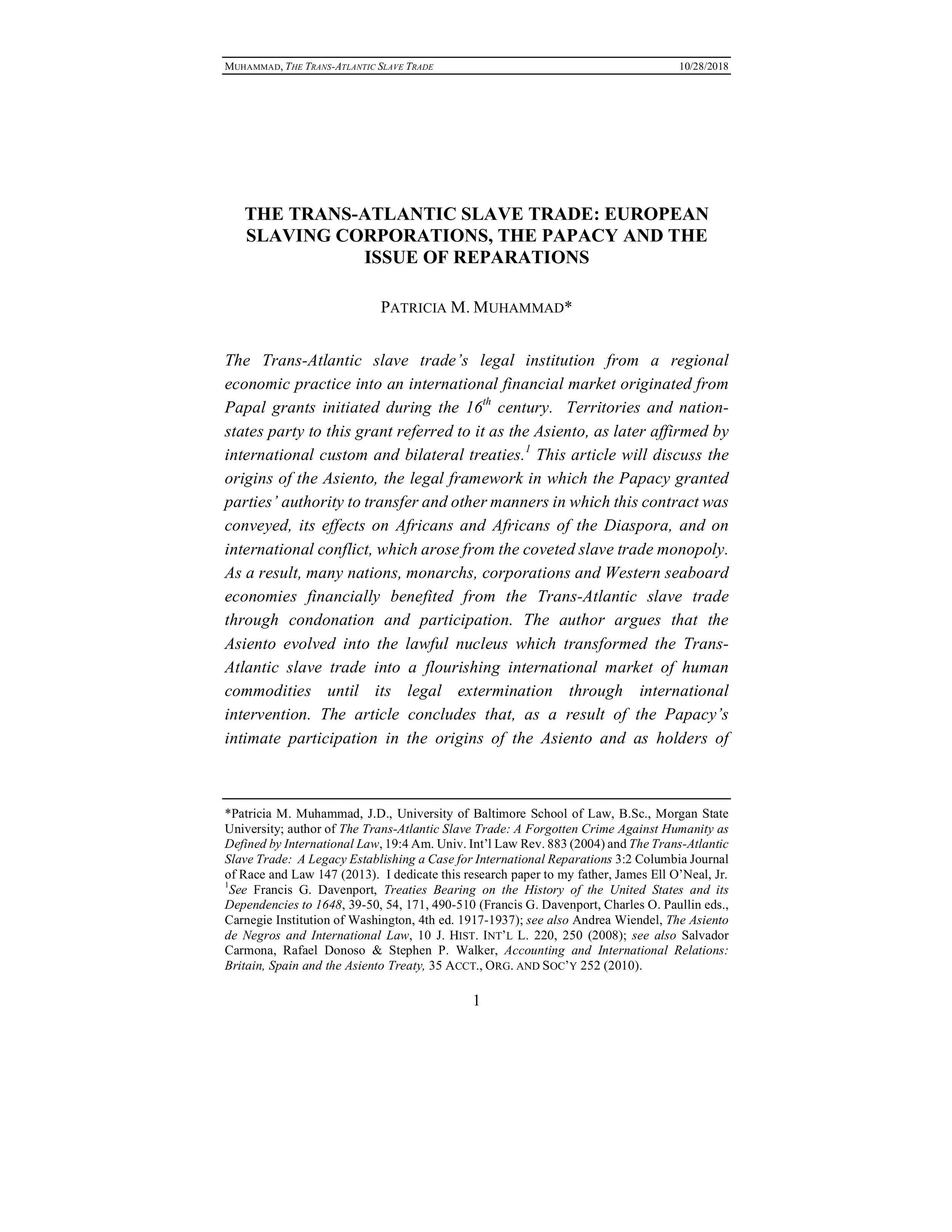

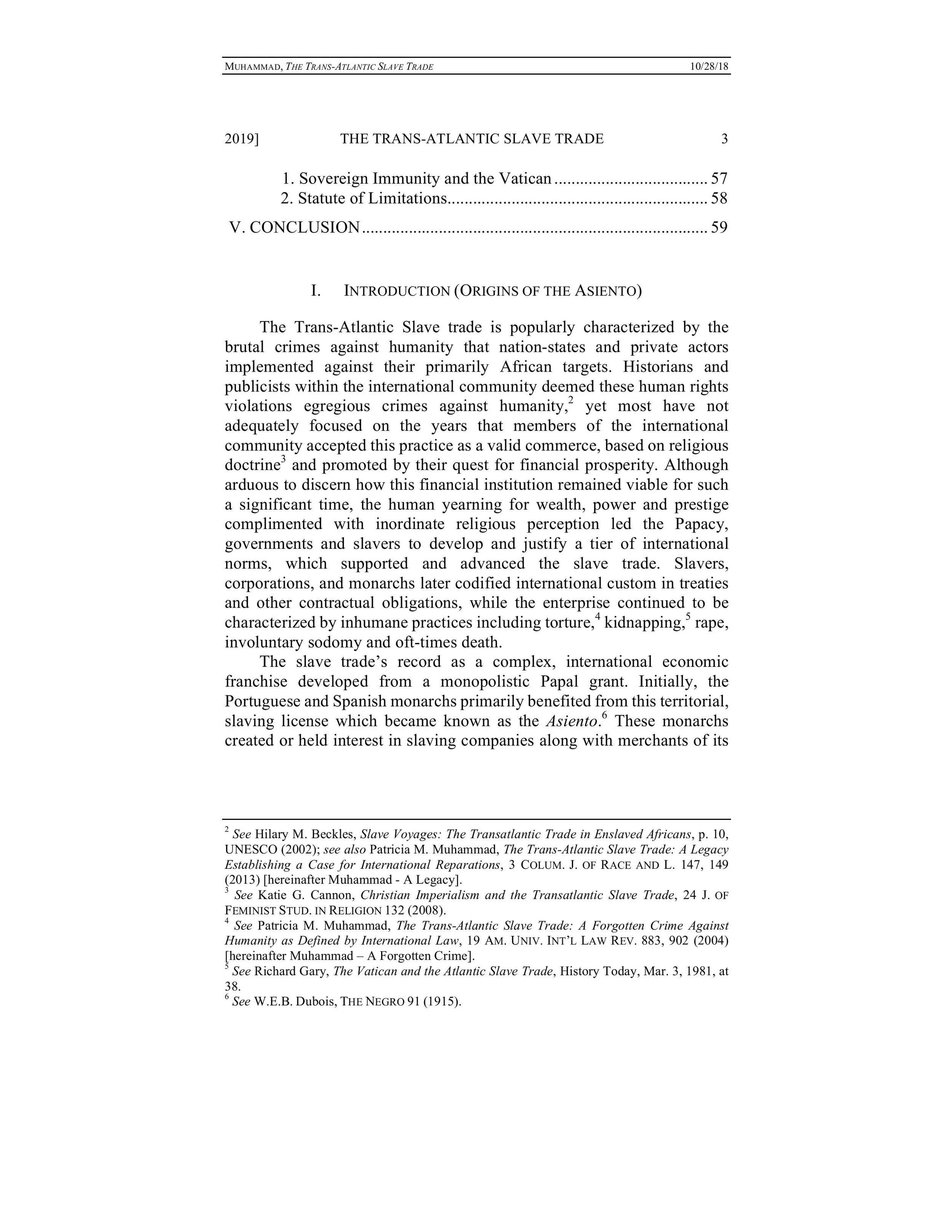
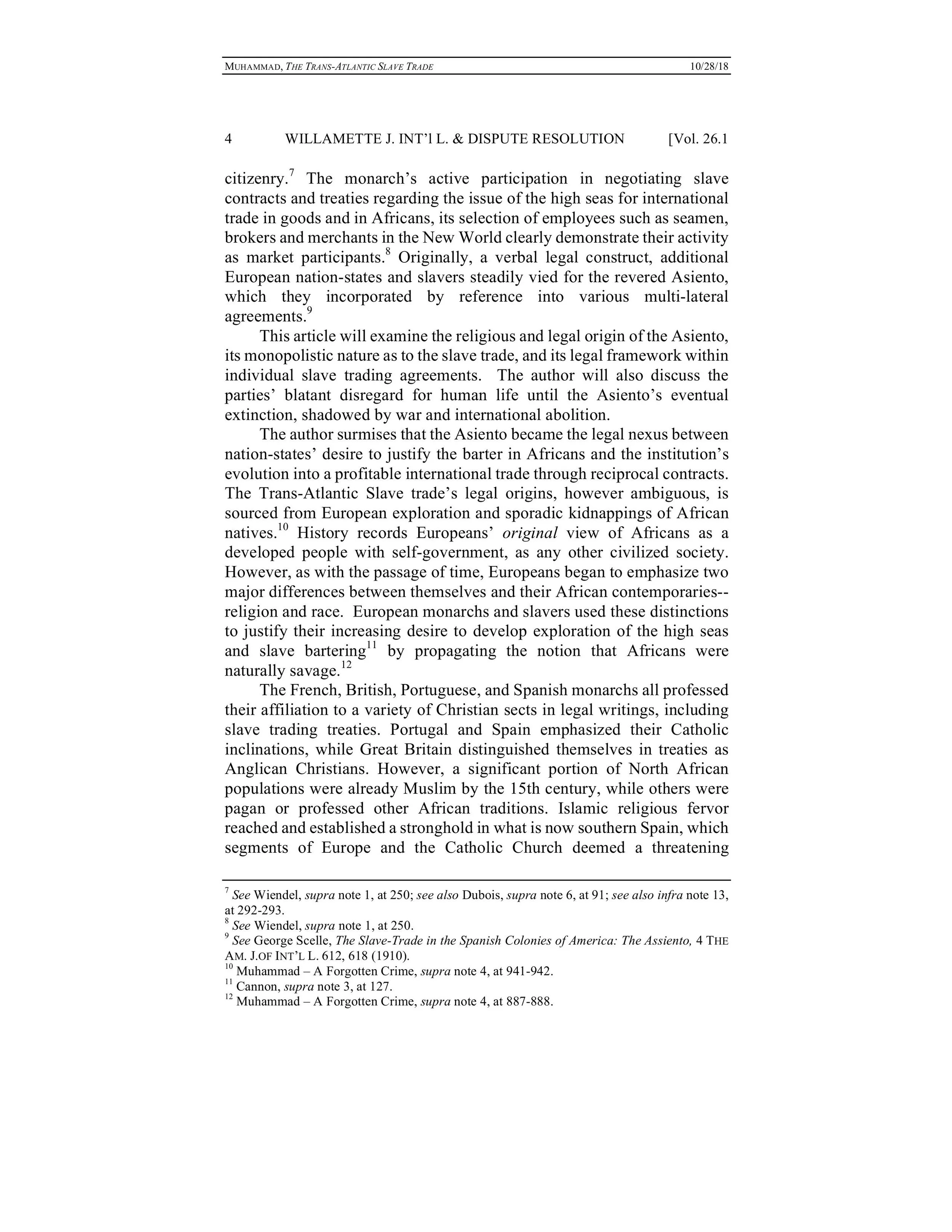
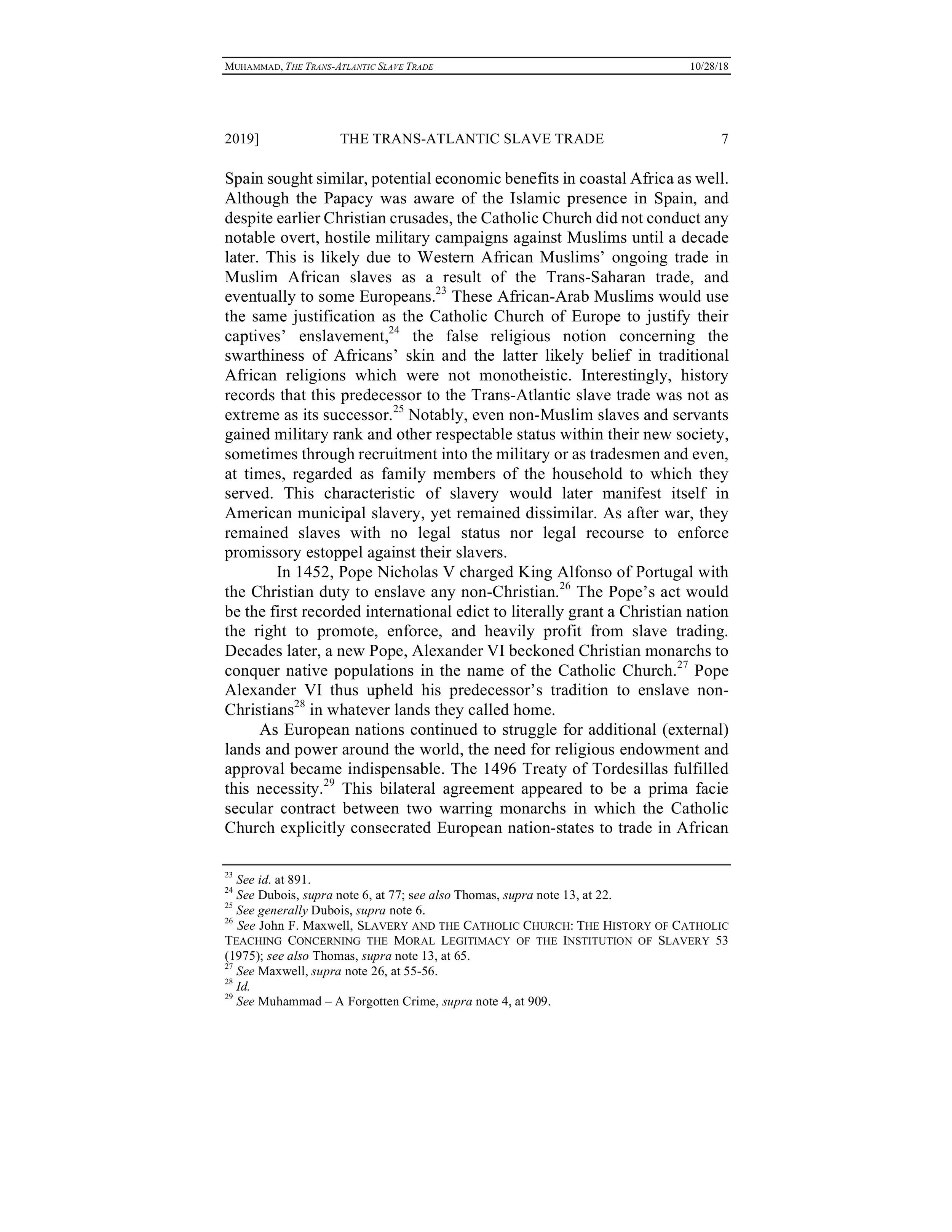
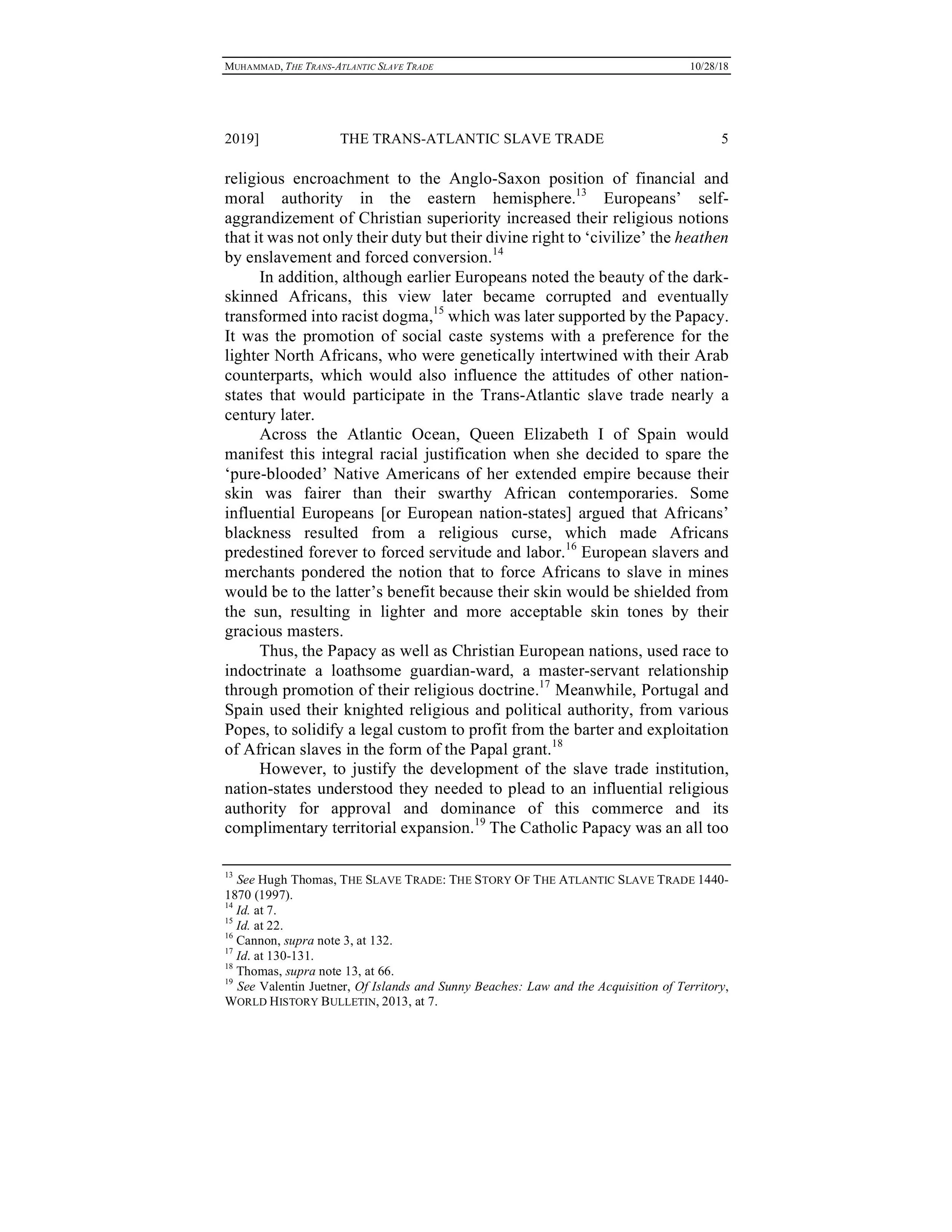
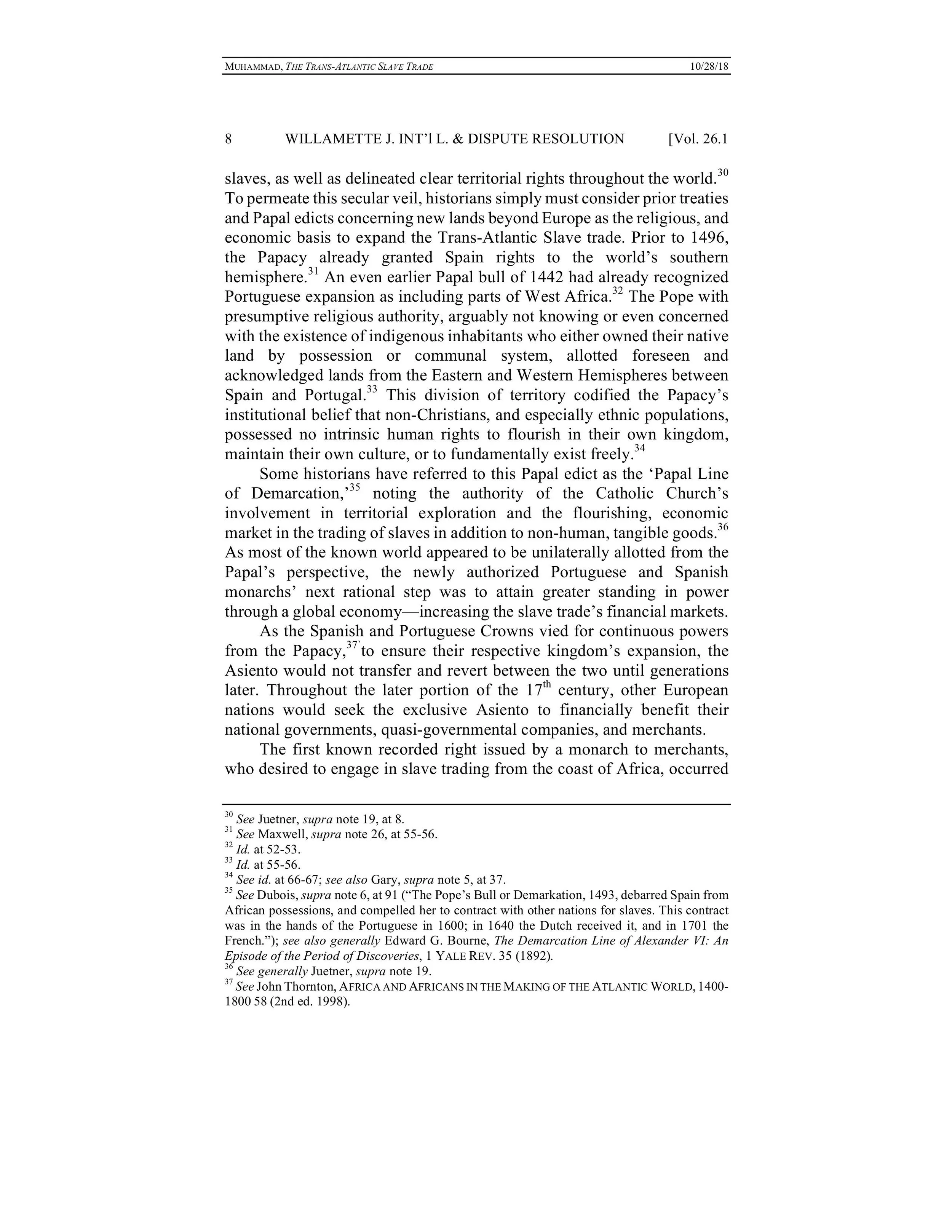
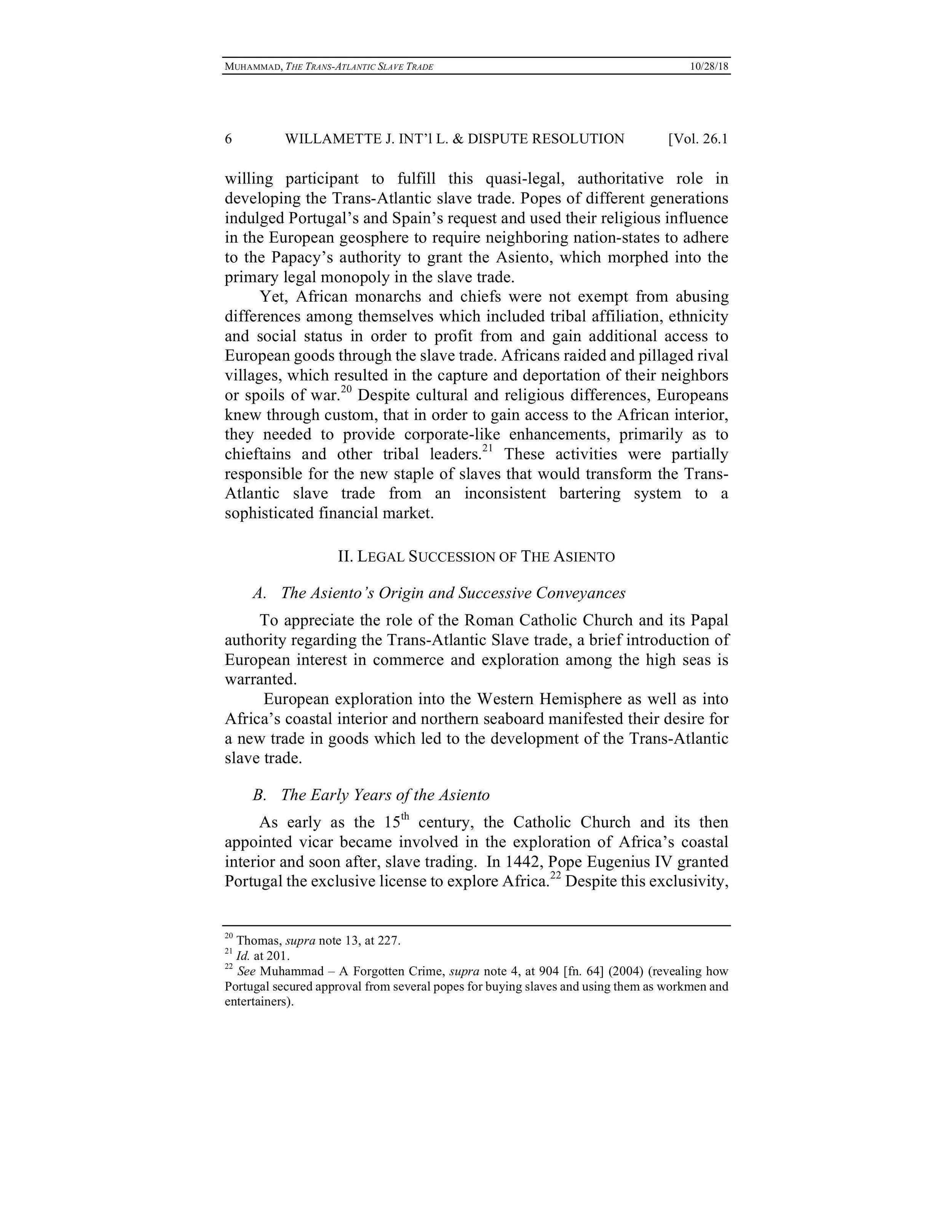

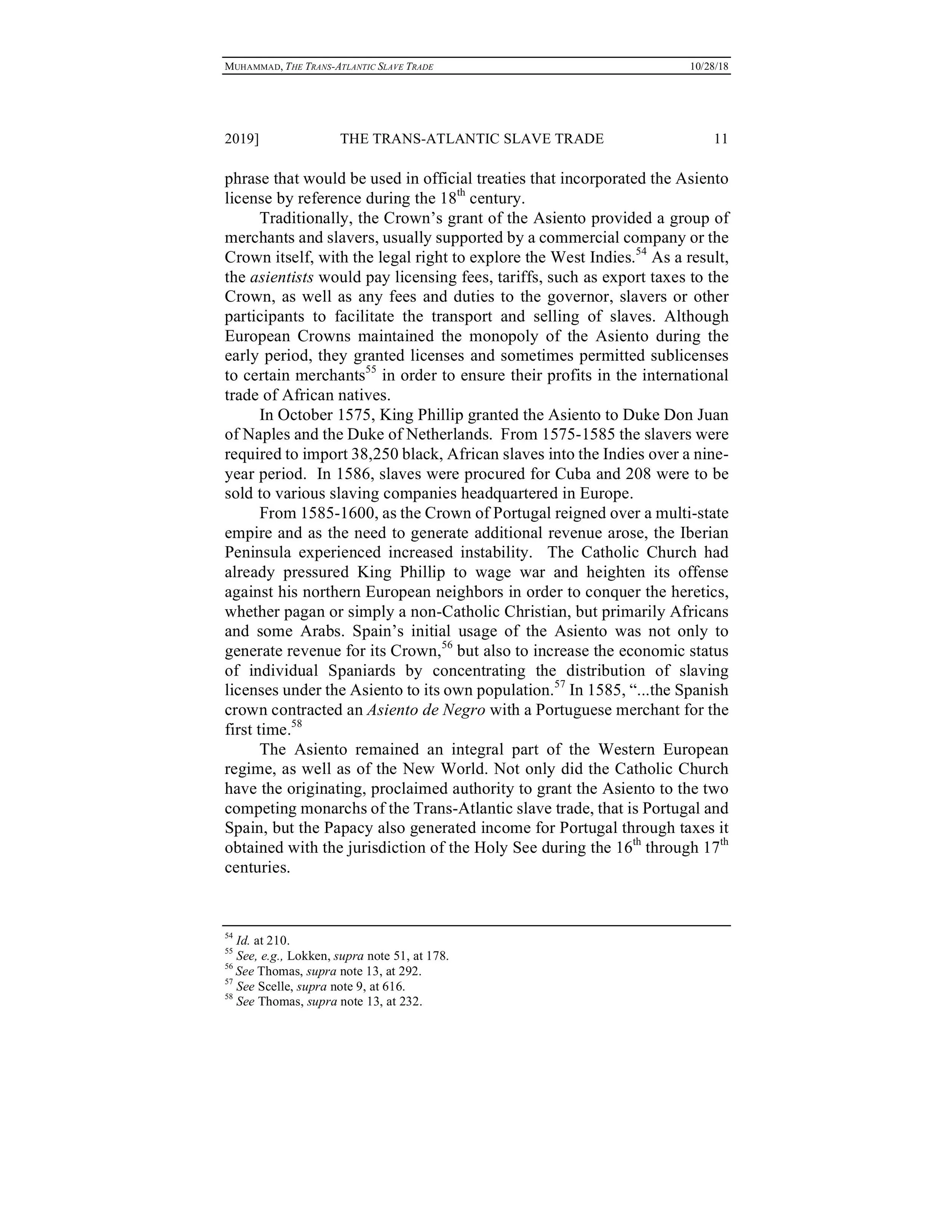
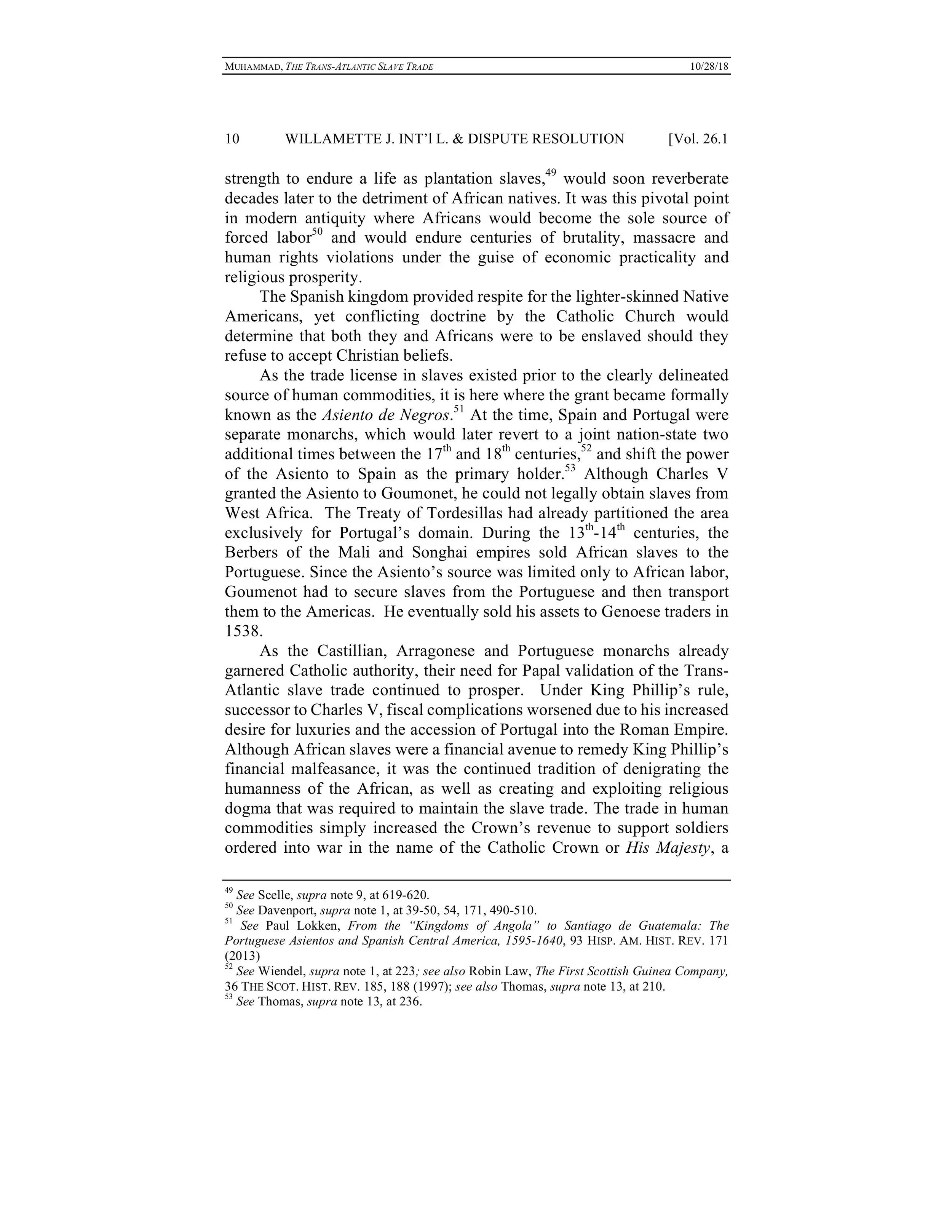
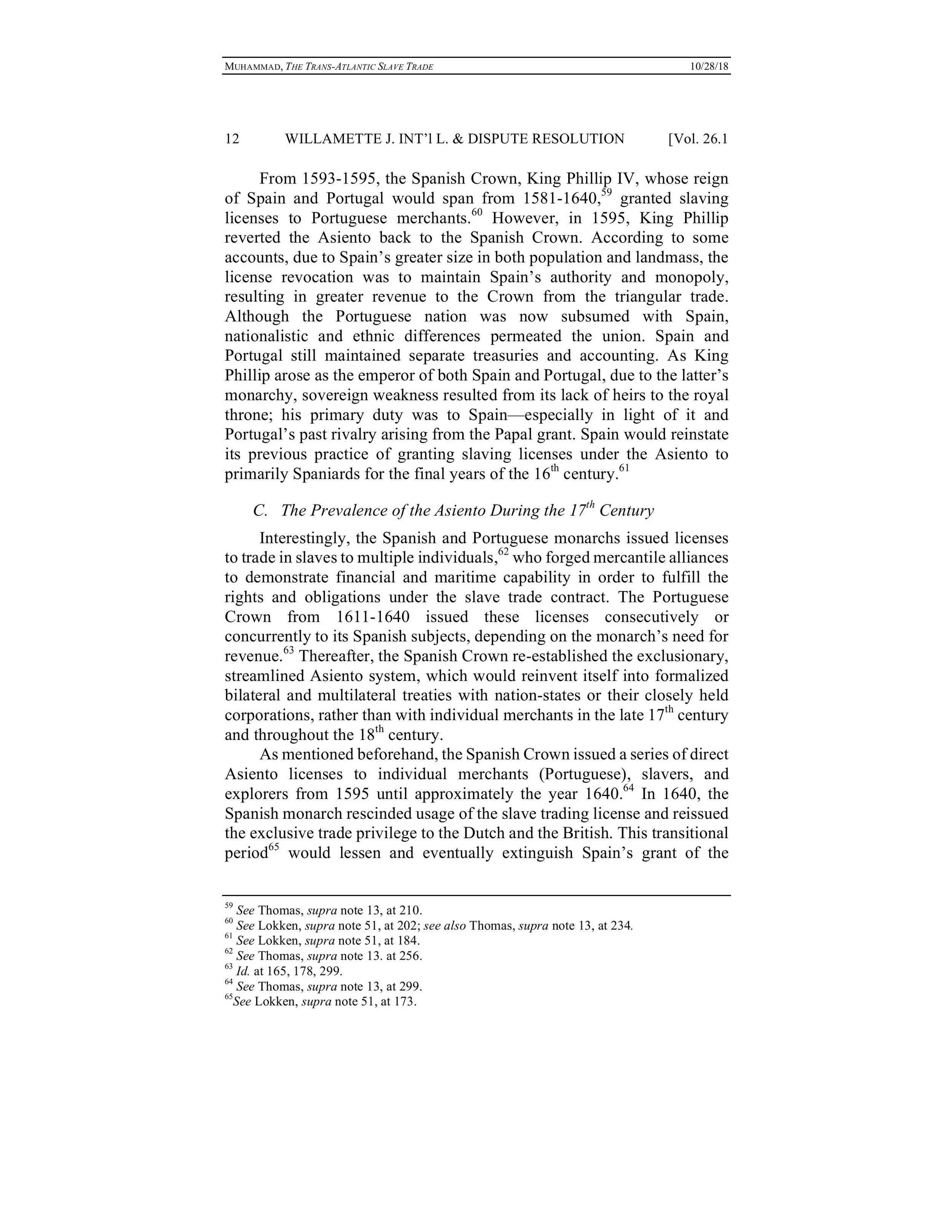
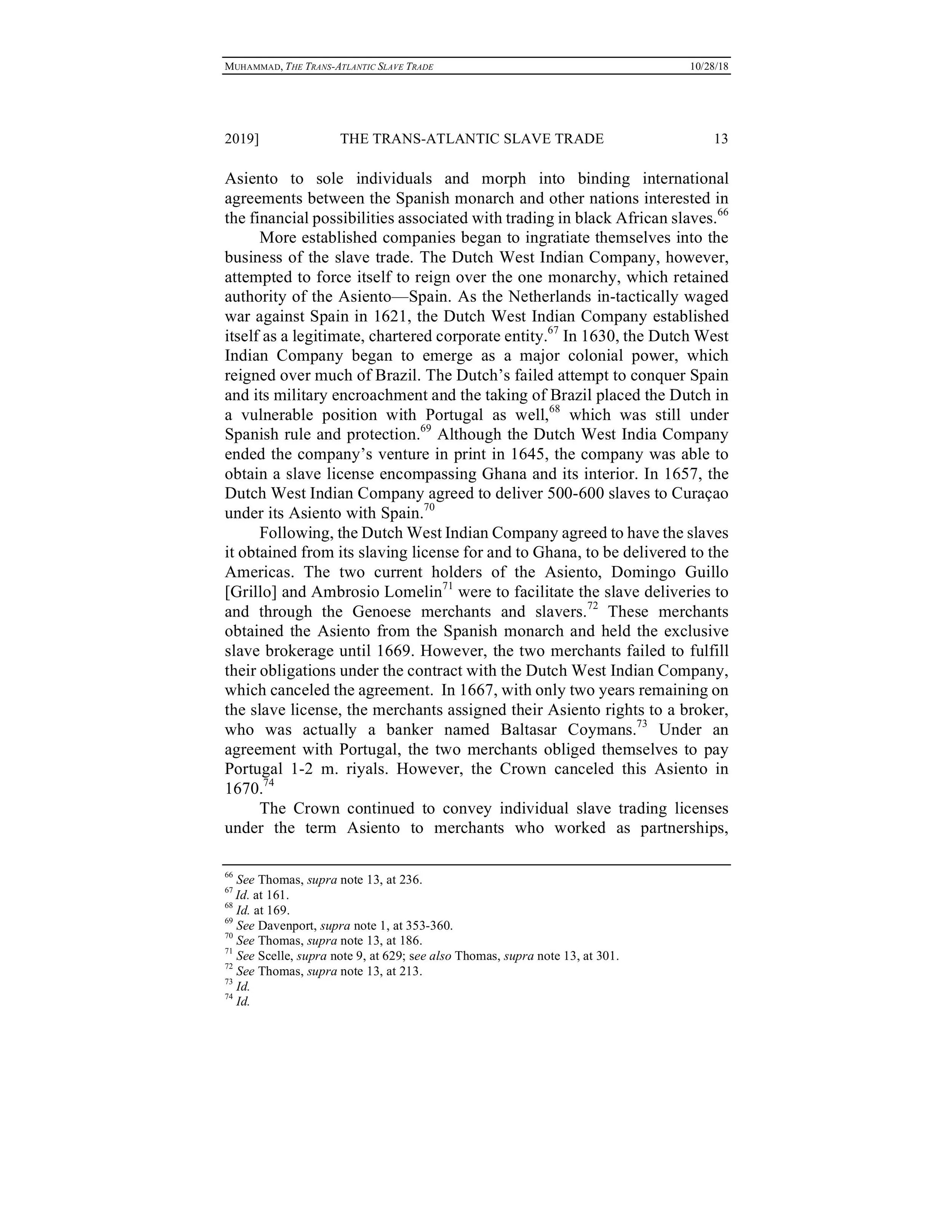
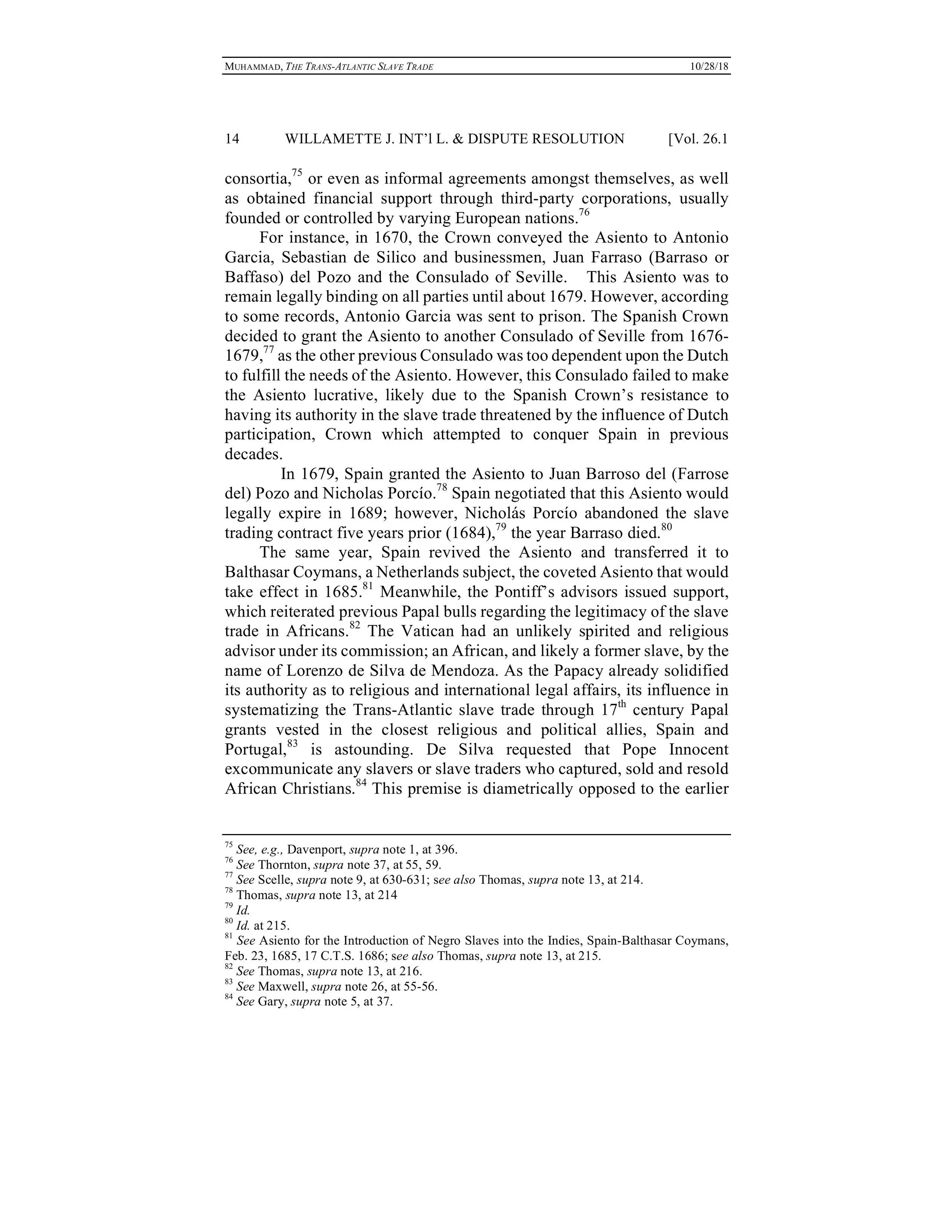
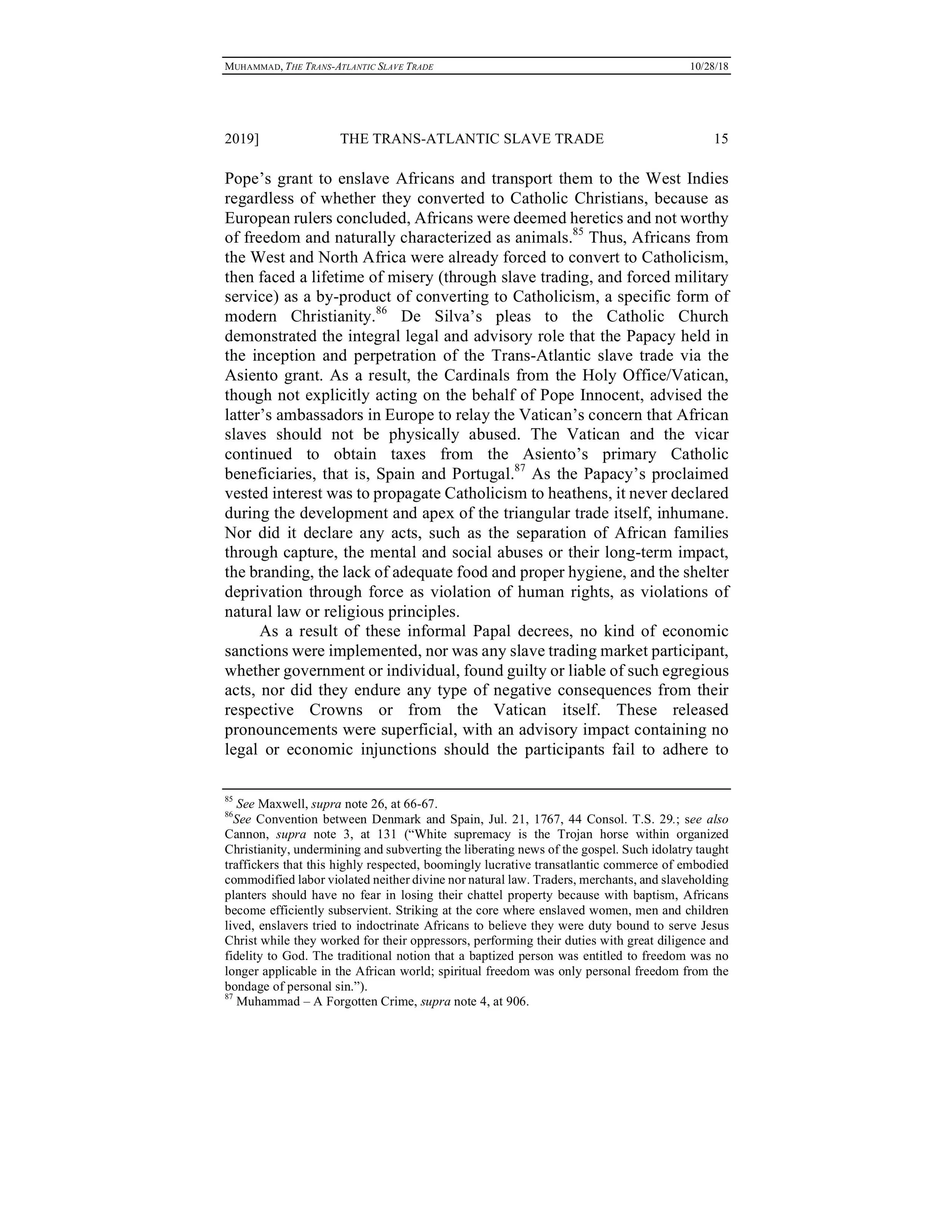
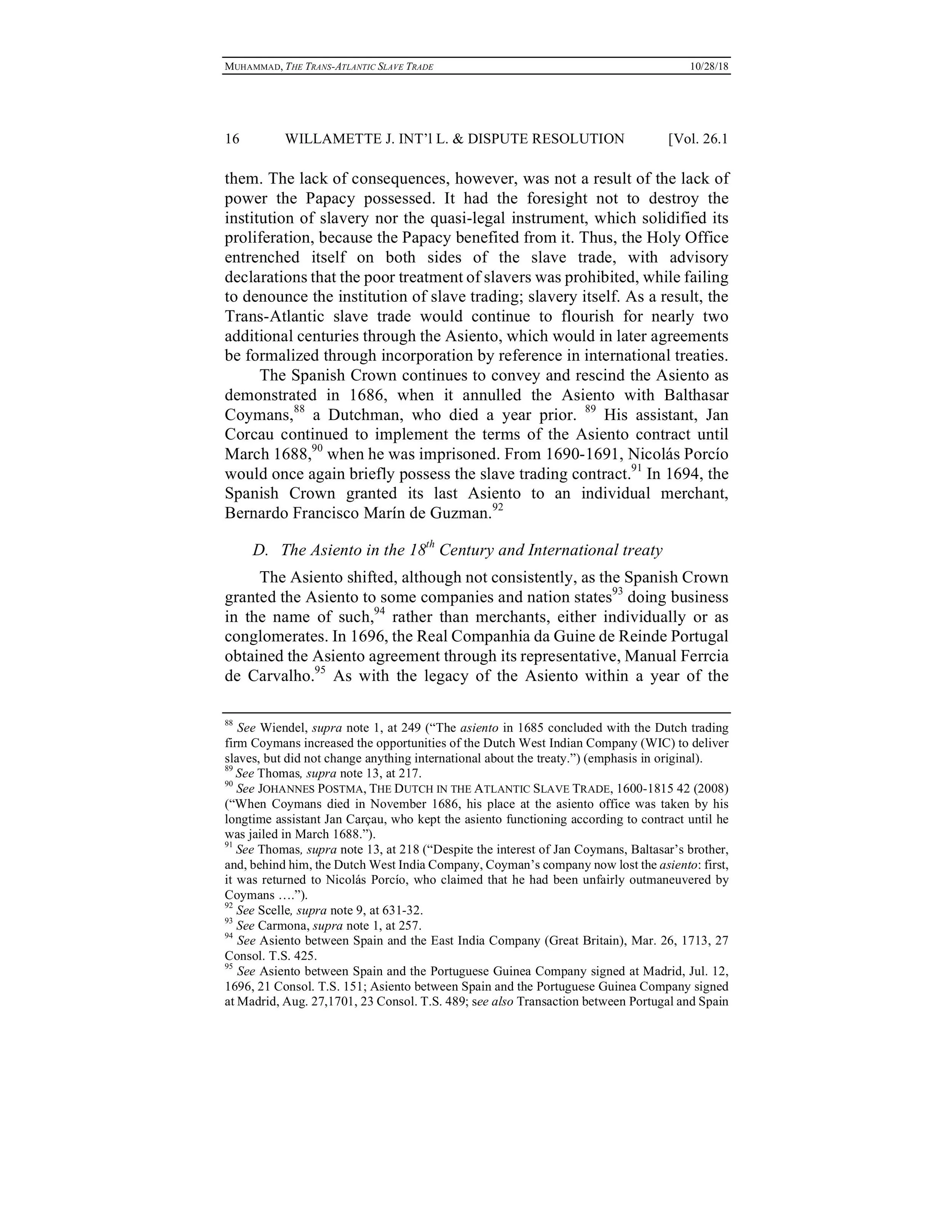
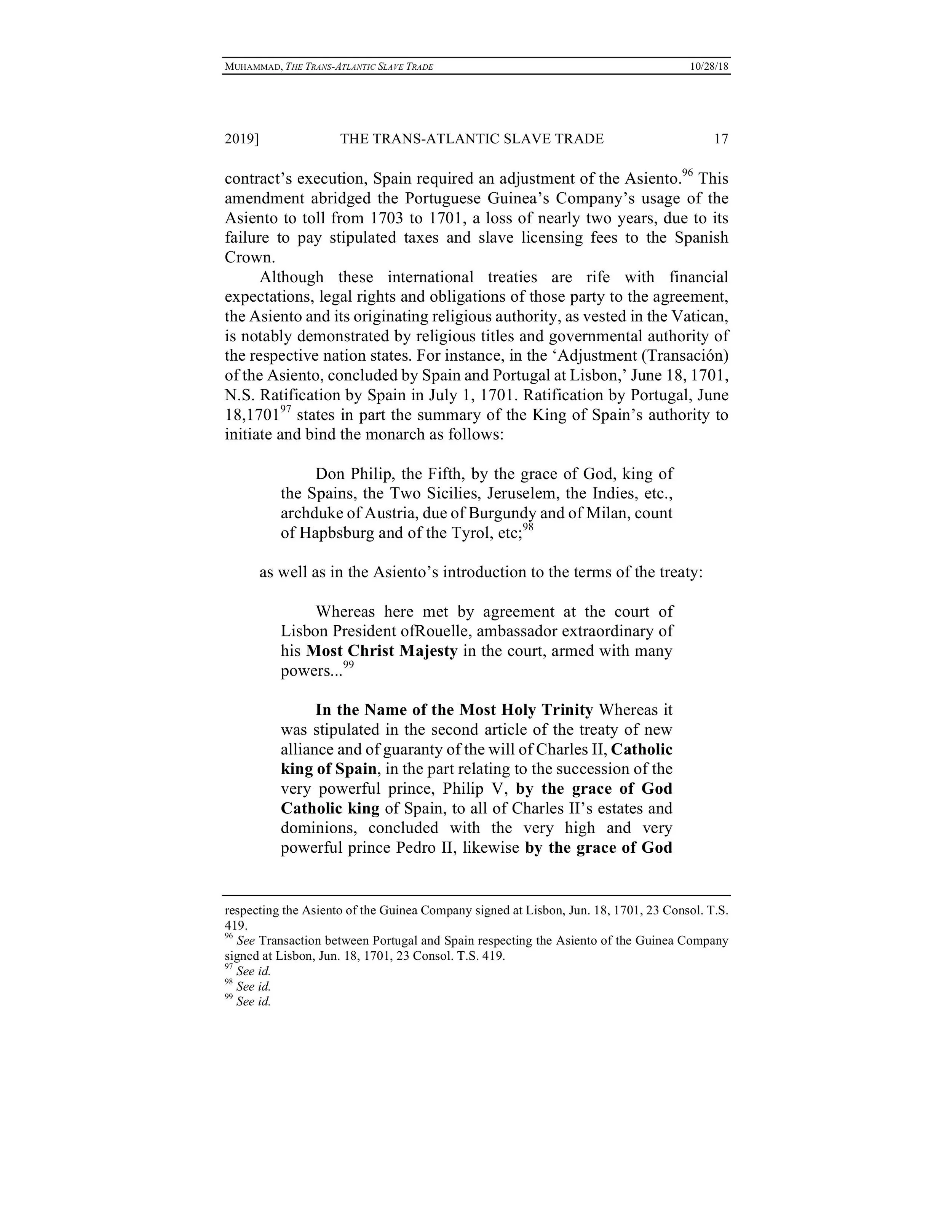
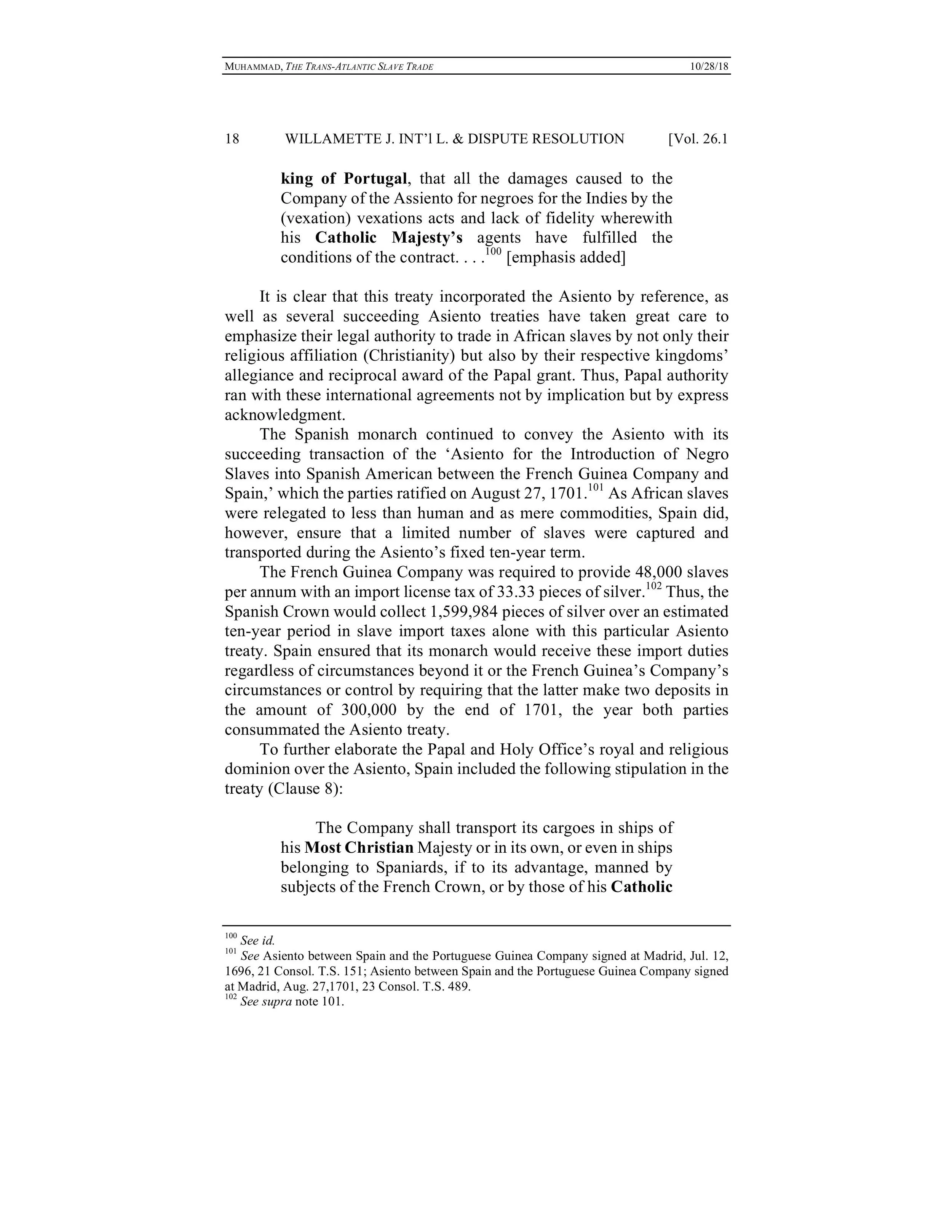
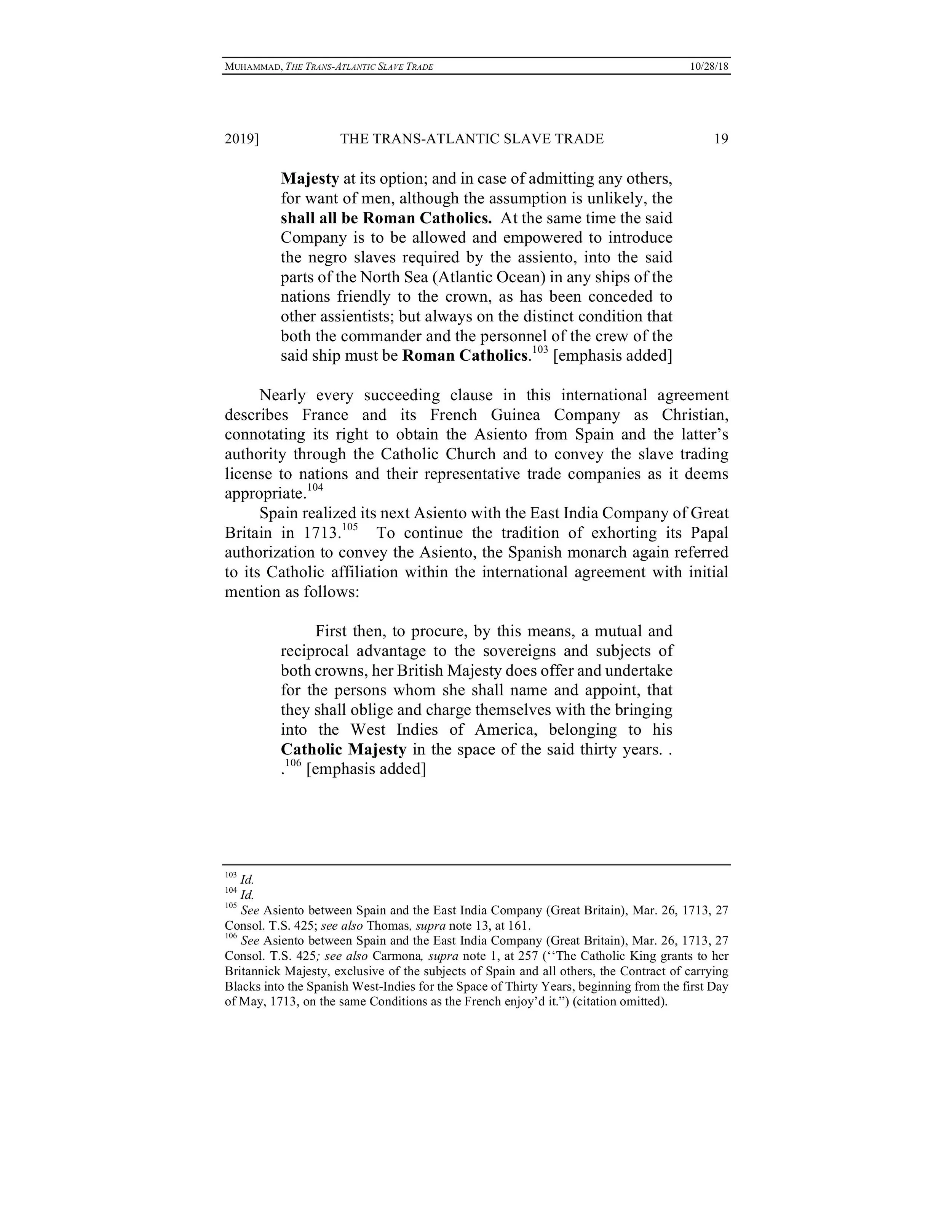
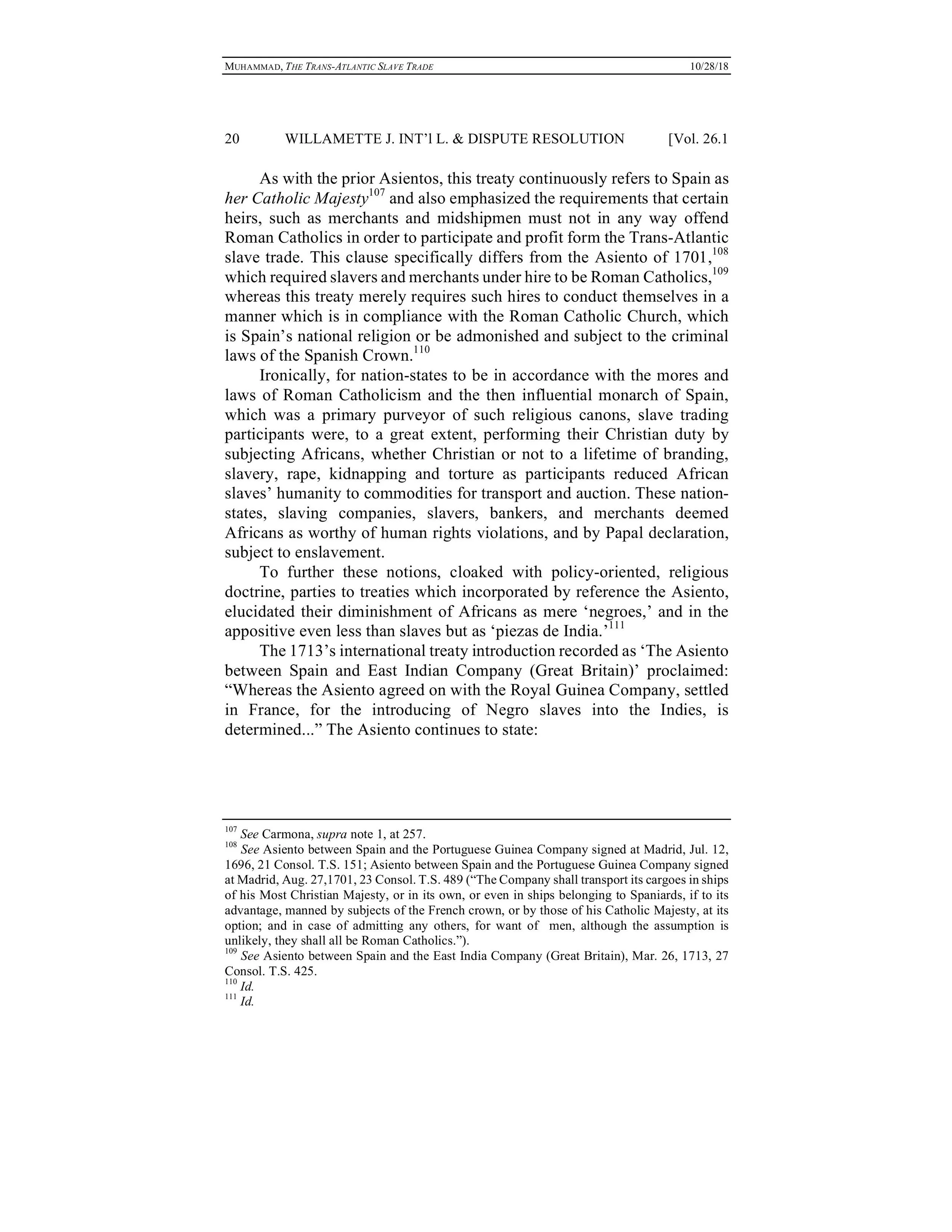
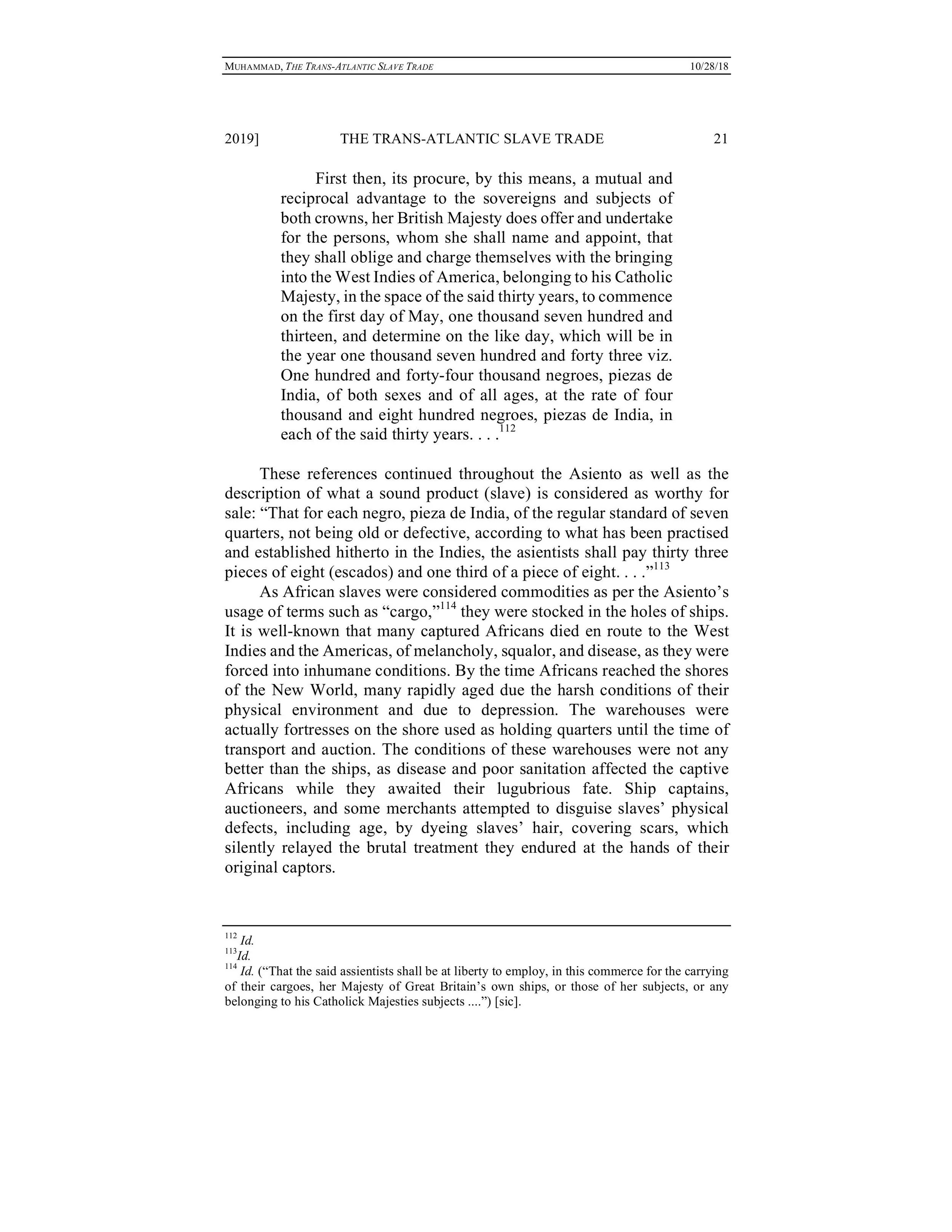
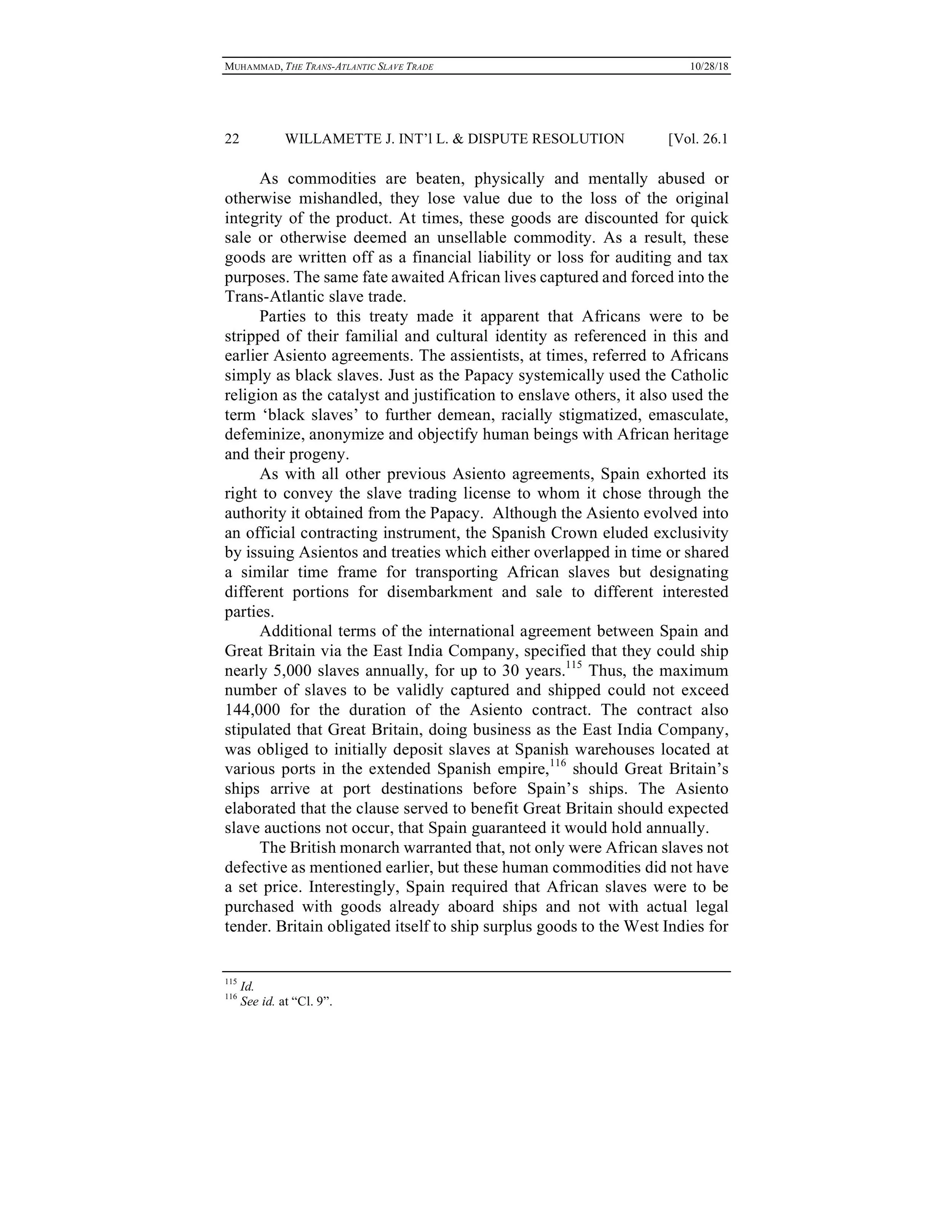
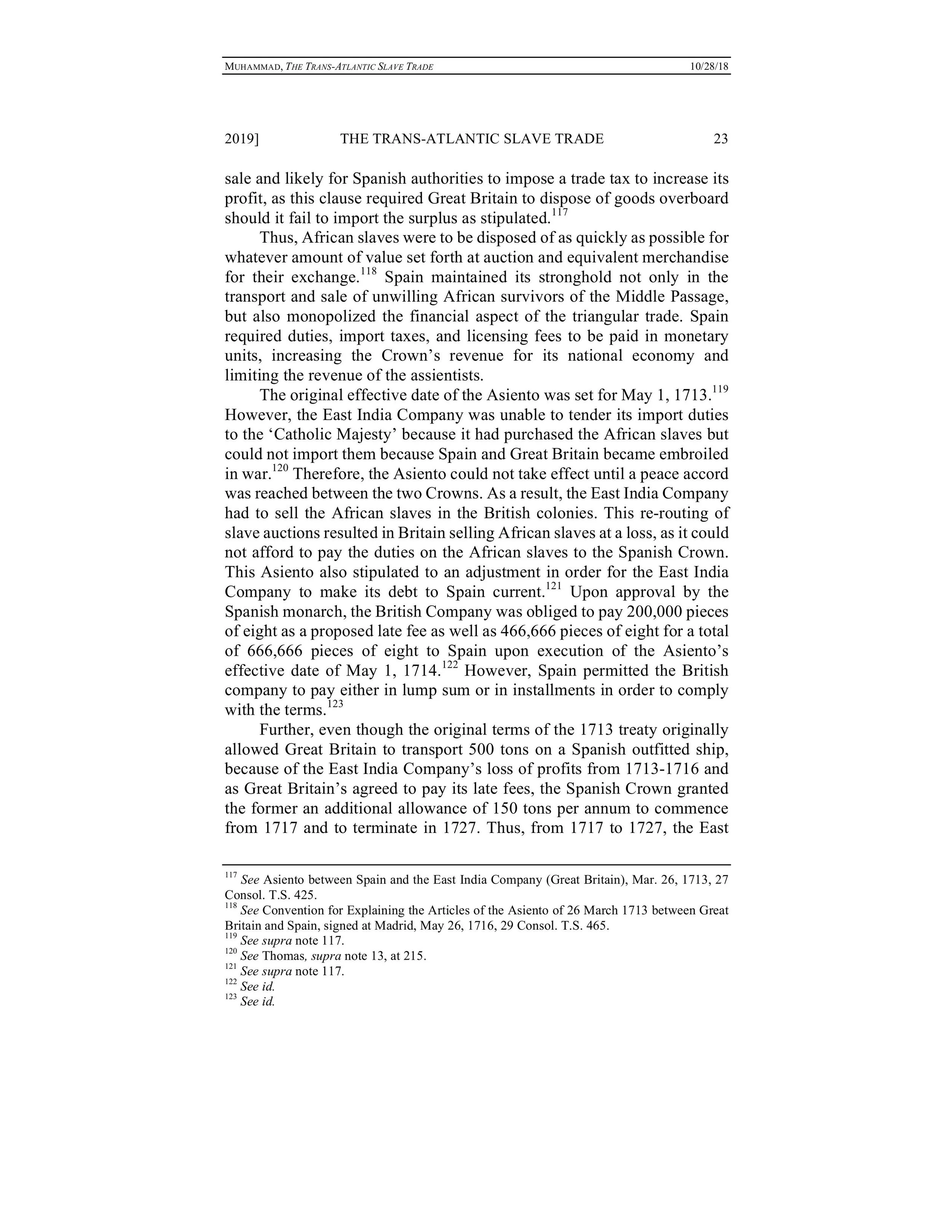
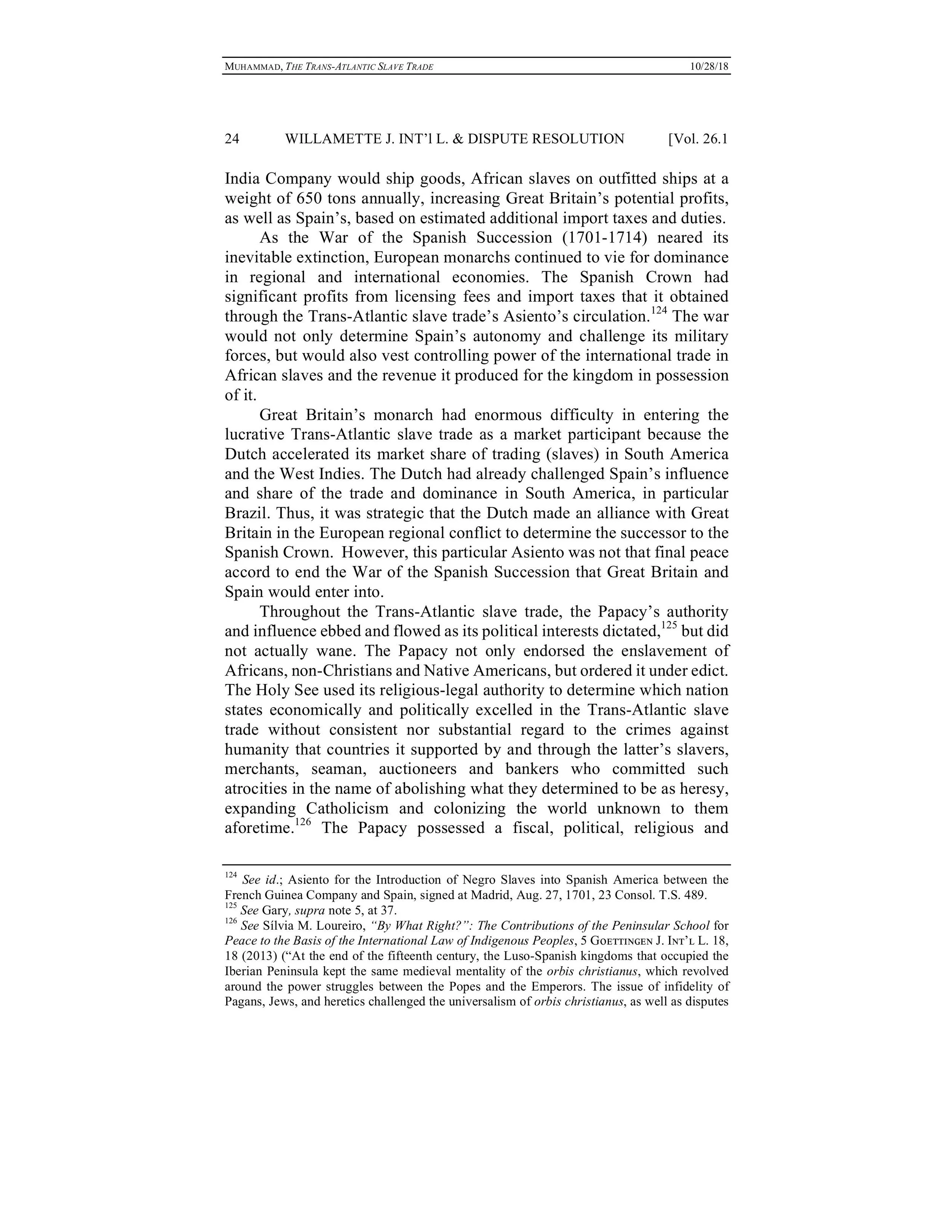
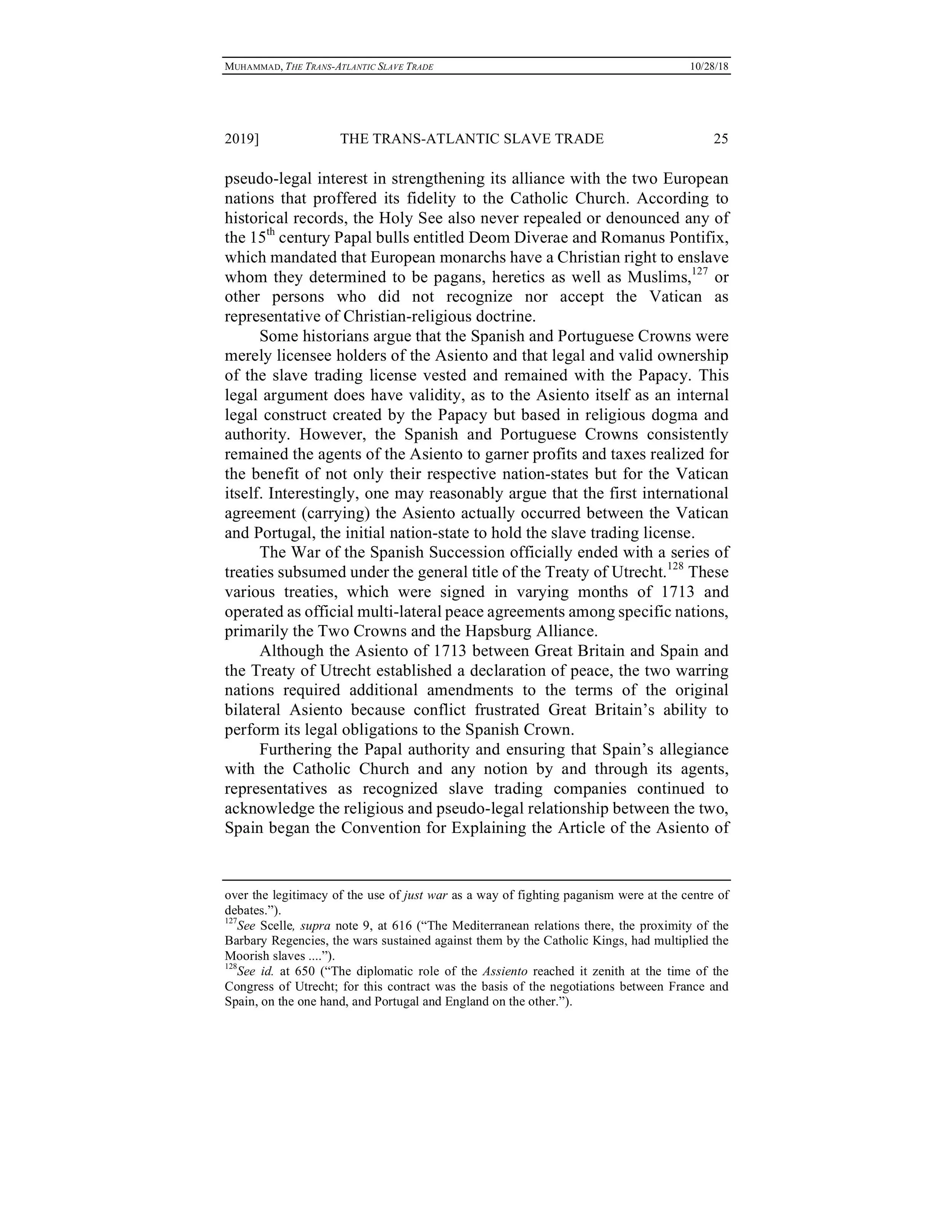
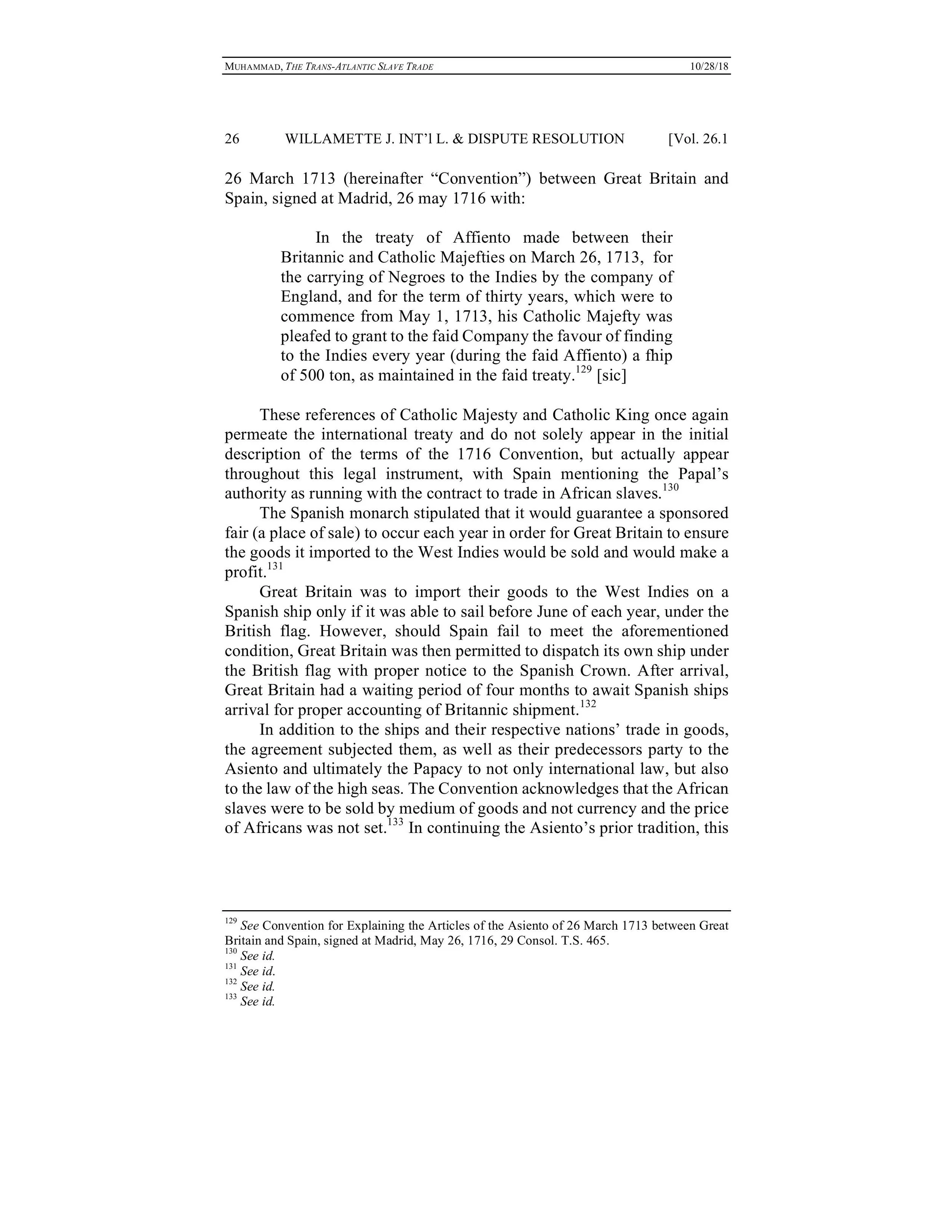
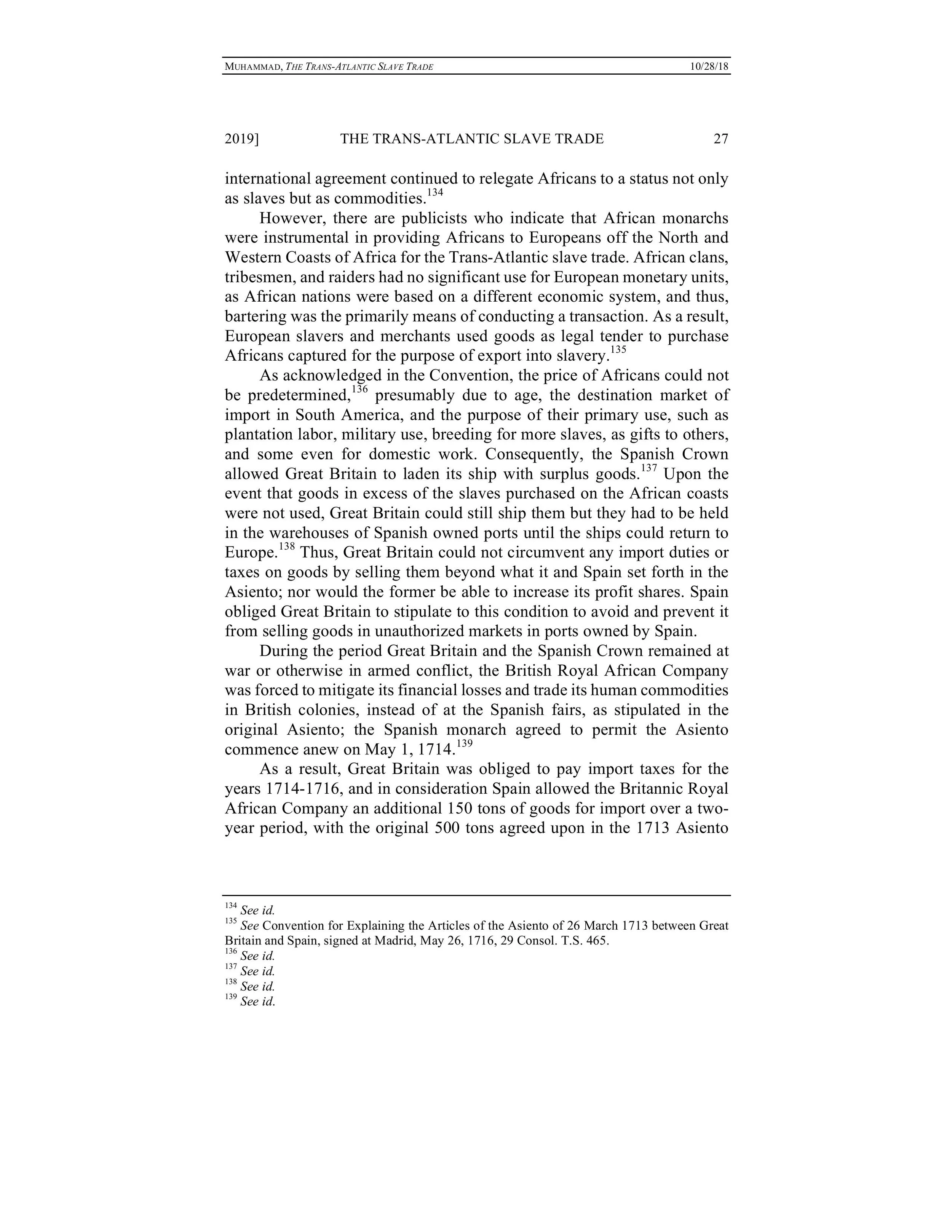
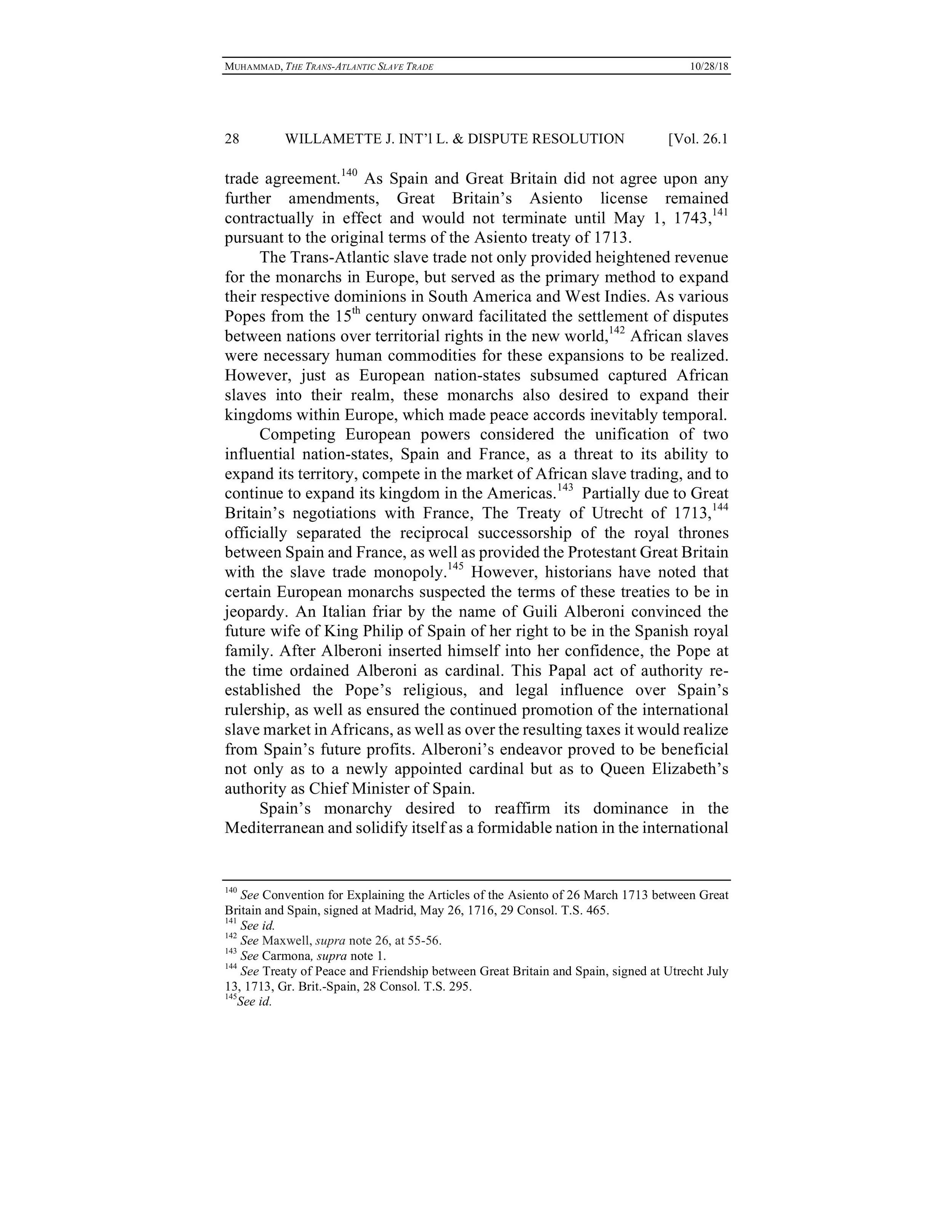
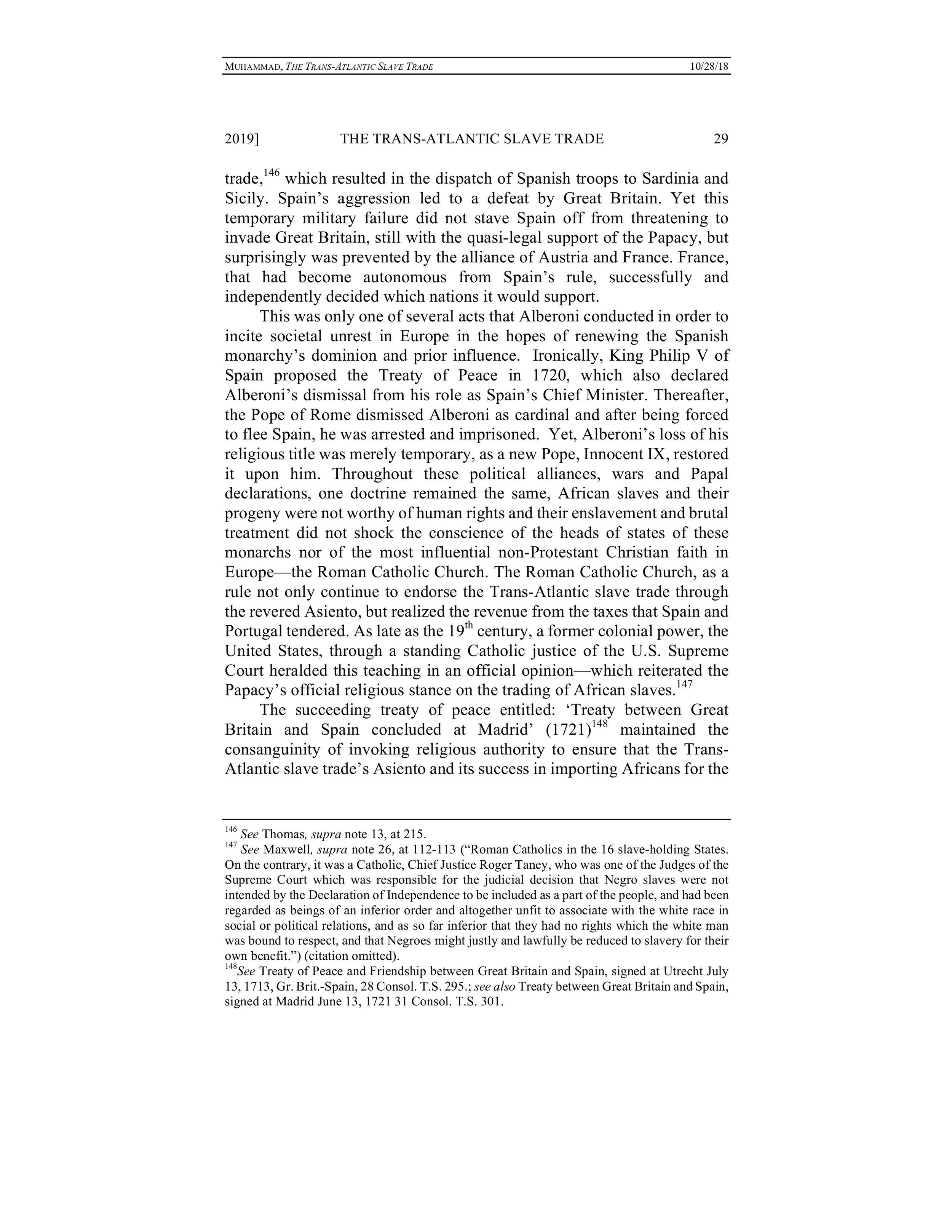
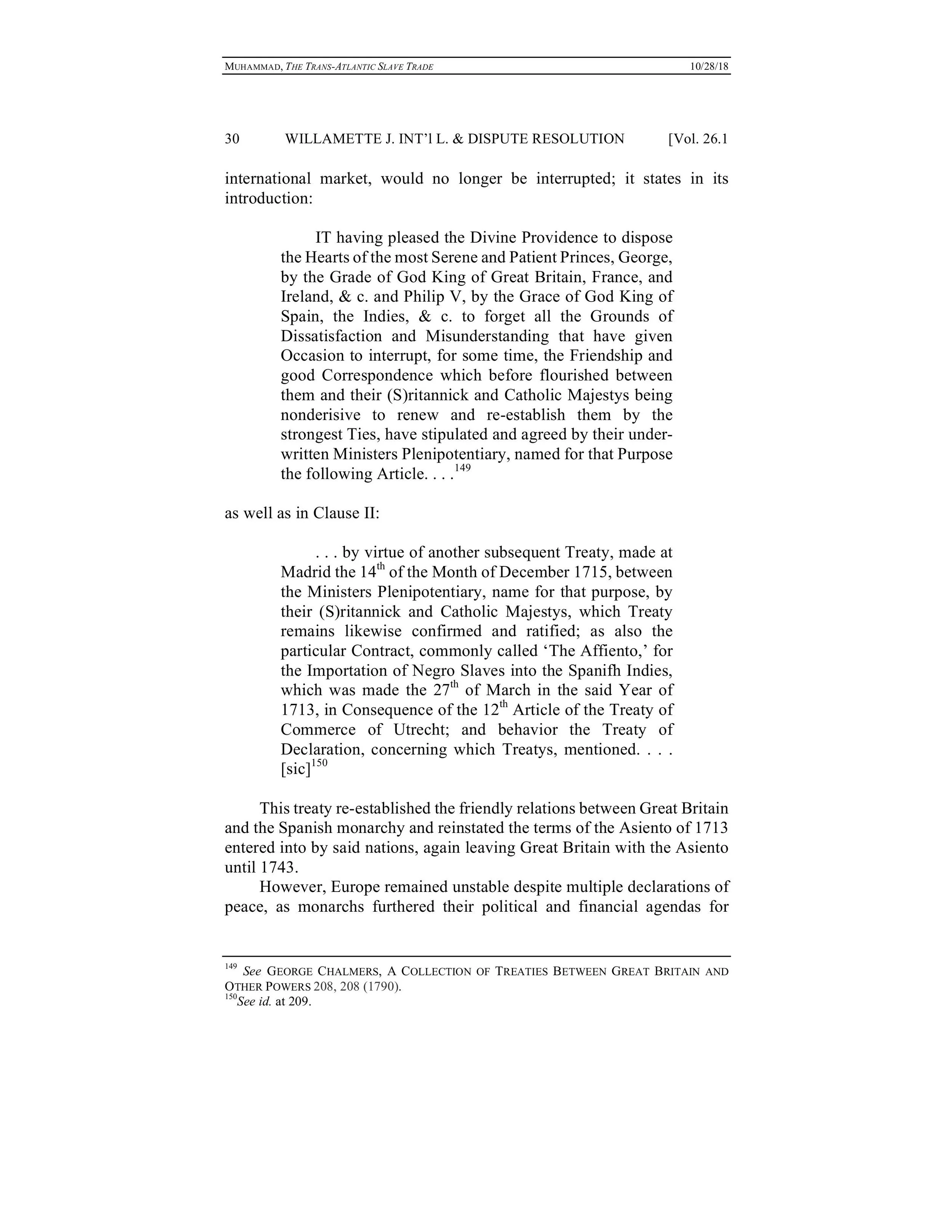
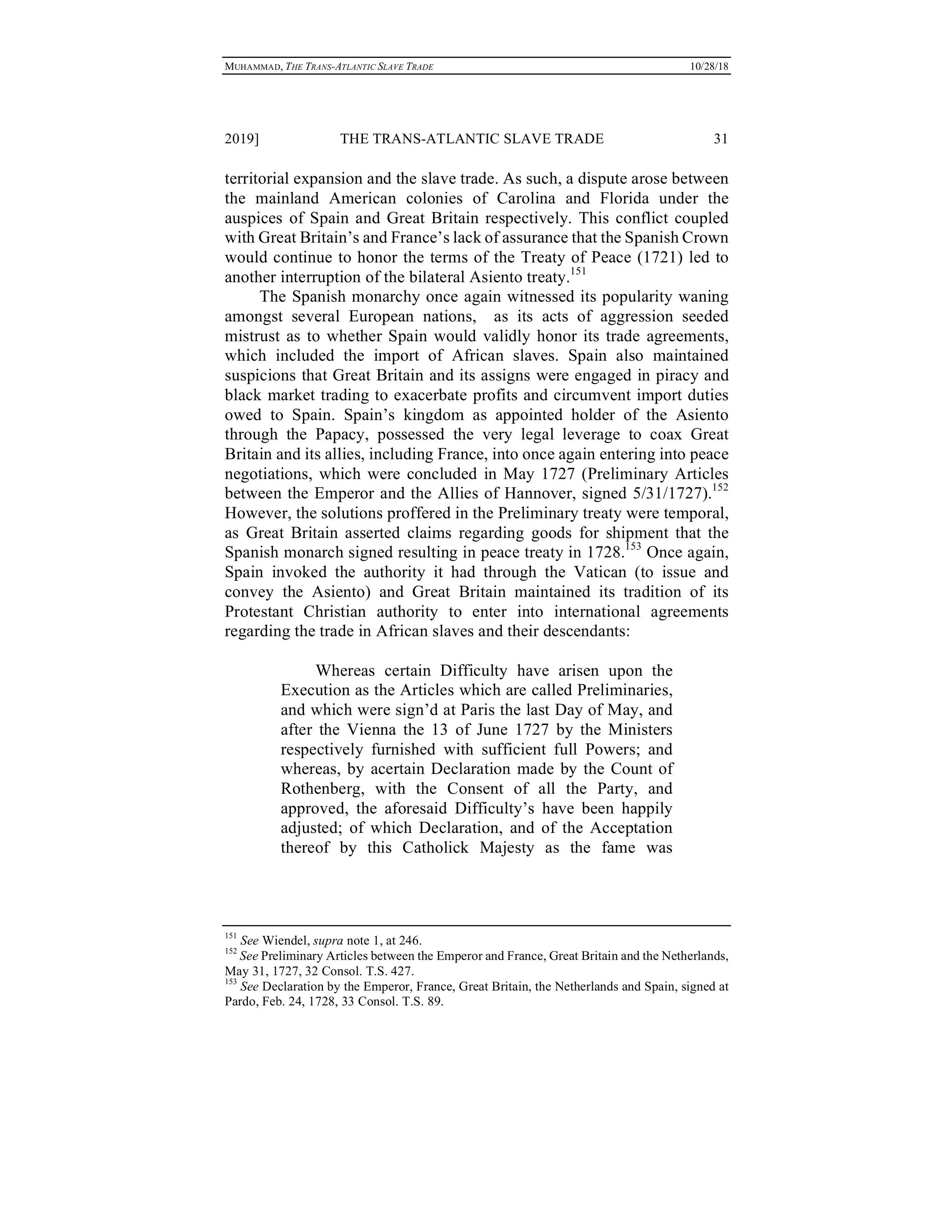
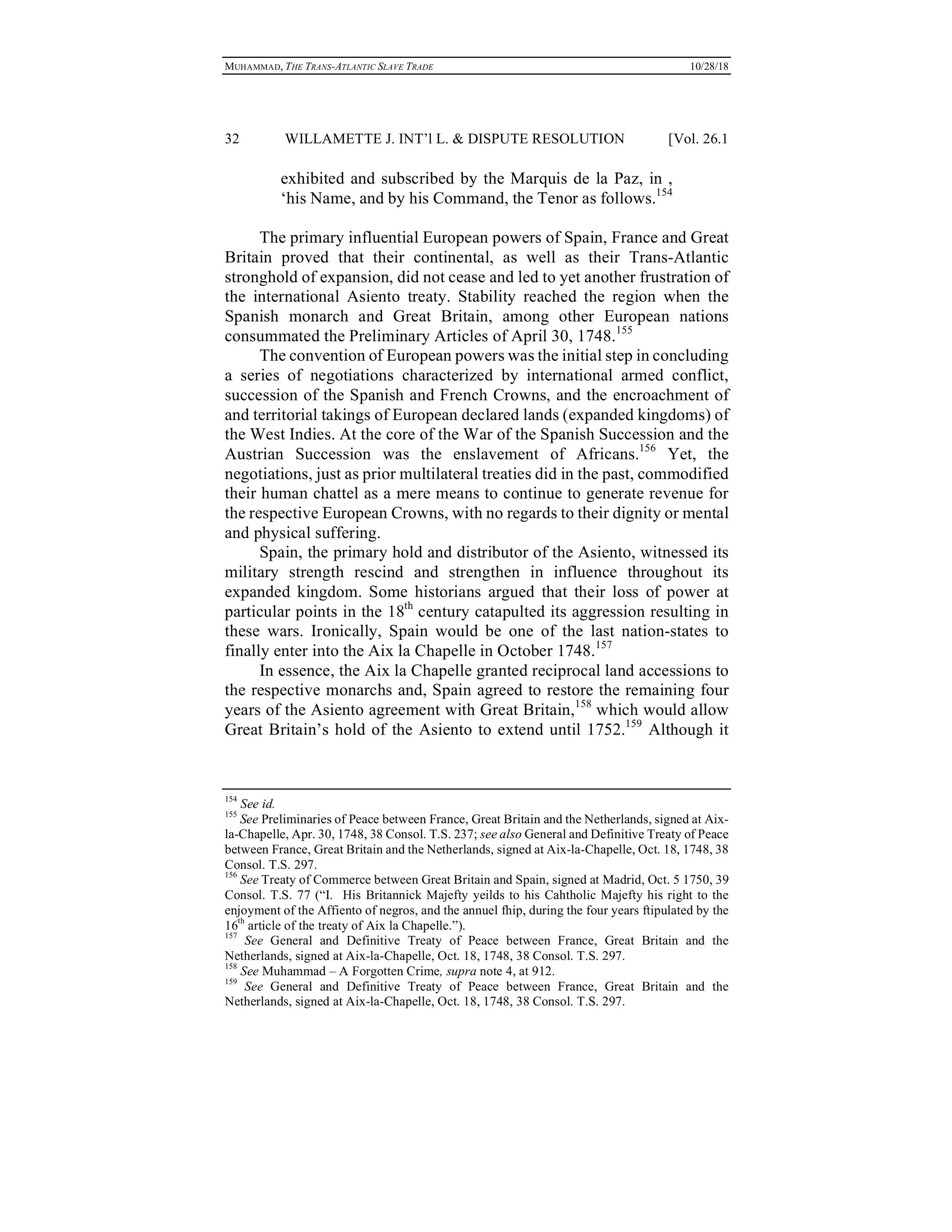
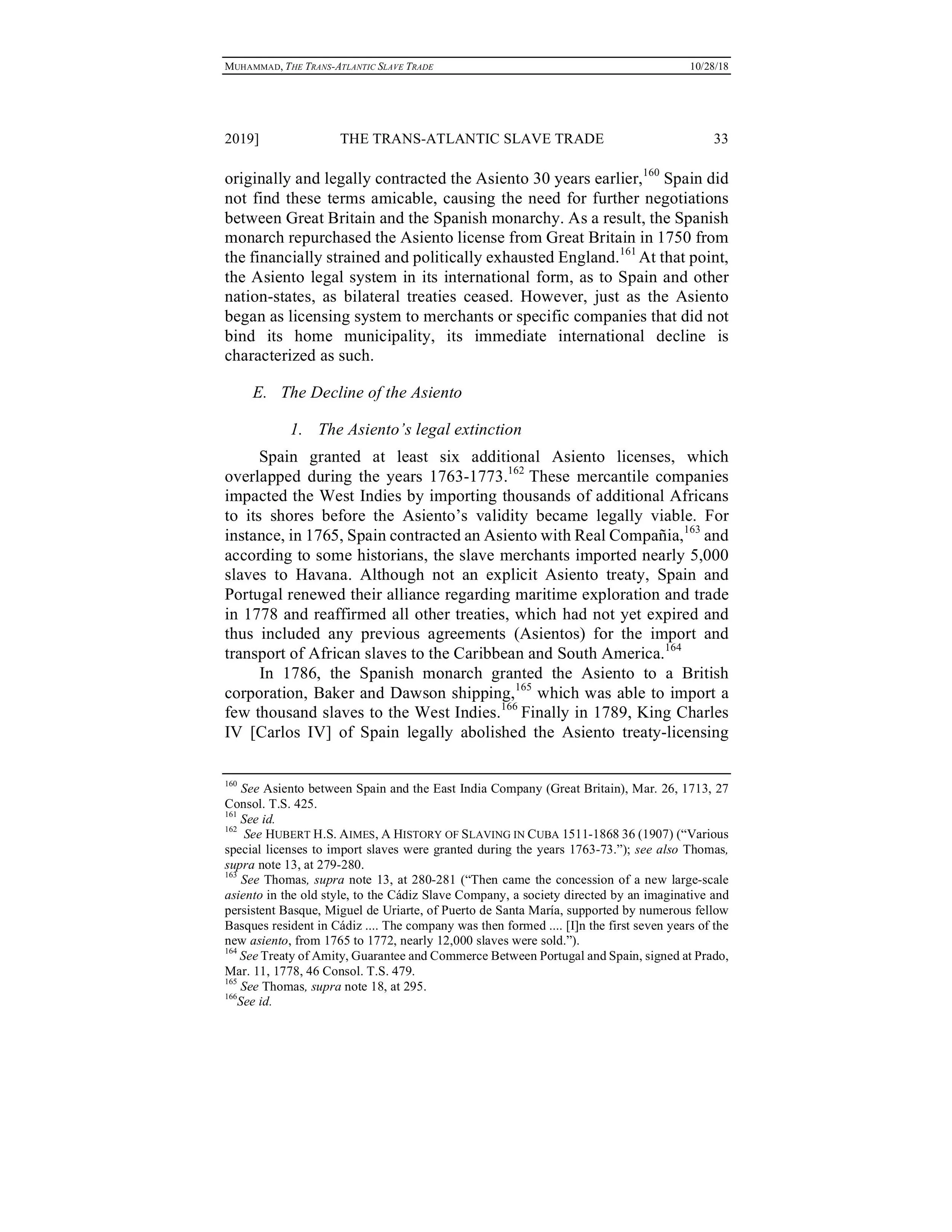
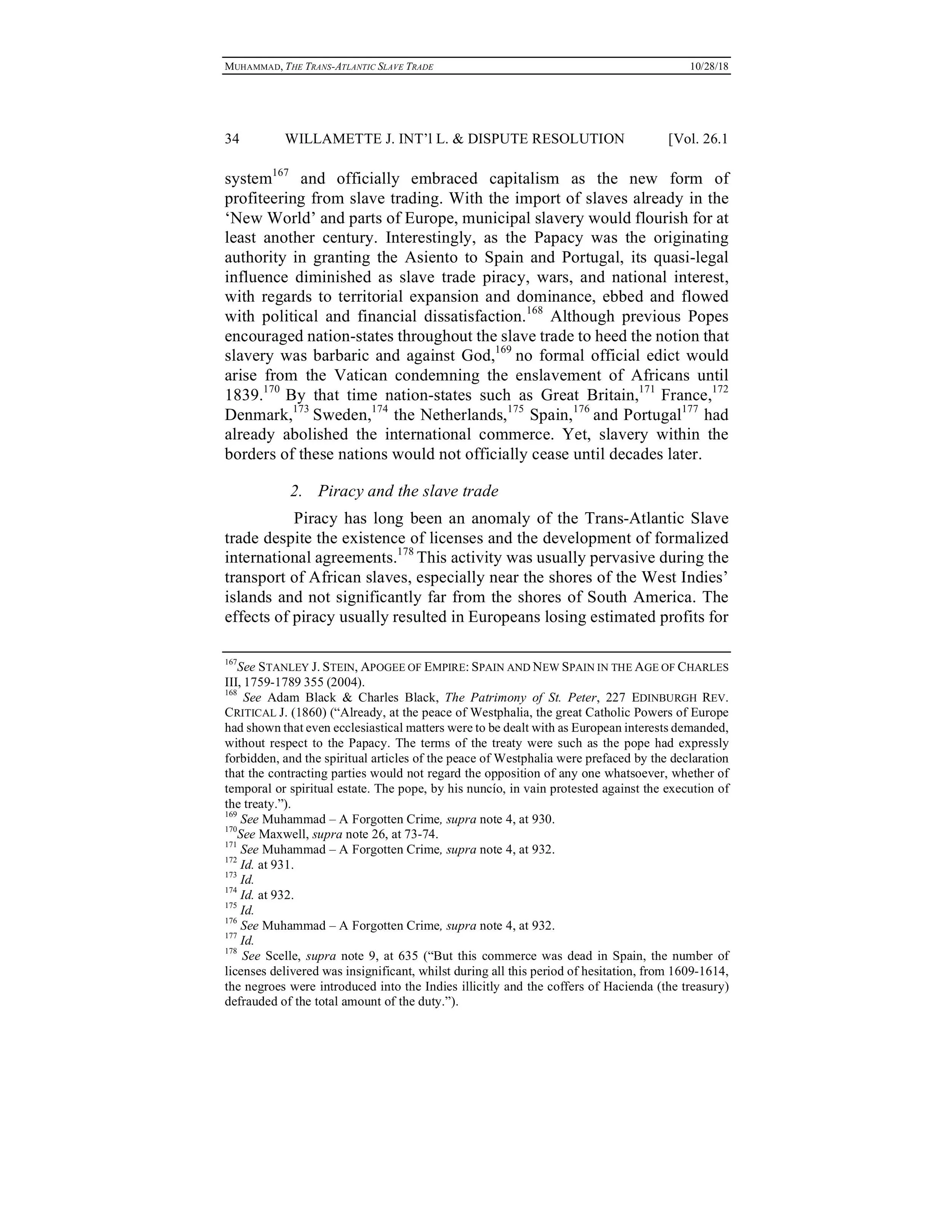
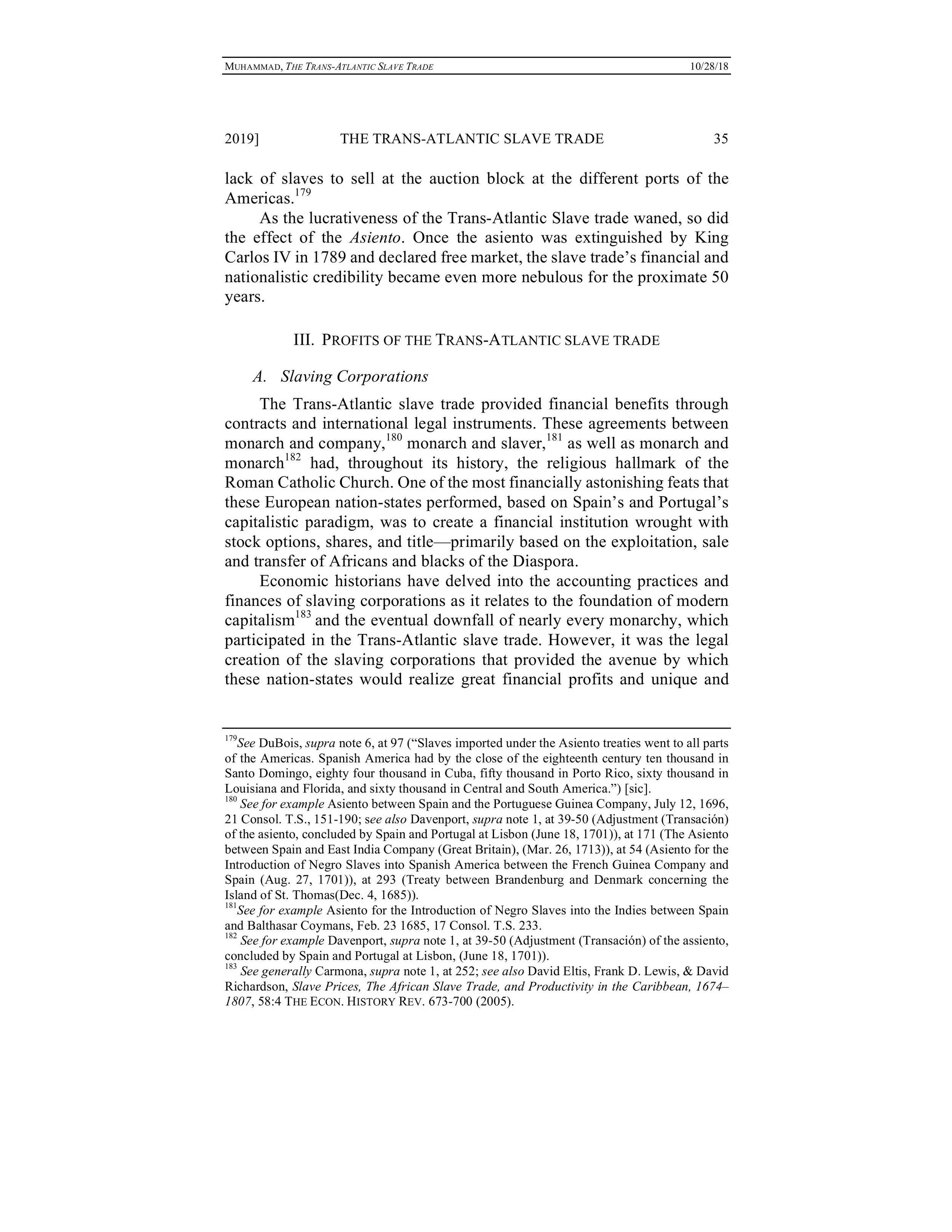
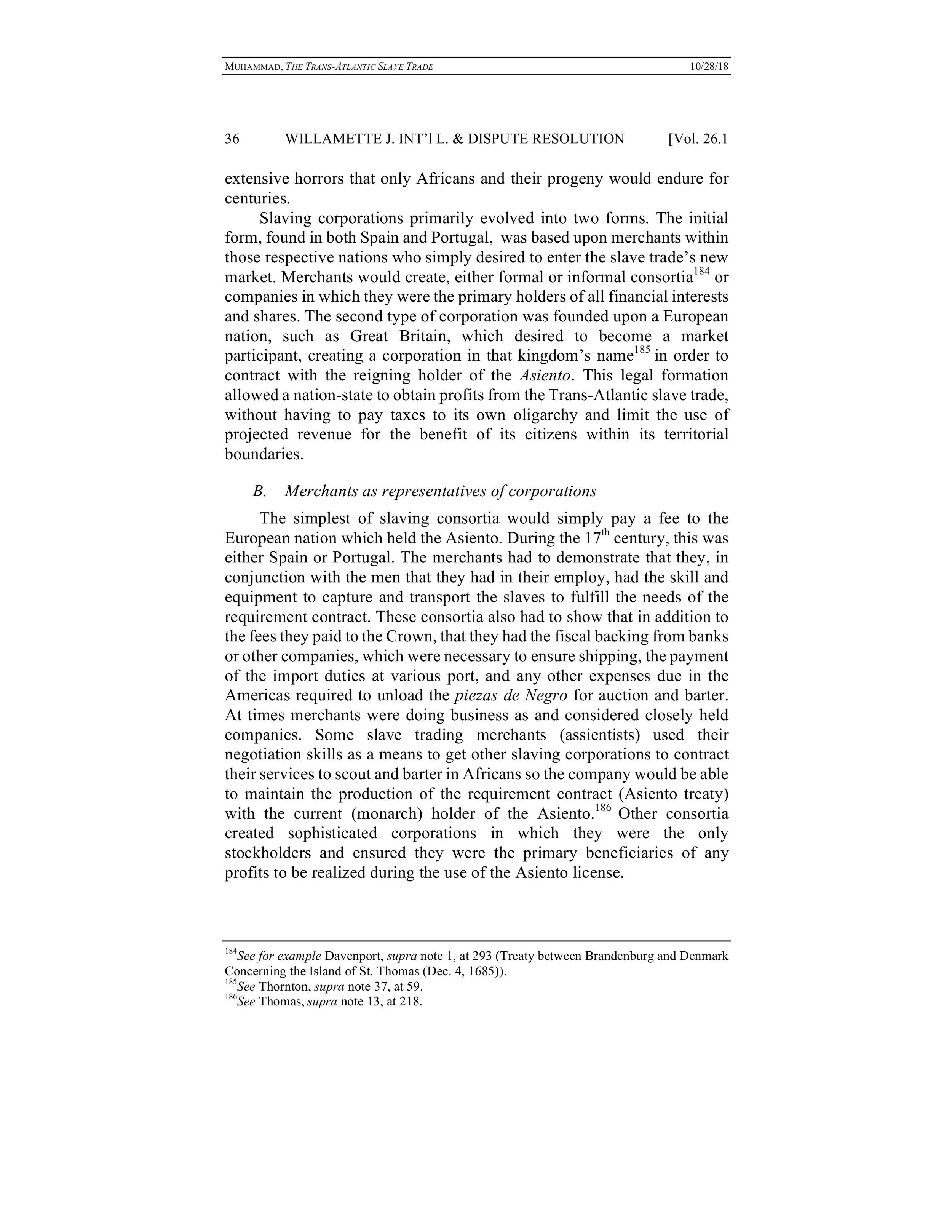
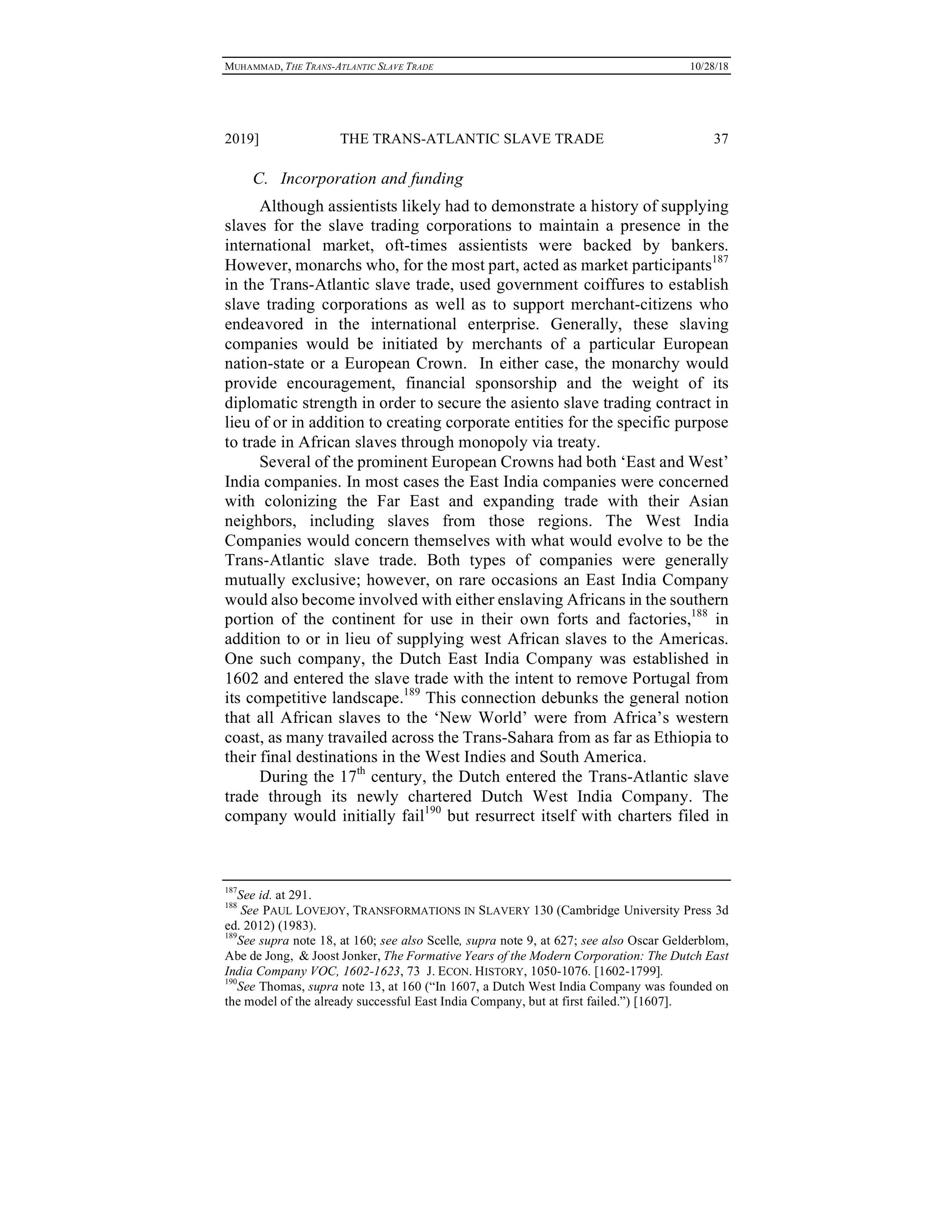
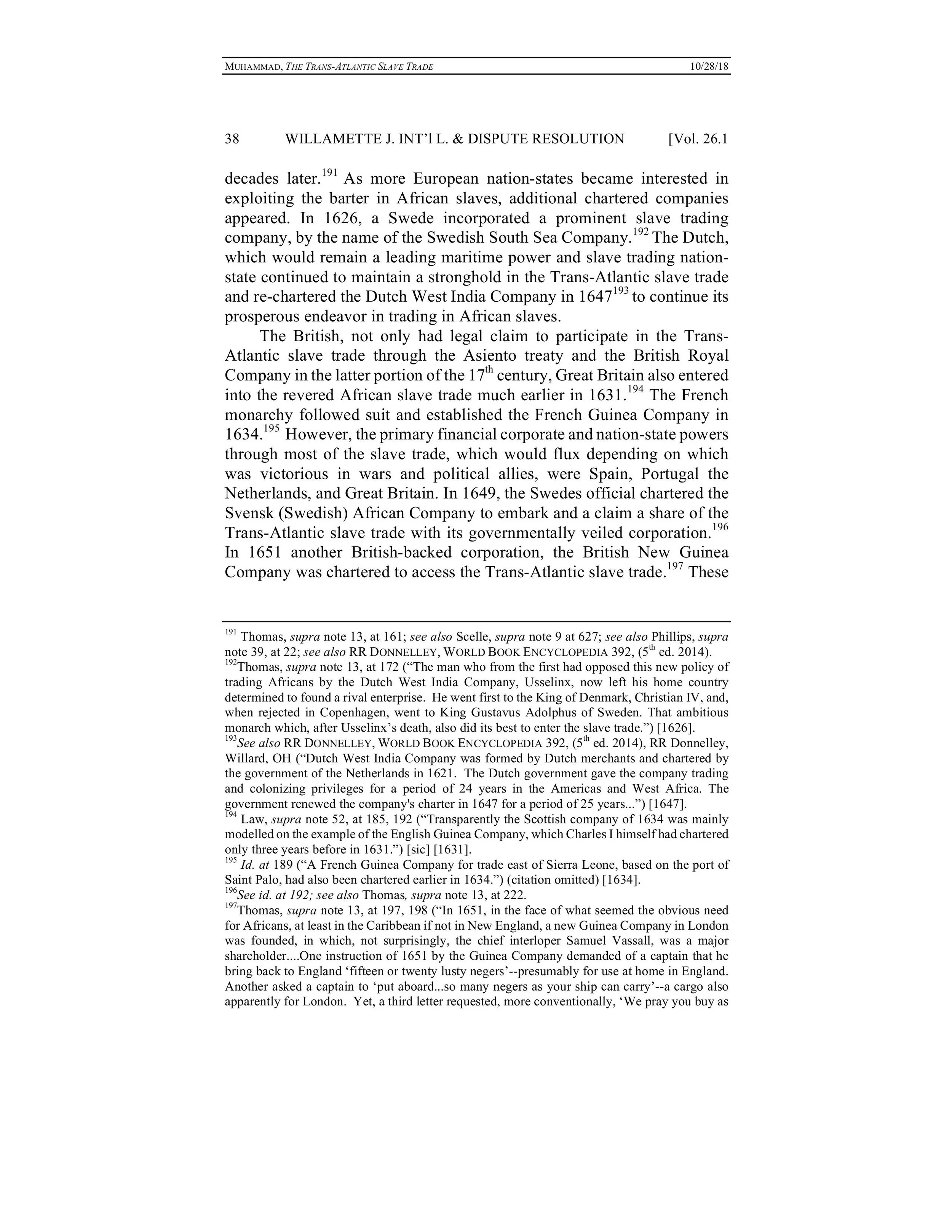
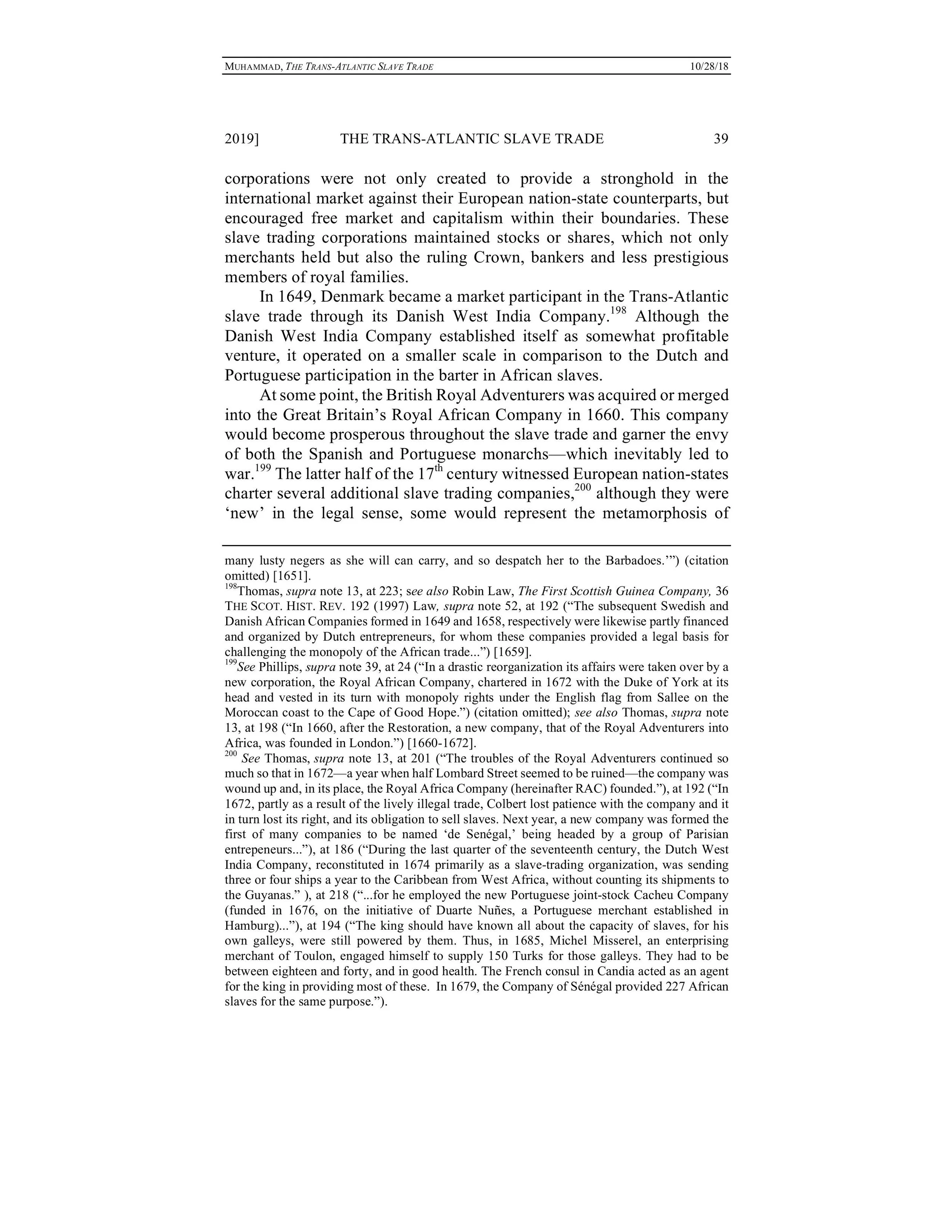
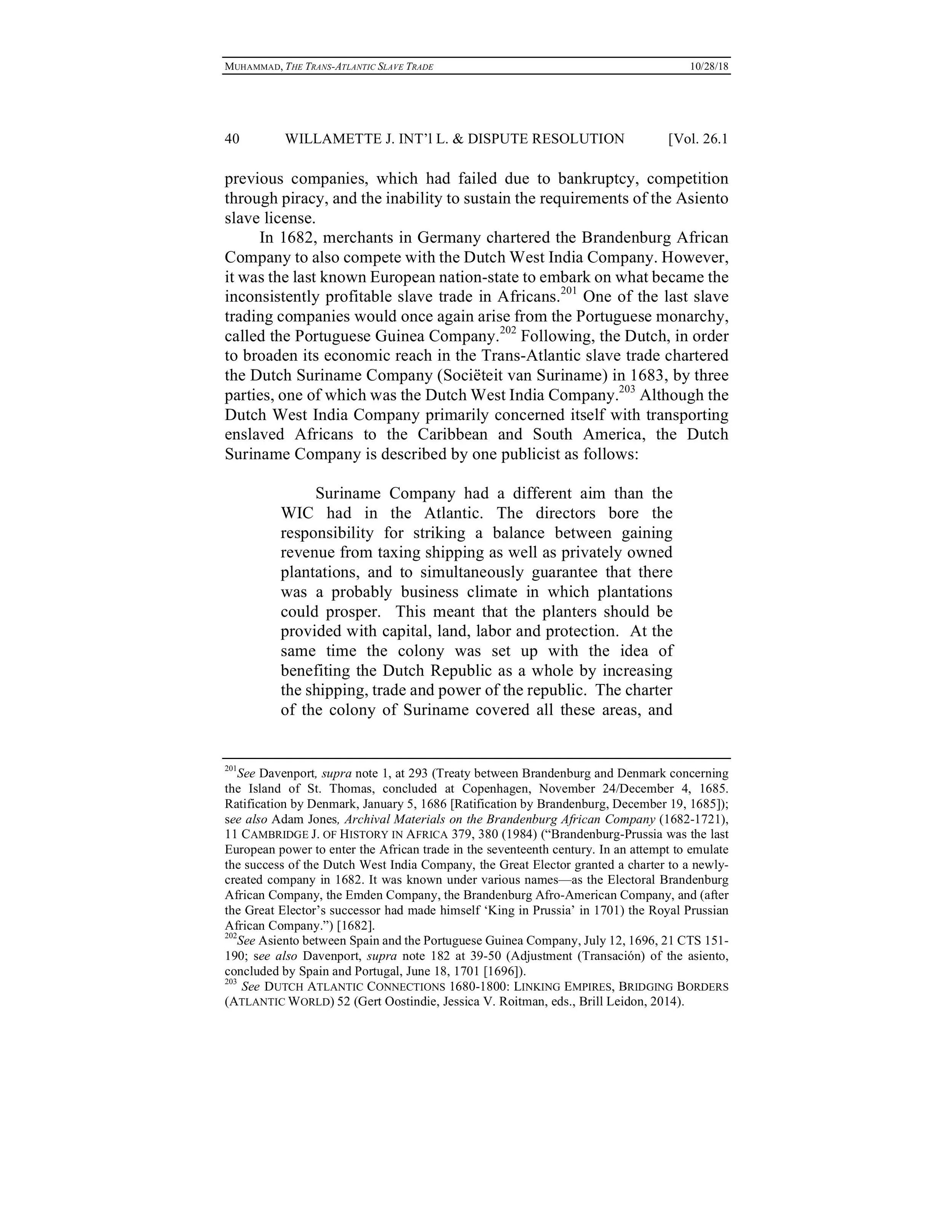
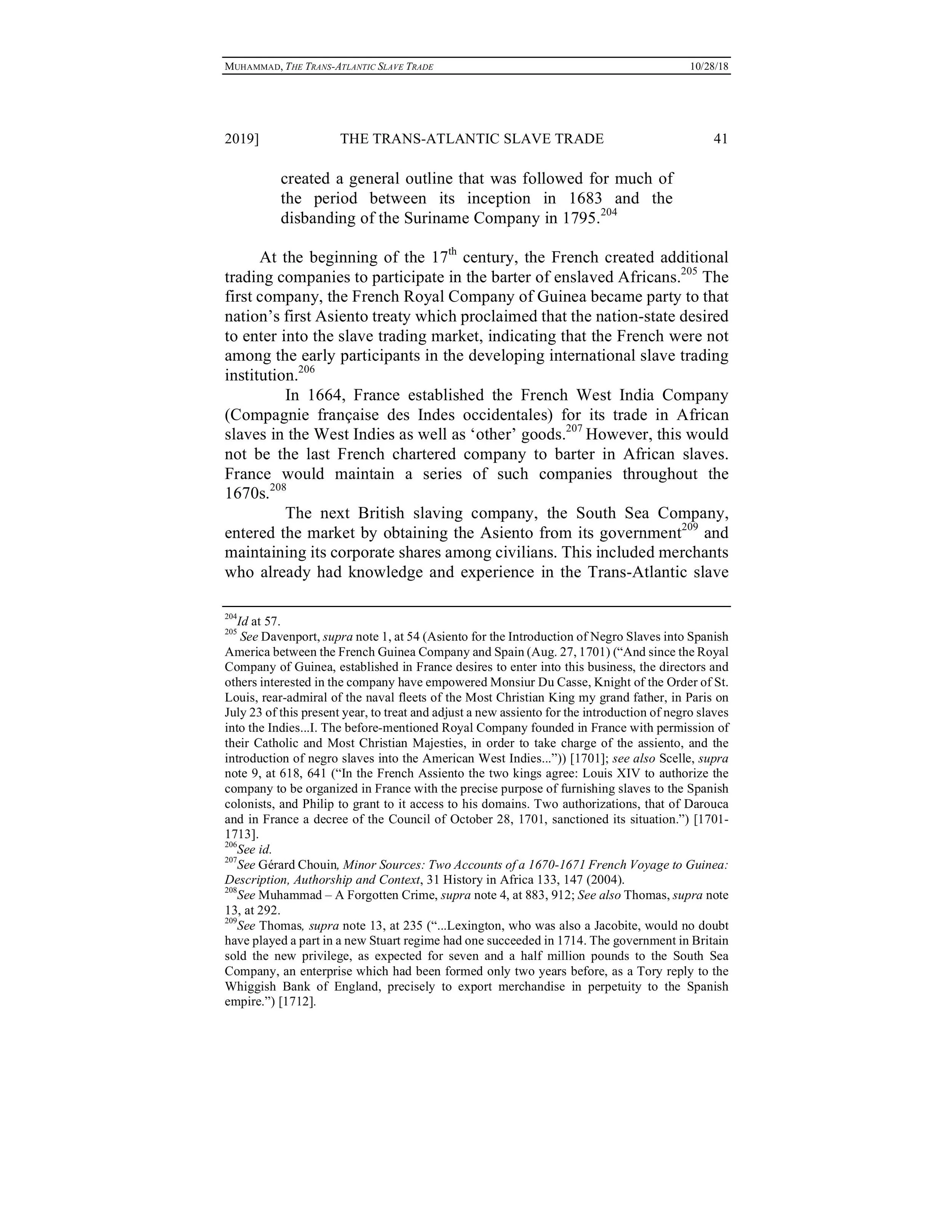

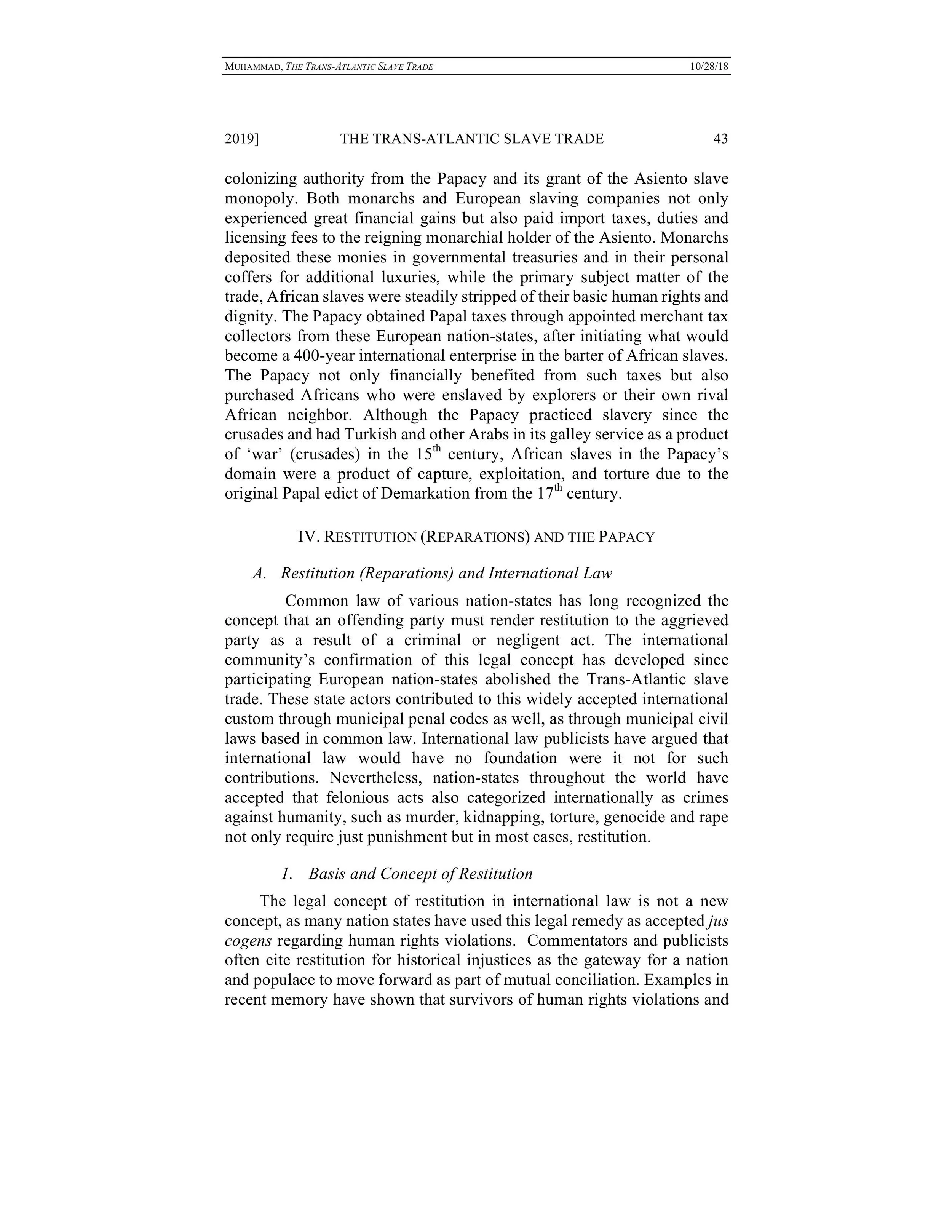
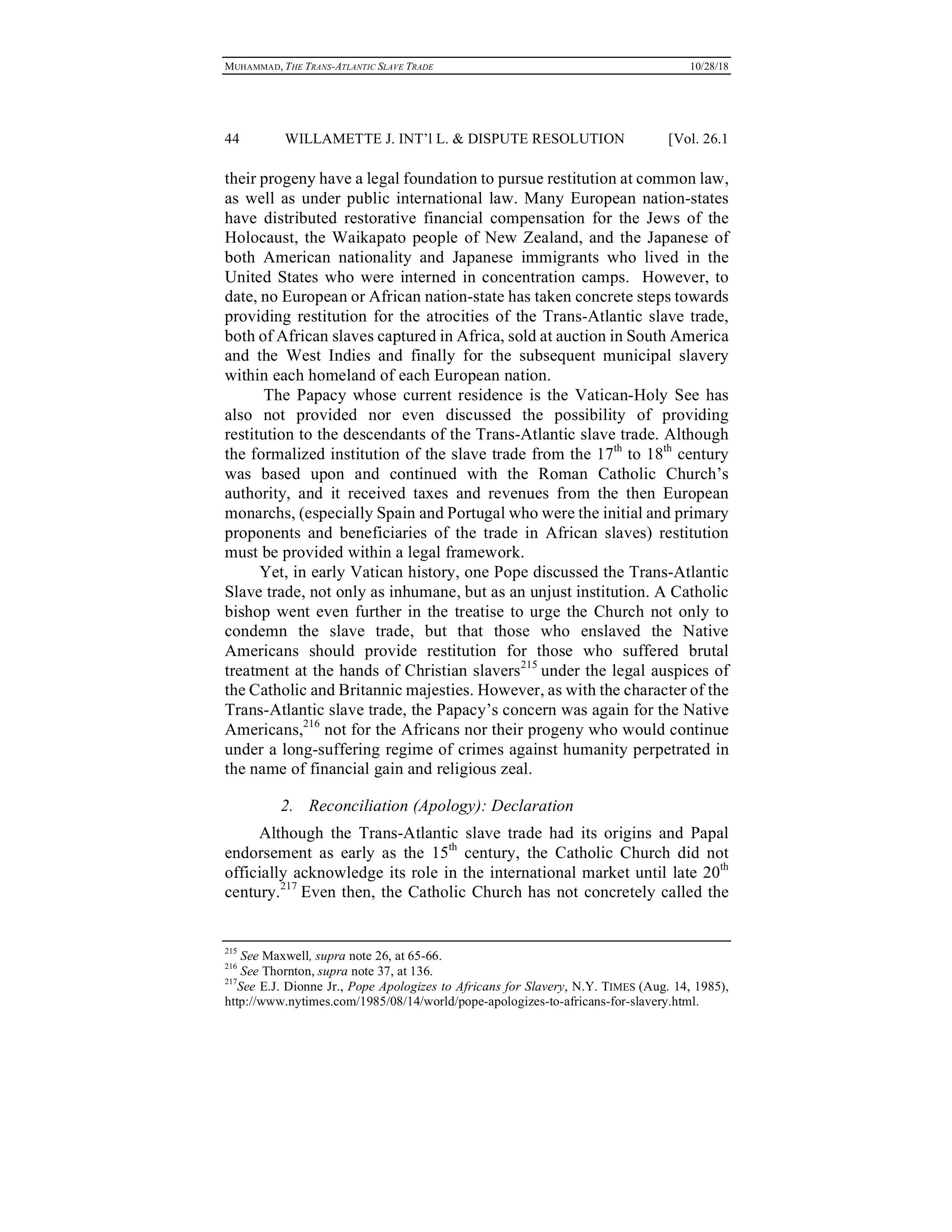
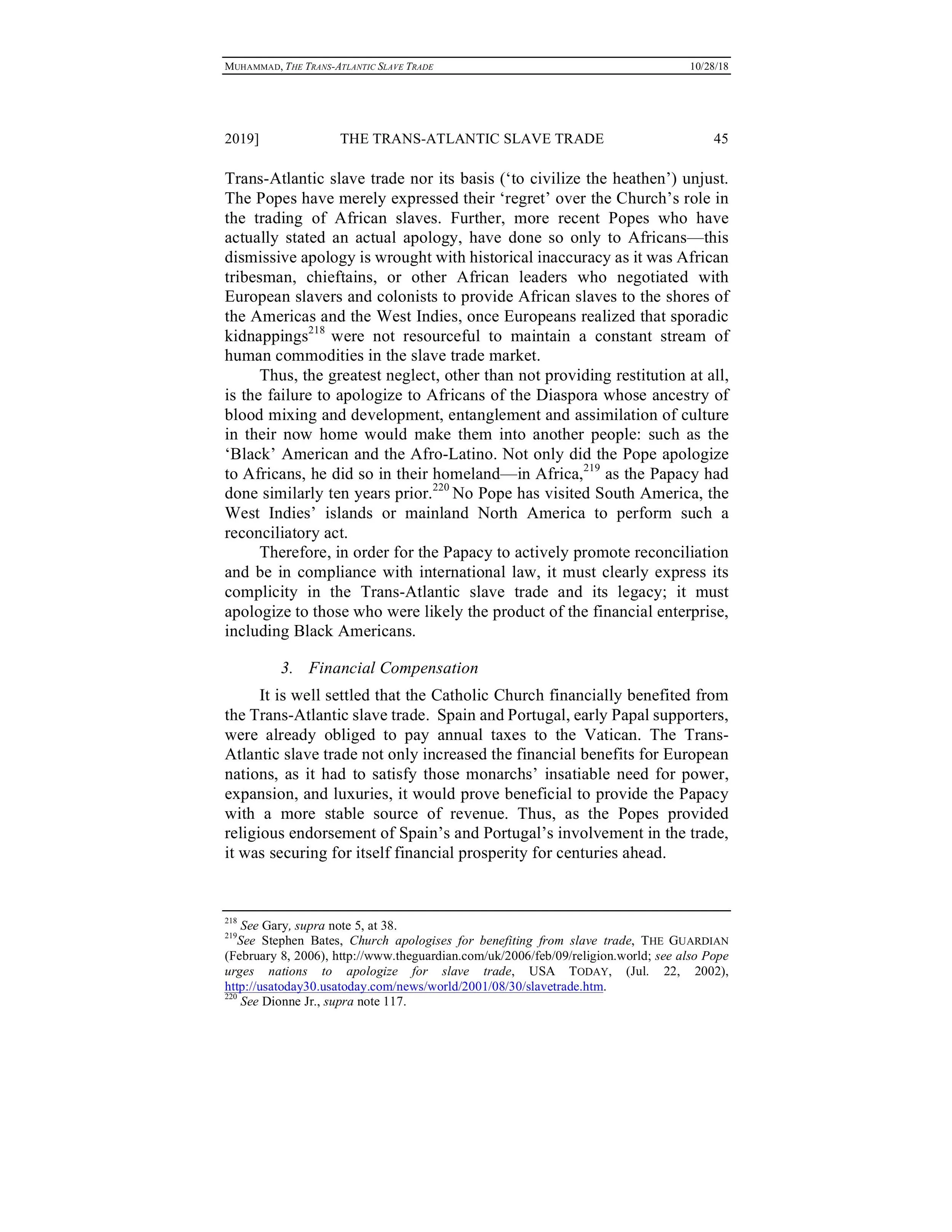
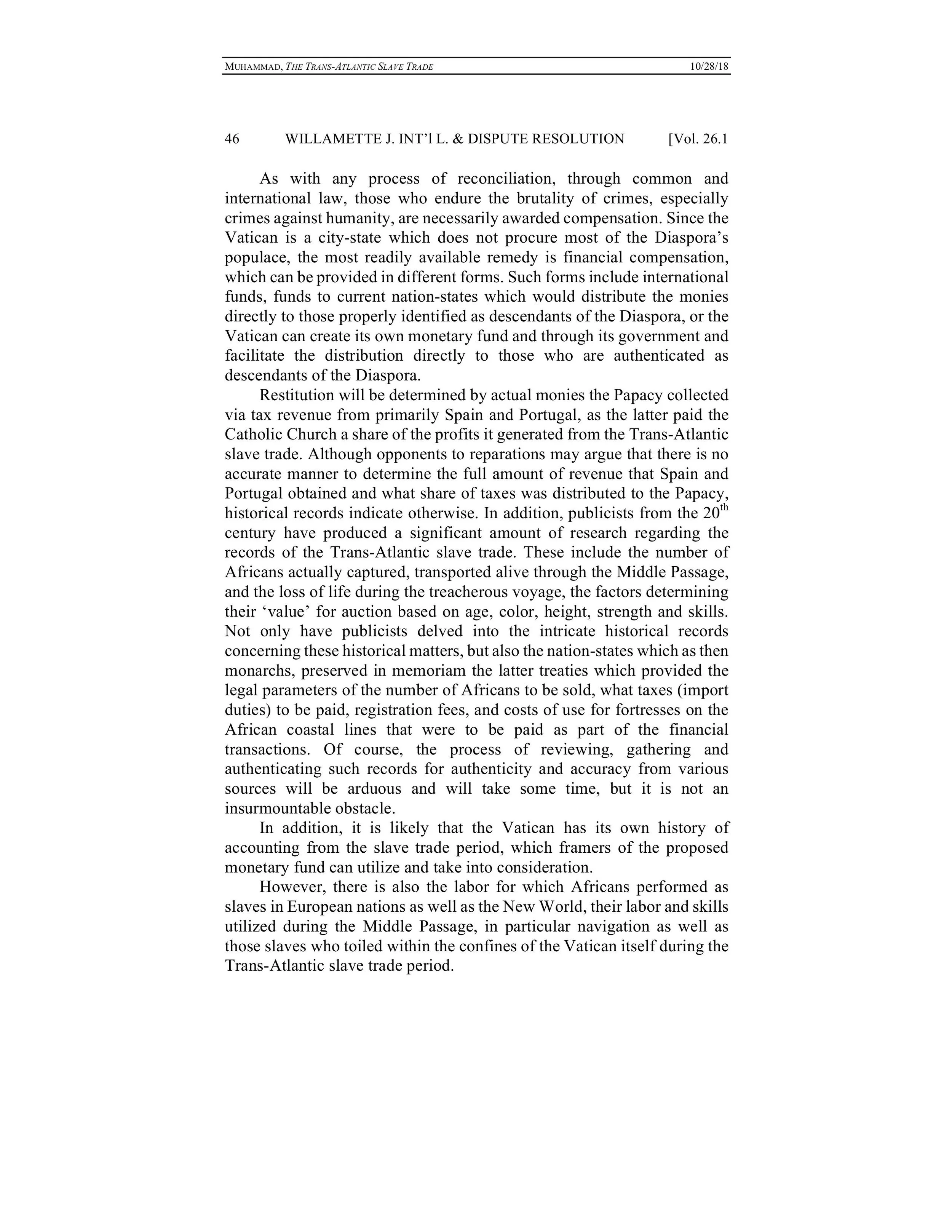
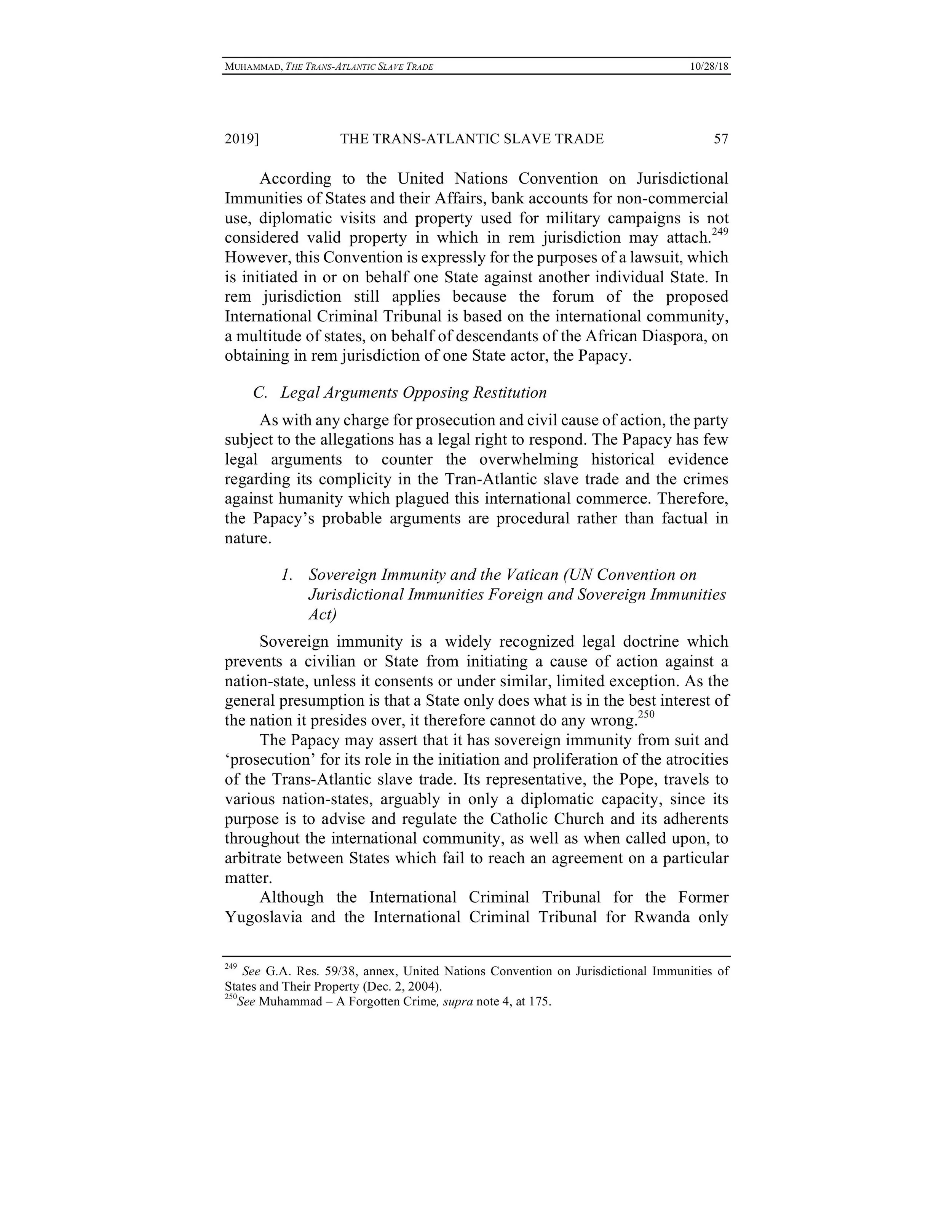
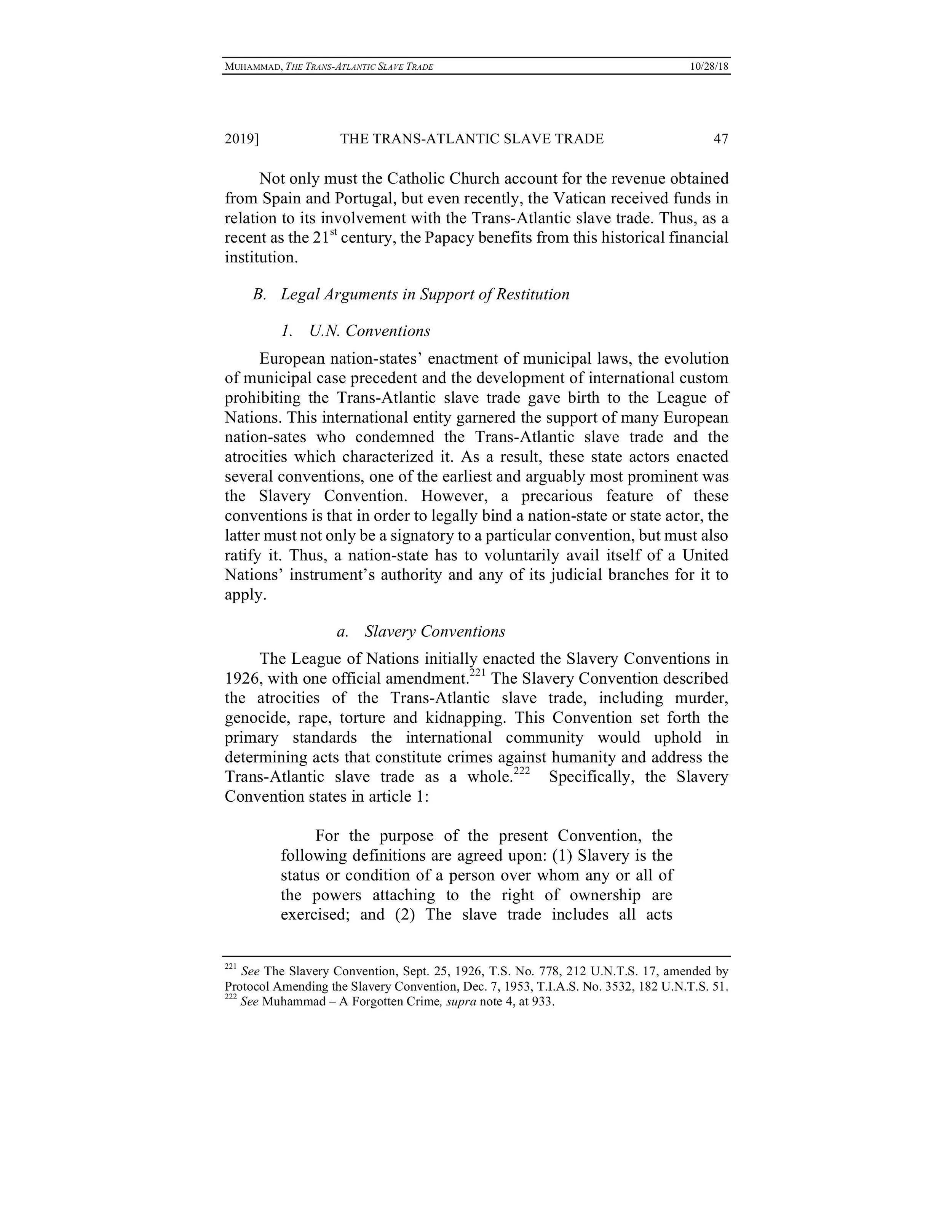
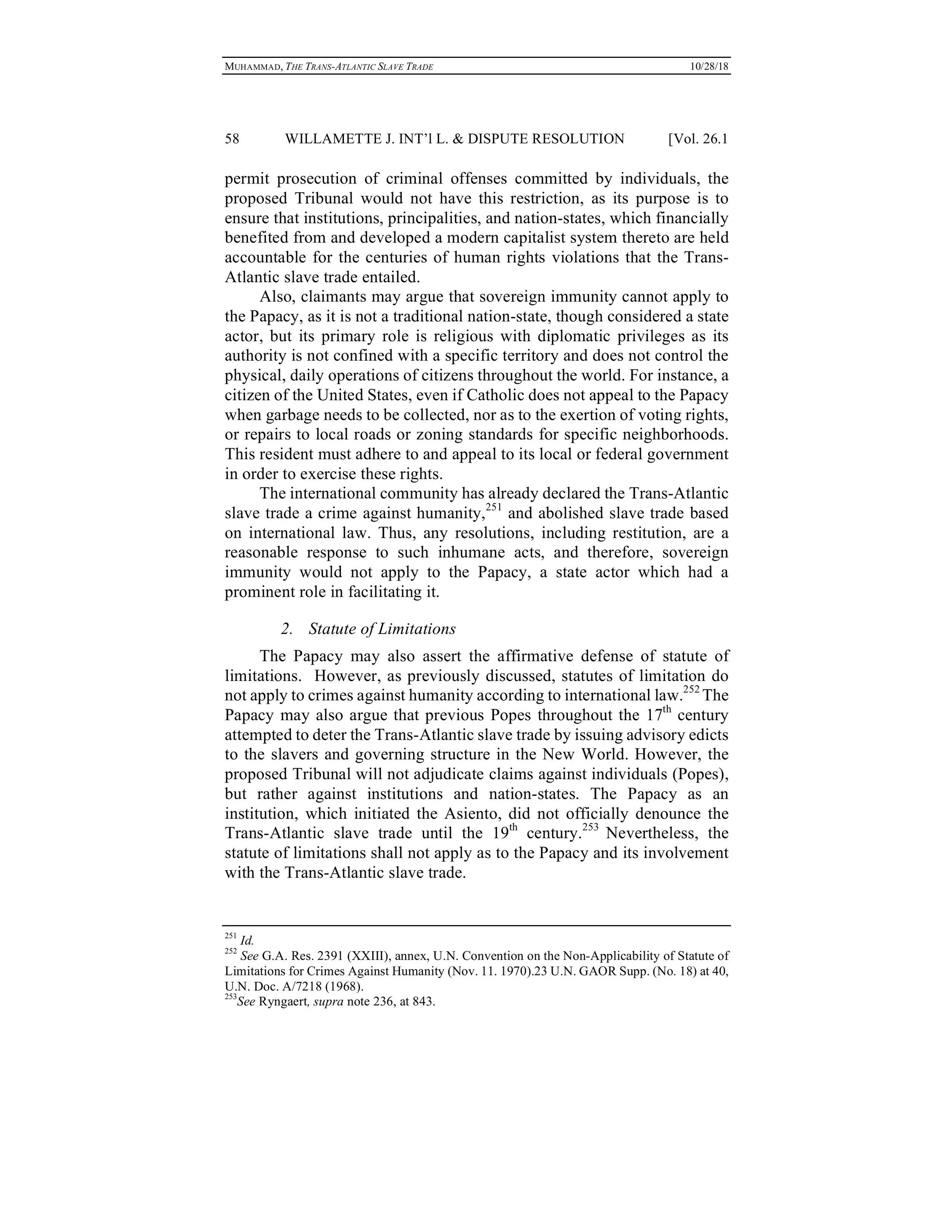
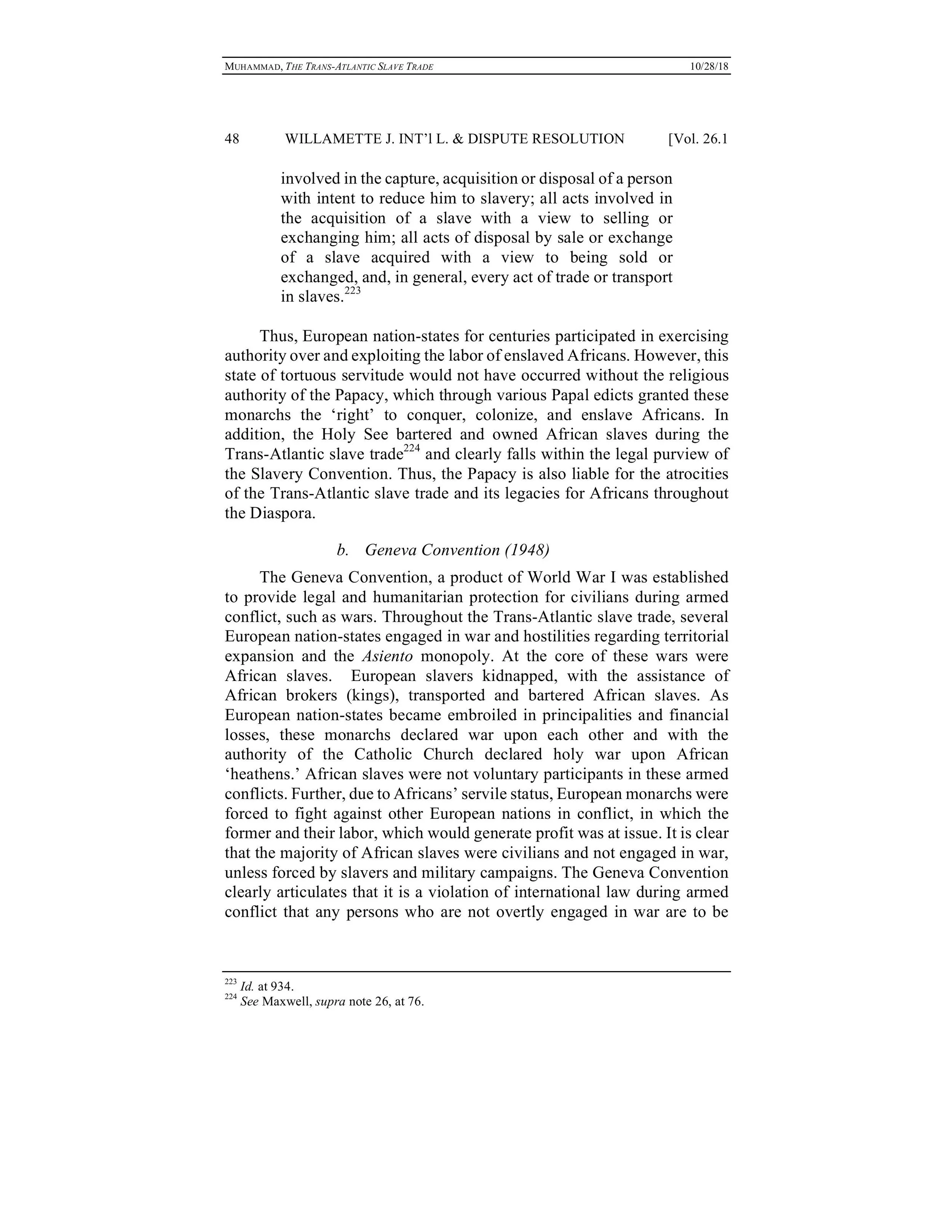
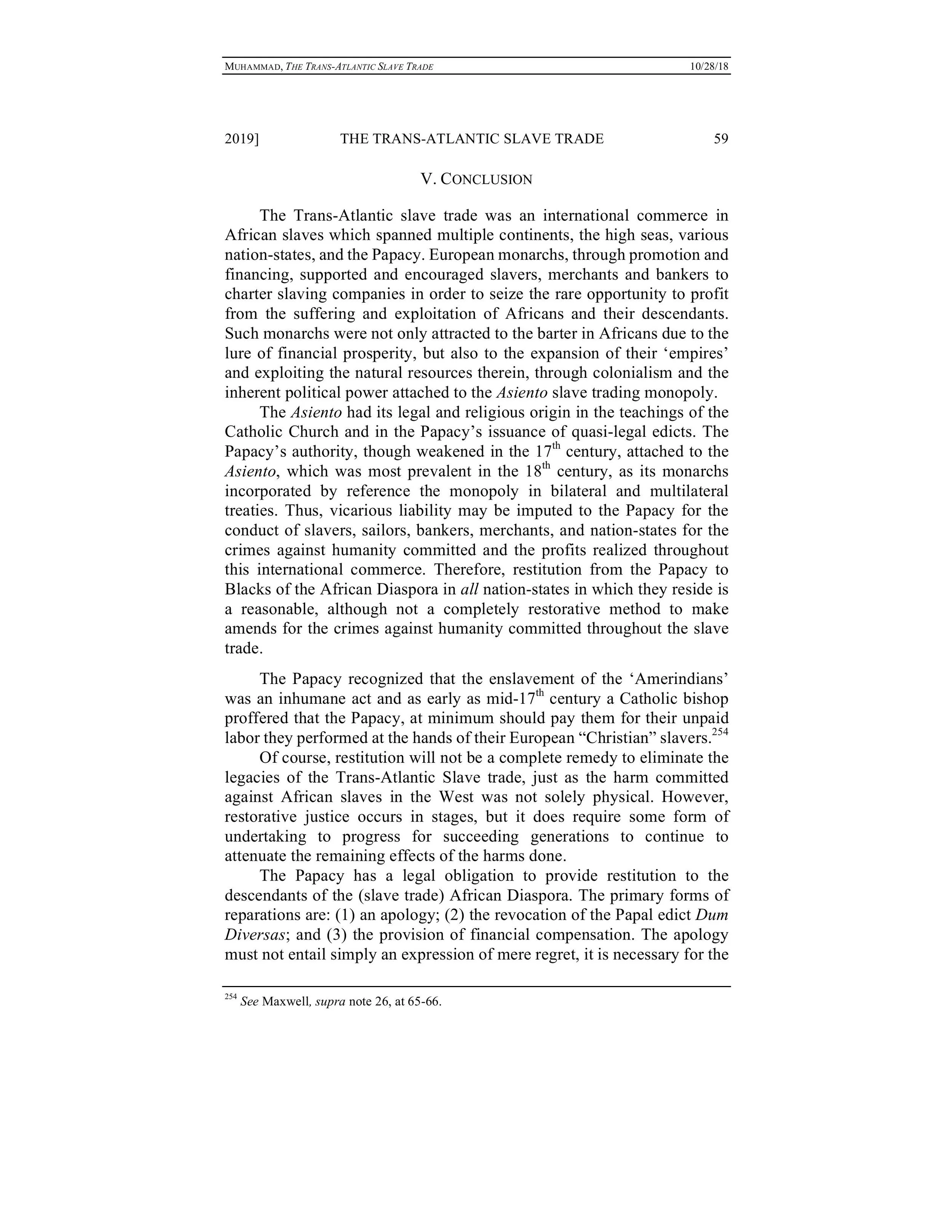
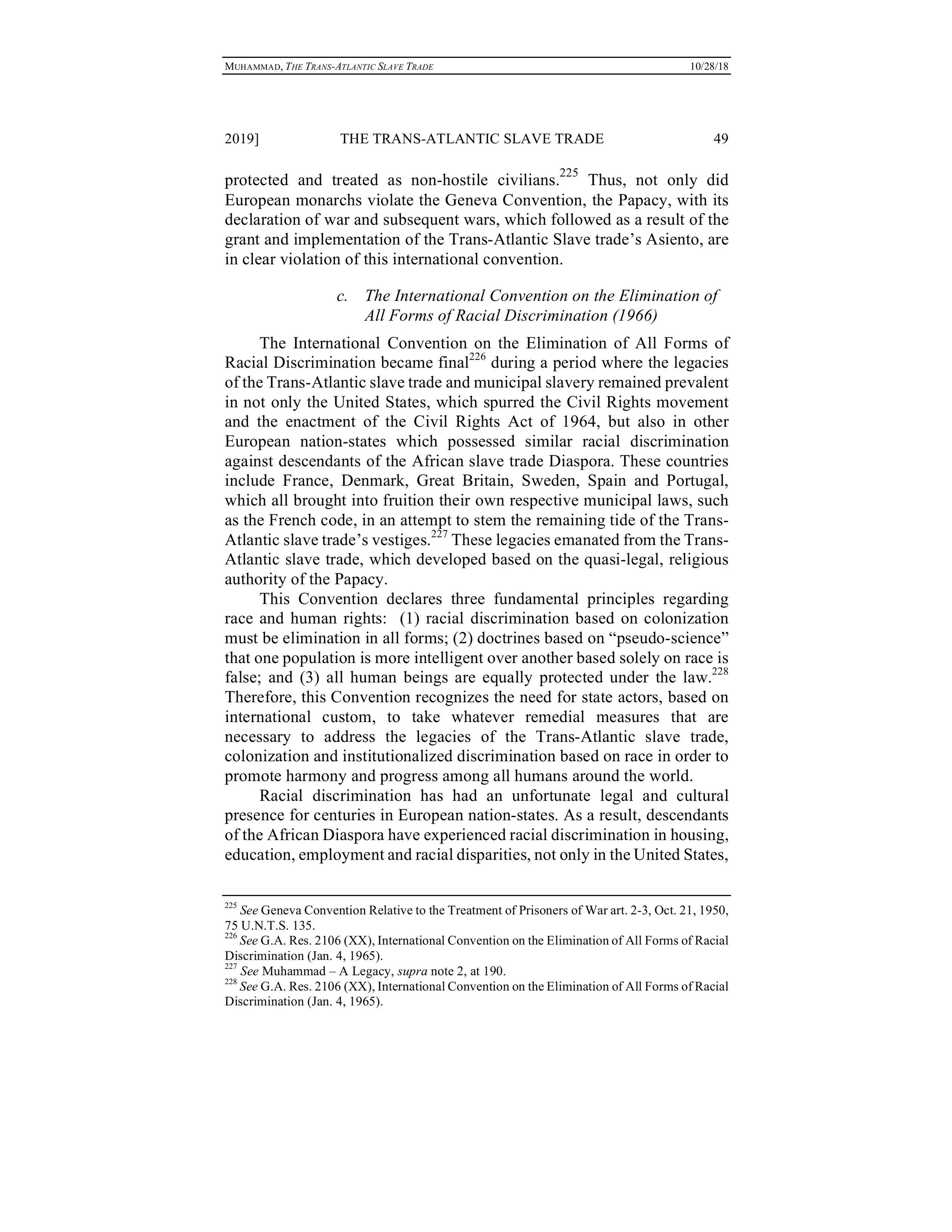
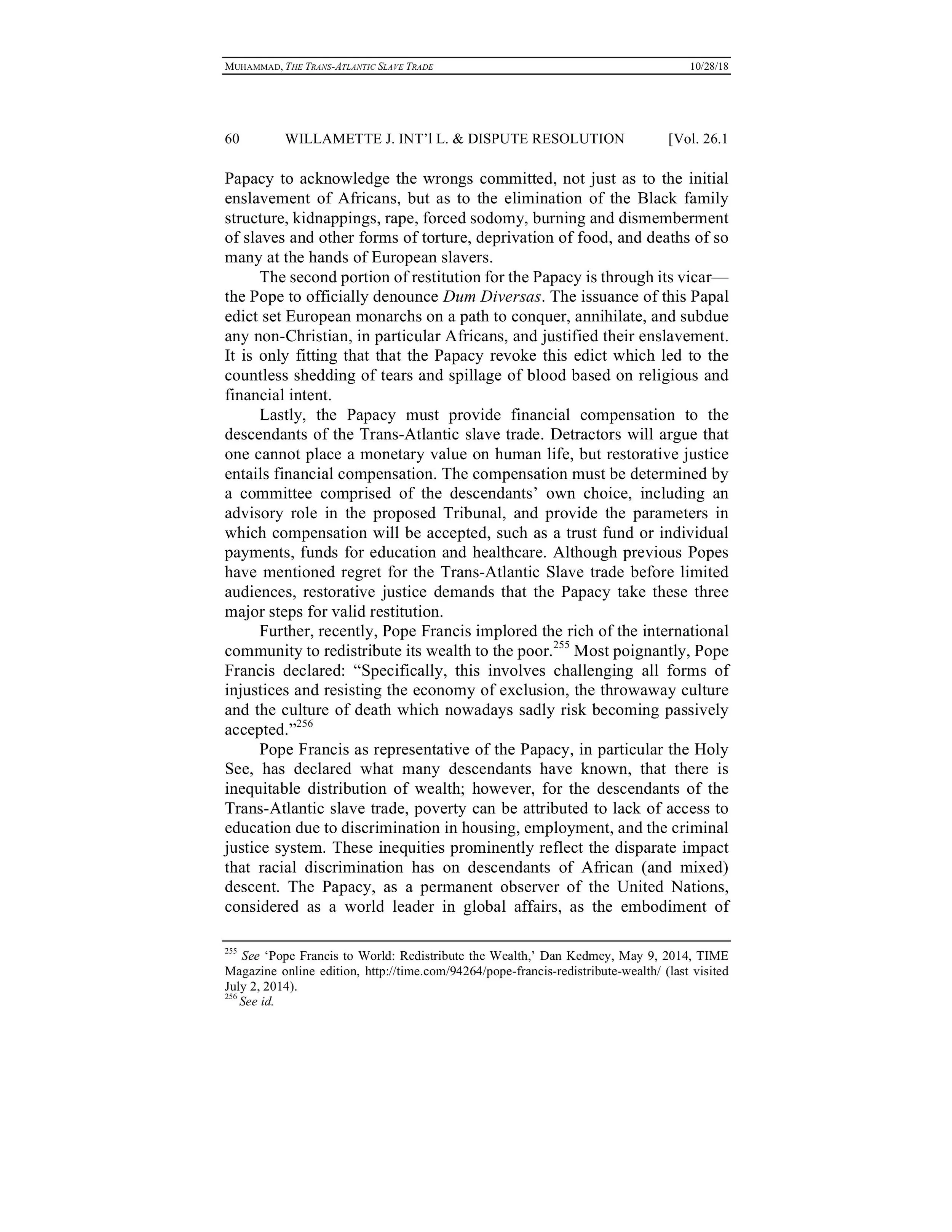
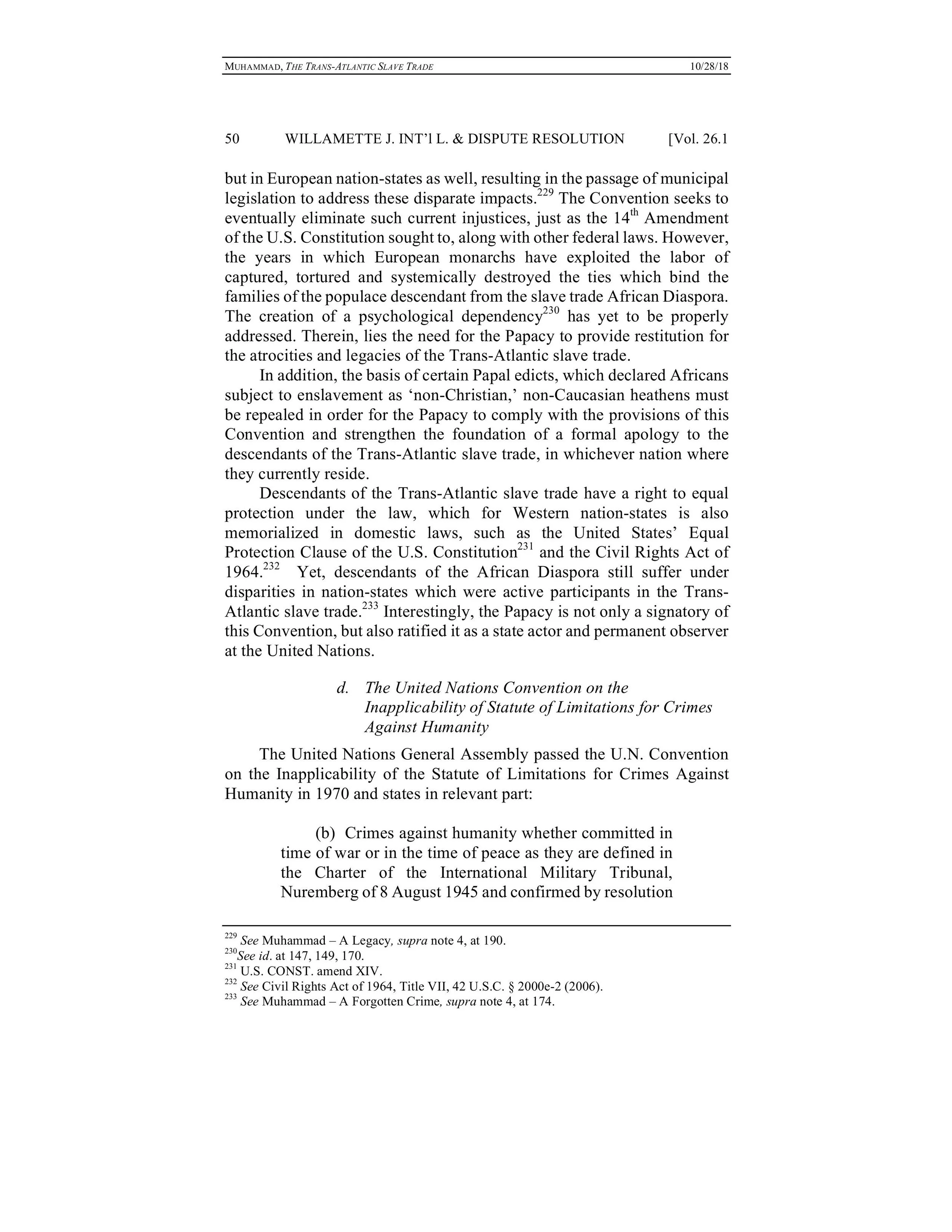

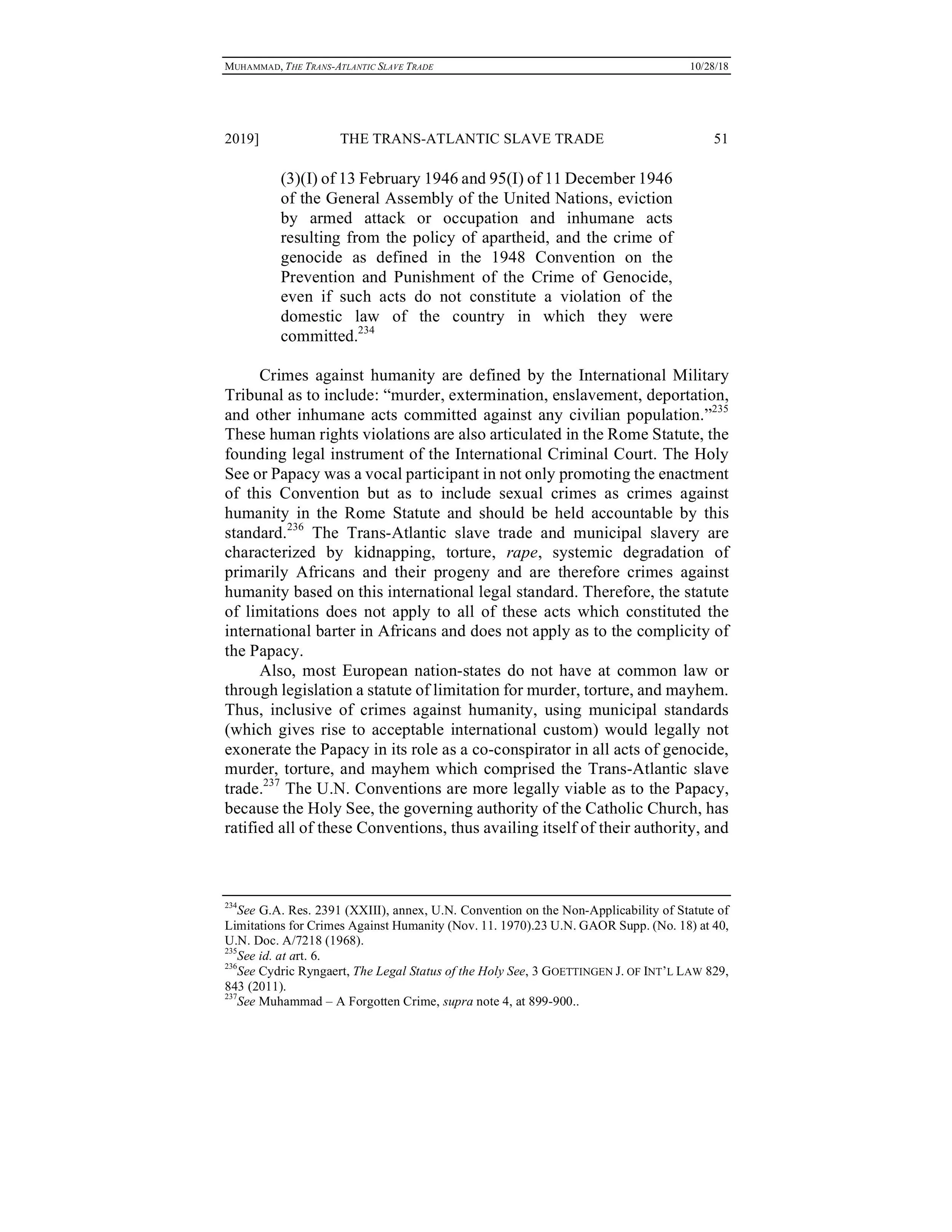

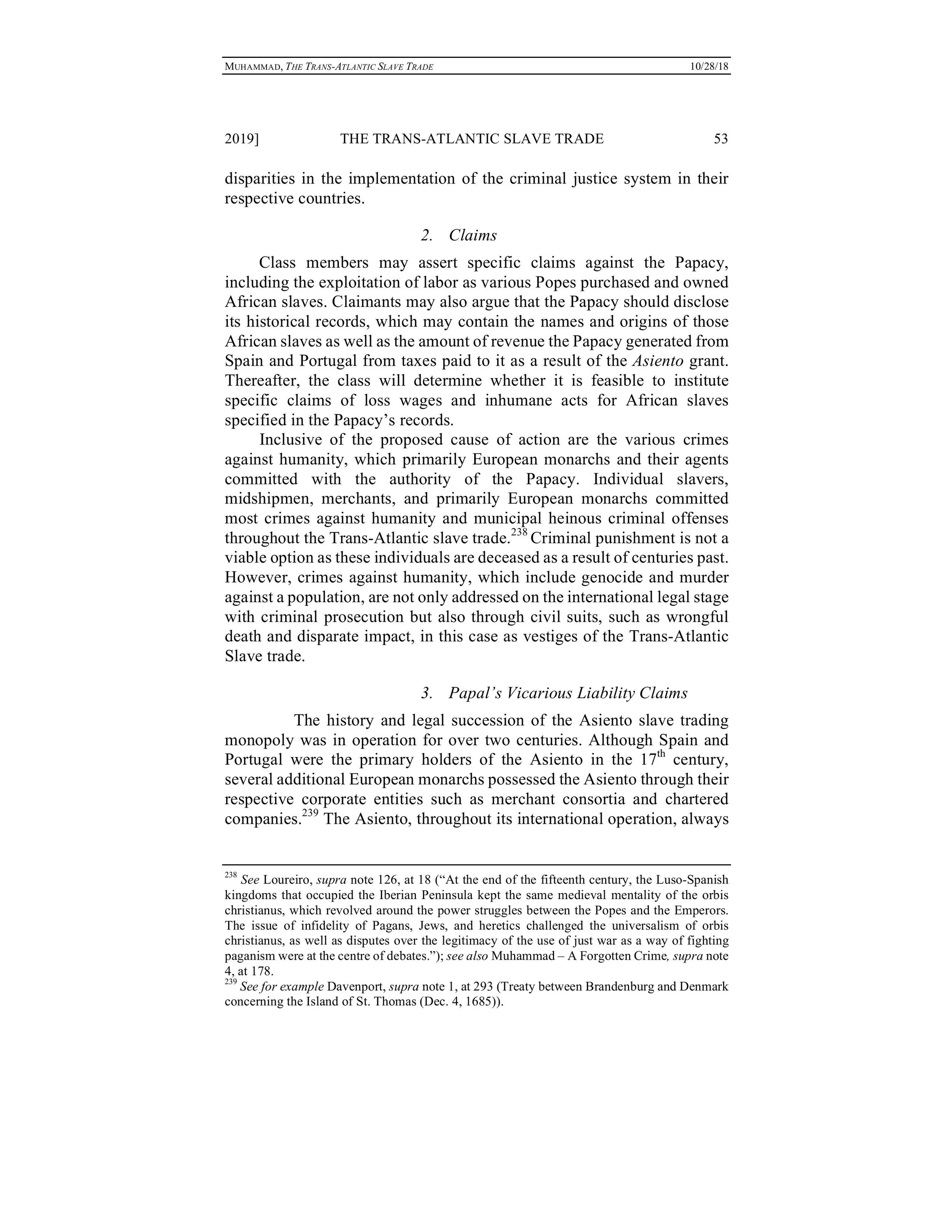
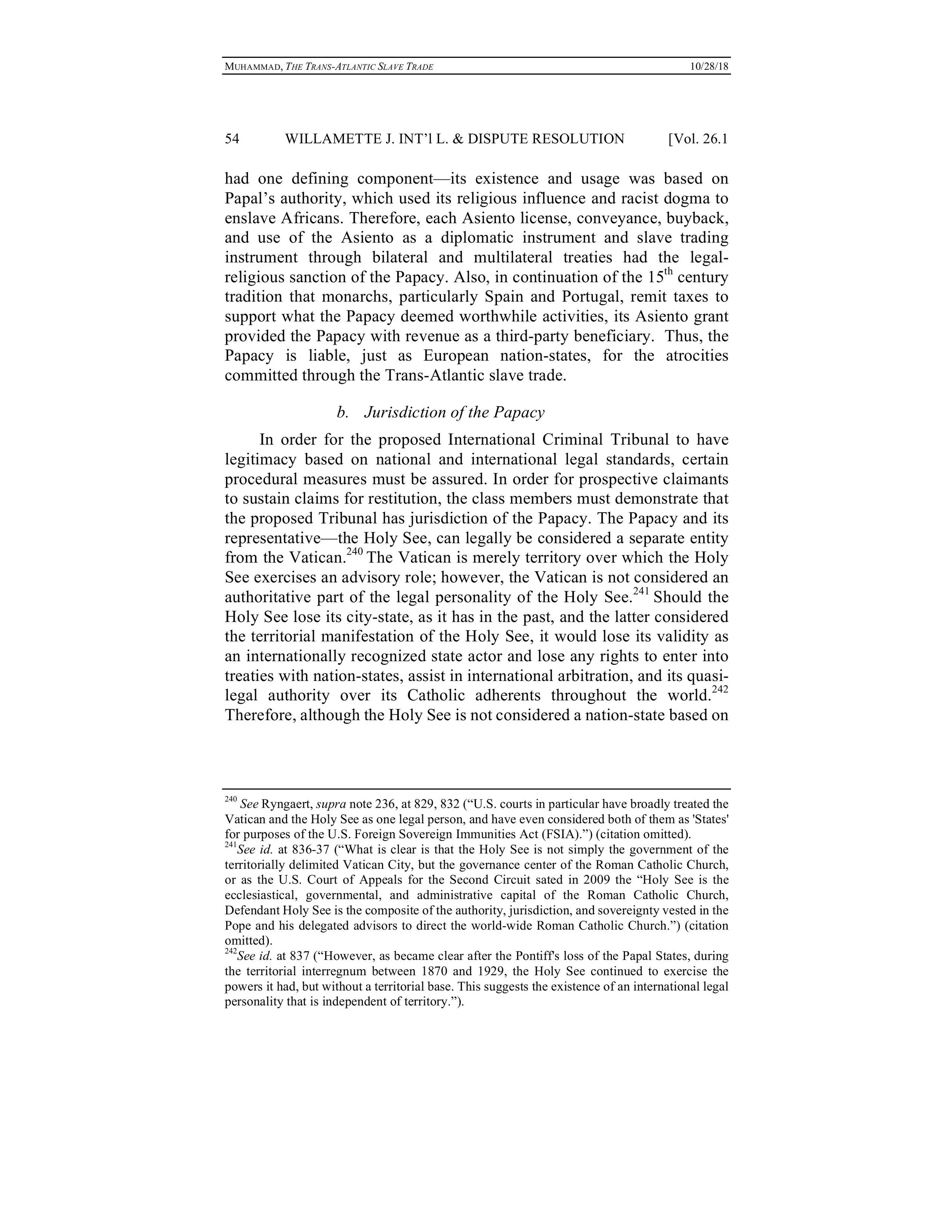
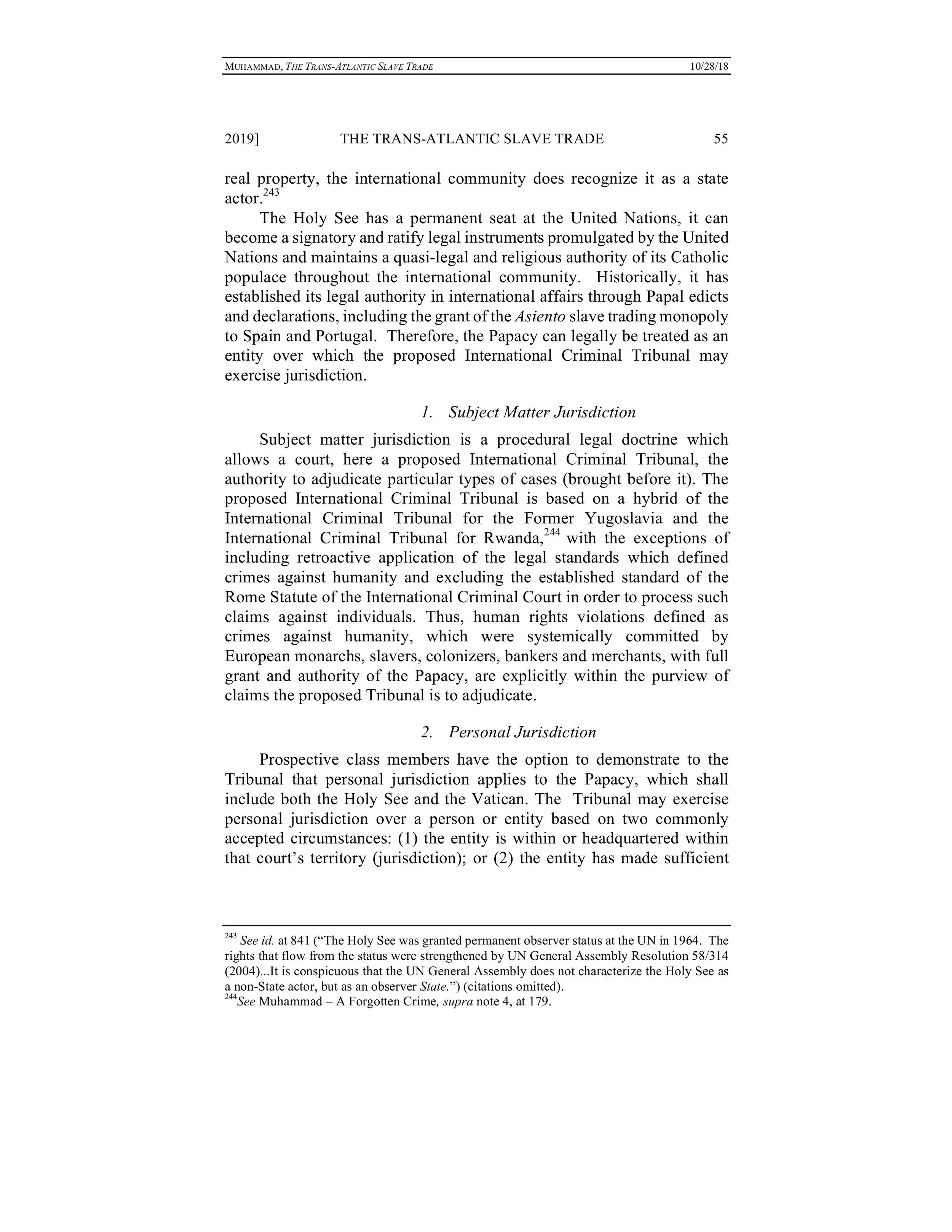
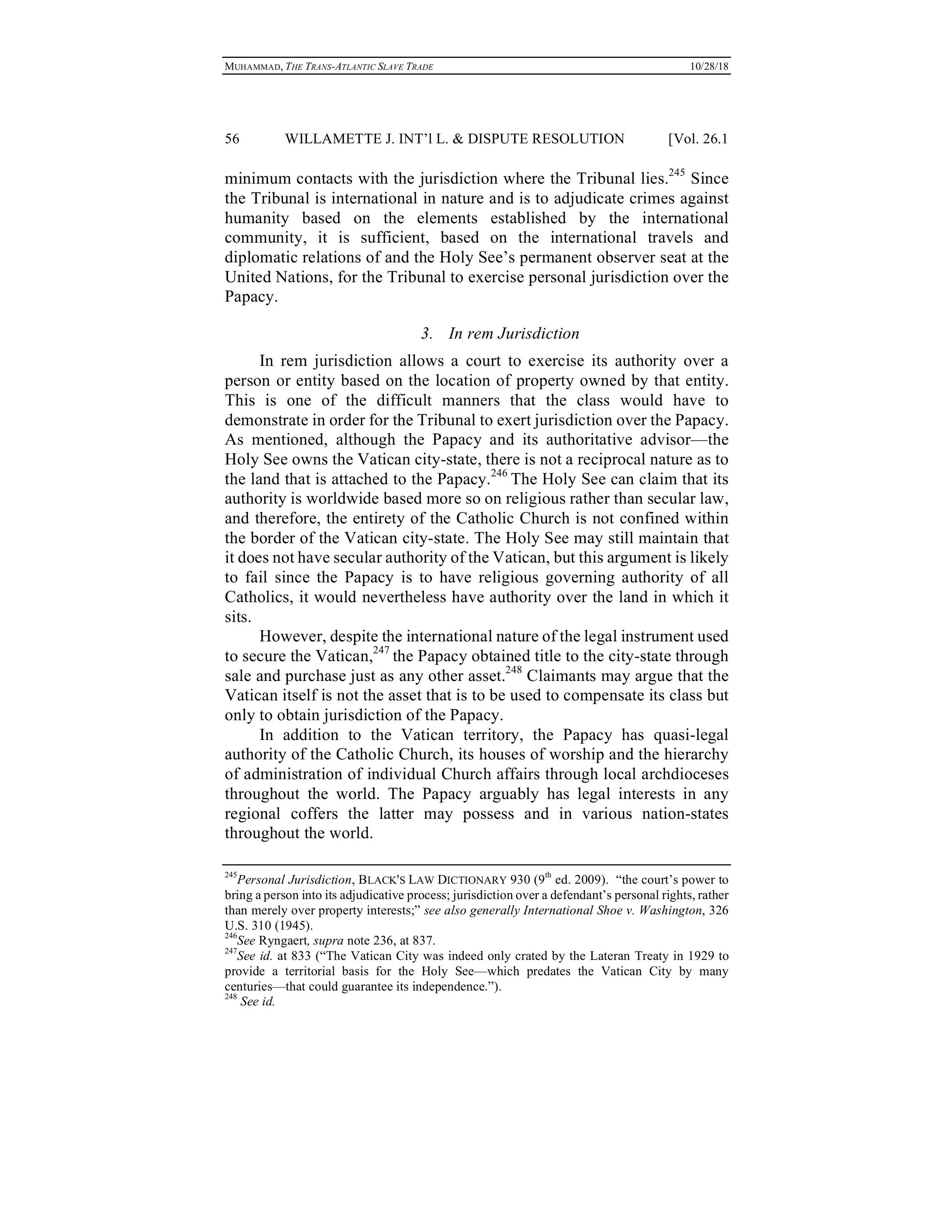
THE TRANS-ATLANTIC SLAVE TRADE: EUROPEAN SLAVING CORPORATIONS, THE PAPACY AND THE ISSUE OF REPARATIONS
I. INTRODUCTION (ORIGINS OF THE ASIENTO)
II. LEGAL SUCCESSION OF THE ASIENTO
Consider these excerpts from the above:
In earlier explorations, the then Queen Isabella, her Catholic Majesty, had declared that because natives of the ‘New World’ were now under the auspices of her rule, they were to be treated as her subjects. However, she was quite willing, based on confirmed Papal authority, to exterminate those under Spain’s forced rule who did not comply with the newly religious precepts. Whether for political or religious gain, the Catholic Church memorialized a more lenient sentiment towards Native Americans, sparing them the overall degrading effects of systemic slavery in the West, while their African contemporaries would continue to be frowned upon with disdain primarily for being of African origin. This, along with Native Americans’ milder physical features and lack of strength to endure a life as plantation slaves, would soon reverberate decades later to the detriment of African natives. It was this pivotal point in modern antiquity where Africans would become the sole source of forced labor and would endure centuries of brutality, massacre and human rights violations under the guise of economic practicality and religious prosperity. The Spanish kingdom provided respite for the lighter-skinned Native Americans, yet conflicting doctrine by the Catholic Church would determine that both they and Africans were to be enslaved should they refuse to accept Christian beliefs. As the trade license in slaves existed prior to the clearly delineated source of human commodities, it is here where the grant became formally known as the Asiento de Negros.
At the time, Spain and Portugal were separate monarchs, which would later revert to a joint nation-state two additional times between the 17th and 18th centuries, and shift the power of the Asiento to Spain as the primary holder. Although Charles V granted the Asiento to Goumonet, he could not legally obtain slaves from West Africa. The Treaty of Tordesillas had already partitioned the area exclusively for Portugal’s domain. During the 13th -14th centuries, the Berbers of the Mali and Songhai empires sold African slaves to the Portuguese. Since the Asiento’s source was limited only to African labor, Goumenot had to secure slaves from the Portuguese and then transport them to the Americas. He eventually sold his assets to Genoese traders in 1538.
As the Castillian, Arragonese and Portuguese monarchs already garnered Catholic authority, their need for Papal validation of the TransAtlantic slave trade continued to prosper. Under King Phillip’s rule, successor to Charles V, fiscal complications worsened due to his increased desire for luxuries and the accession of Portugal into the Roman Empire. Although African slaves were a financial avenue to remedy King Phillip’s financial malfeasance, it was the continued tradition of denigrating the humanness of the African, as well as creating and exploiting religious dogma that was required to maintain the slave trade.The trade in human commodities simply increased the Crown’s revenue to support soldiers ordered into war in the name of the Catholic Crown or His Majesty, a phrase that would be used in official treaties that incorporated the Asiento license by reference during the 18th century.
Traditionally, the Crown’s grant of the Asiento provided a group of merchants and slavers, usually supported by a commercial company or the Crown itself, with the legal right to explore the West Indies. As a result, the asientists would pay licensing fees, tariffs, such as export taxes to the Crown, as well as any fees and duties to the governor, slavers or other participants to facilitate the transport and selling of slaves. Although European Crowns maintained the monopoly of the Asiento during the early period, they granted licenses and sometimes permitted sublicenses to certain merchants in order to ensure their profits in the international trade of African natives.
The Asiento remained an integral part of the Western European regime, as well as of the New World. Not only did the Catholic Church have the originating, proclaimed authority to grant the Asiento to the two competing monarchs of the Trans-Atlantic slave trade, that is Portugal and Spain, but the Papacy also generated income for Portugal through taxes it obtained with the jurisdiction of the Holy See during the 16th through 17th centuries.
Meanwhile, the Pontiff’s advisors issued support, which reiterated previous Papal bulls regarding the legitimacy of the slave trade in Africans. The Vatican had an unlikely spirited and religious advisor under its commission; an African, and likely a former slave, by the name of Lorenzo de Silva de Mendoza. As the Papacy already solidified its authority as to religious and international legal affairs, its influence in systematizing the Trans-Atlantic slave trade through 17th century Papal grants vested in the closest religious and political allies, Spain and Portugal, is astounding. De Silva requested that Pope Innocent excommunicate any slavers or slave traders who captured, sold and resold African Christians. This premise is diametrically opposed to the earlier Pope’s grant to enslave Africans and transport them to the West Indies regardless of whether they converted to Catholic Christians, because as European rulers concluded, Africans were deemed heretics and not worthy of freedom and naturally characterized as animals. Thus, Africans from the West and North Africa were already forced to convert to Catholicism, then faced a lifetime of misery (through slave trading, and forced military service) as a by-product of converting to Catholicism, a specific form of modern Christianity.
As the Papacy’s proclaimed vested interest was to propagate Catholicism to heathens, it never declared during the development and apex of the triangular trade itself, inhumane. Nor did it declare any acts, such as the separation of African families through capture, the mental and social abuses or their long-term impact, the branding, the lack of adequate food and proper hygiene, and the shelter deprivation through force as violation of human rights, as violations of natural law or religious principles. As a result of these informal Papal decrees, no kind of economic sanctions were implemented, nor was any slave trading market participant, whether government or individual, found guilty or liable of such egregious acts, nor did they endure any type of negative consequences from their respective Crowns or from the Vatican itself.
As a result, the Cardinals from the Holy Office/Vatican, though not explicitly acting on the behalf of Pope Innocent, advised the latter’s ambassadors in Europe to relay the Vatican’s concern that African slaves should not be physically abused. The Vatican and the vicar continued to obtain taxes from the Asiento’s primary Catholic beneficiaries, that is, Spain and Portugal. . . . These released pronouncements were superficial, with an advisory impact containing no legal or economic injunctions should the participants fail to adhere to them. The lack of consequences, however, was not a result of the lack of power the Papacy possessed. It had the foresight not to destroy the institution of slavery nor the quasi-legal instrument, which solidified its proliferation, because the Papacy benefited from it. Thus, the Holy Office entrenched itself on both sides of the slave trade, with advisory declarations that the poor treatment of slavers was prohibited, while failing to denounce the institution of slave trading; slavery itself. As a result, the Trans-Atlantic slave trade would continue to flourish for nearly two additional centuries through the Asiento, which would in later agreements be formalized through incorporation by reference in international treaties.
Although these international treaties are rife with financial expectations, legal rights and obligations of those party to the agreement, the Asiento and its originating religious authority, as vested in the Vatican, is notably demonstrated by religious titles and governmental authority of the respective nation states. For instance, in the ‘Adjustment (Transación) of the Asiento, concluded by Spain and Portugal at Lisbon,’ June 18, 1701, N.S. Ratification by Spain in July 1, 1701. . . . It is clear that this treaty incorporated the Asiento by reference, as well as several succeeding Asiento treaties have taken great care to emphasize their legal authority to trade in African slaves by not only their religious affiliation (Christianity) but also by their respective kingdoms’ allegiance and reciprocal award of the Papal grant. Thus, Papal authority ran with these international agreements not by implication but by express acknowledgment. . . .
As with the prior Asientos, this treaty continuously refers to Spain as her Catholic Majesty and also emphasized the requirements that certain heirs, such as merchants and midshipmen must not in any way offend Roman Catholics in order to participate and profit form the Trans-Atlantic slave trade. This clause specifically differs from the Asiento of 1701, which required slavers and merchants under hire to be Roman Catholics, whereas this treaty merely requires such hires to conduct themselves in a manner which is in compliance with the Roman Catholic Church, which is Spain’s national religion or be admonished and subject to the criminal laws of the Spanish Crown. Ironically, for nation-states to be in accordance with the mores and laws of Roman Catholicism and the then influential monarch of Spain, which was a primary purveyor of such religious canons, slave trading participants were, to a great extent, performing their Christian duty by subjecting Africans, whether Christian or not to a lifetime of branding, slavery, rape, kidnapping and torture as participants reduced African slaves’ humanity to commodities for transport and auction. These nationstates, slaving companies, slavers, bankers, and merchants deemed Africans as worthy of human rights violations, and by Papal declaration, subject to enslavement. To further these notions, cloaked with policy-oriented, religious doctrine, parties to treaties which incorporated by reference the Asiento, elucidated their diminishment of Africans as mere ‘negroes,’ and in the appositive even less than slaves but as ‘piezas de India.’
As commodities are beaten, physically and mentally abused or otherwise mishandled, they lose value due to the loss of the original integrity of the product. At times, these goods are discounted for quick sale or otherwise deemed an unsellable commodity. As a result, these goods are written off as a financial liability or loss for auditing and tax purposes. The same fate awaited African lives captured and forced into the Trans-Atlantic slave trade. Parties to this treaty made it apparent that Africans were to be stripped of their familial and cultural identity as referenced in this and earlier Asiento agreements. The assientists, at times, referred to Africans simply as black slaves. Just as the Papacy systemically used the Catholic religion as the catalyst and justification to enslave others, it also used the term ‘black slaves’ to further demean, racially stigmatized, emasculate, defeminize, anonymize and objectify human beings with African heritage and their progeny. As with all other previous Asiento agreements, Spain exhorted its right to convey the slave trading license to whom it chose through the authority it obtained from the Papacy. Although the Asiento evolved into an official contracting instrument, the Spanish Crown eluded exclusivity by issuing Asientos and treaties which either overlapped in time or shared a similar time frame for transporting African slaves but designating different portions for disembarkment and sale to different interested parties. Additional terms of the international agreement between Spain and Great Britain via the East India Company, specified that they could ship nearly 5,000 slaves annually, for up to 30 years.115 Thus, the maximum number of slaves to be validly captured and shipped could not exceed 144,000 for the duration of the Asiento contract.”
Thus, the most LOGICAL strategy that should be employed by the reparations movement, supported by the African Union, is to bring the Asiento contracts before the International Court of Justice (ICJ) and hold the Vatican accountable for the Dum Diversas total war damage that has already been determined at the World Conference Against Racism to be a crime against humanity which has no statute of limitations.
Why has this been delayed? Given my consistent, inetensive advocacy for this over the past four years, I can only conclude that it is by design since it has been shown by the climate justice activists that an ICJ opinion, which would be a prelude to an actual case, can be had when it is wanted. Clearly, the requests for an advisory opinion from the Court on “The status of Afro Descendant People as prisoners of war under the Geneva Convention and their right to conduct plebiscites for self-determination”, which has formally been submitted to the United Nations and the African Union, is not desired. Again, no AU Legal Reference Group or Committee of Experts on Reparations have been constituted and it is likely that those selected for such entities will be of the “climate justice” sort who are populating most of the panels and webinars now.
But Afrodescendants’ reparations claims are not without proper potential champions. The Republic of South Africa could do for Afrodescendants what they did for the Palestinian people in Gaza by brining a request for an advisory opinion from the ICJ. Likewise, tha Alliance of Sahel States could further demonstrate itself as THE Pan African leaders on the continent, eventually leading to a United African States and rendering the AU obsolete, by doing the same. The question remains:


